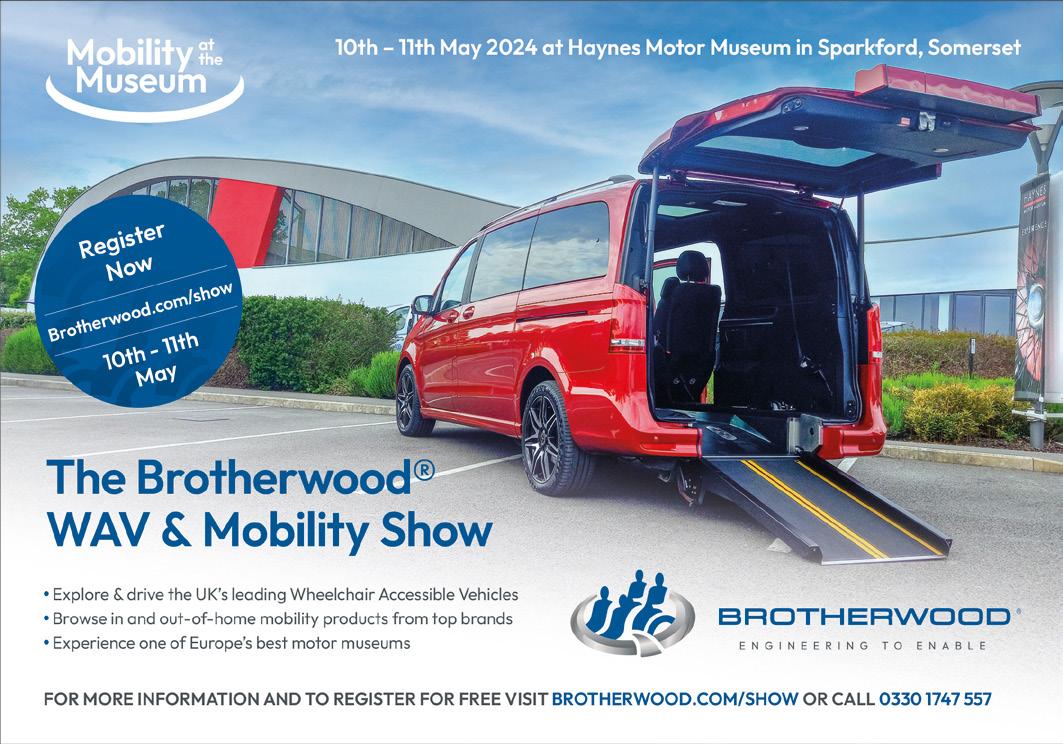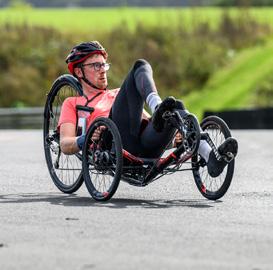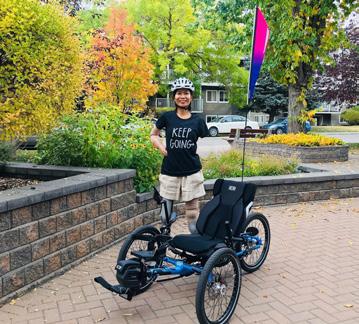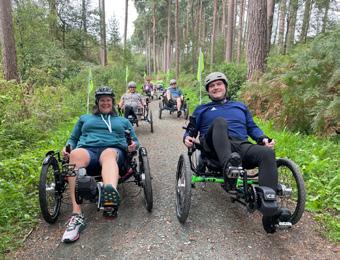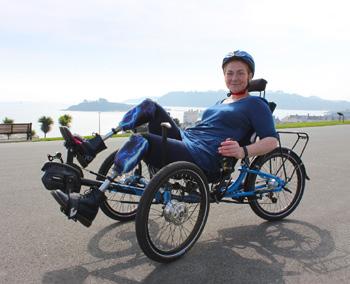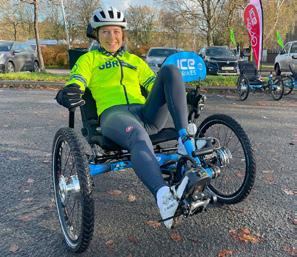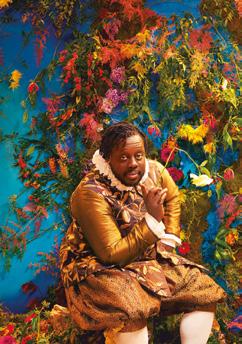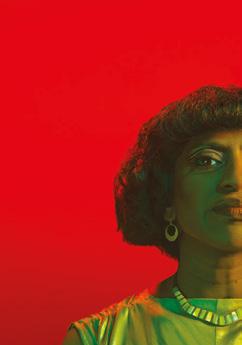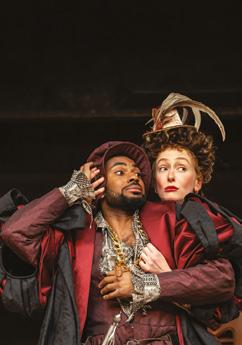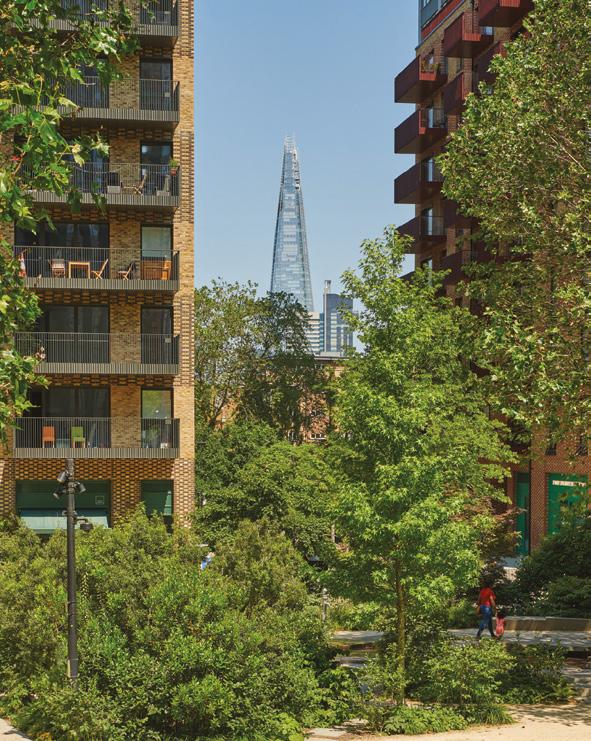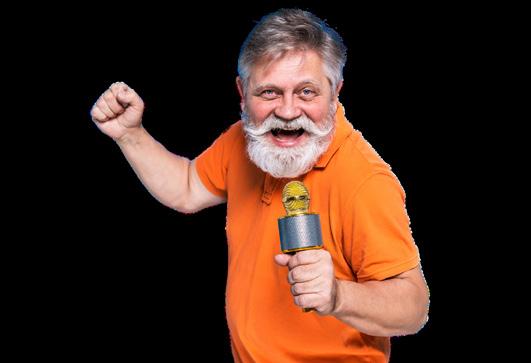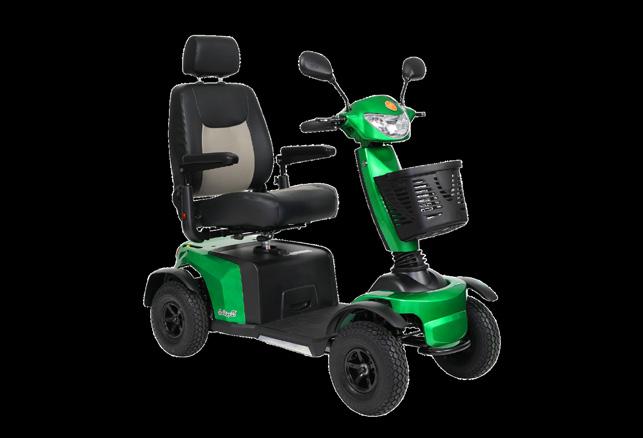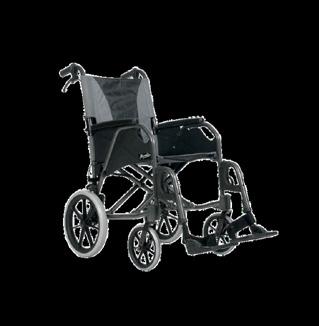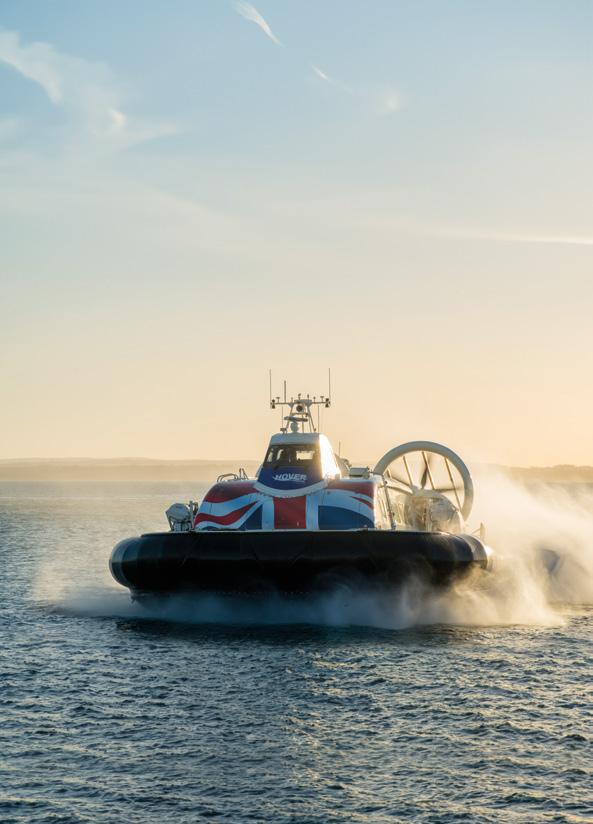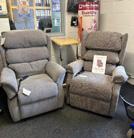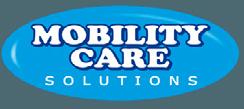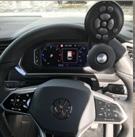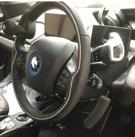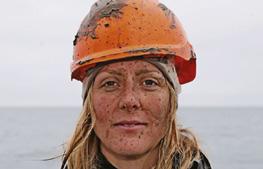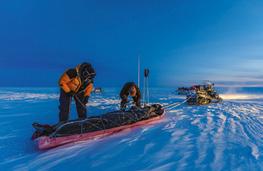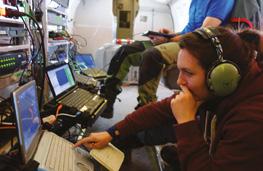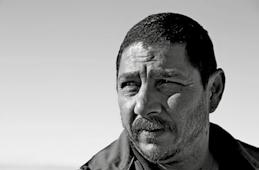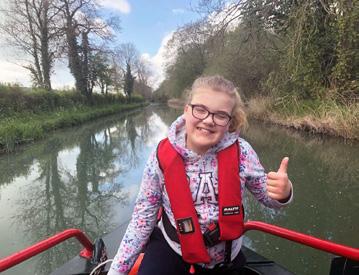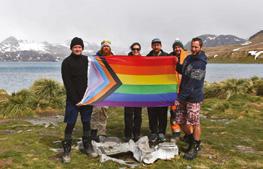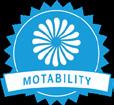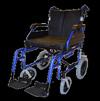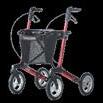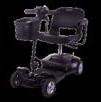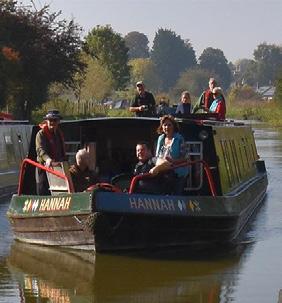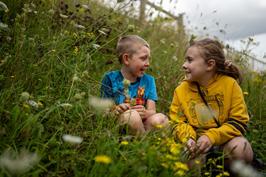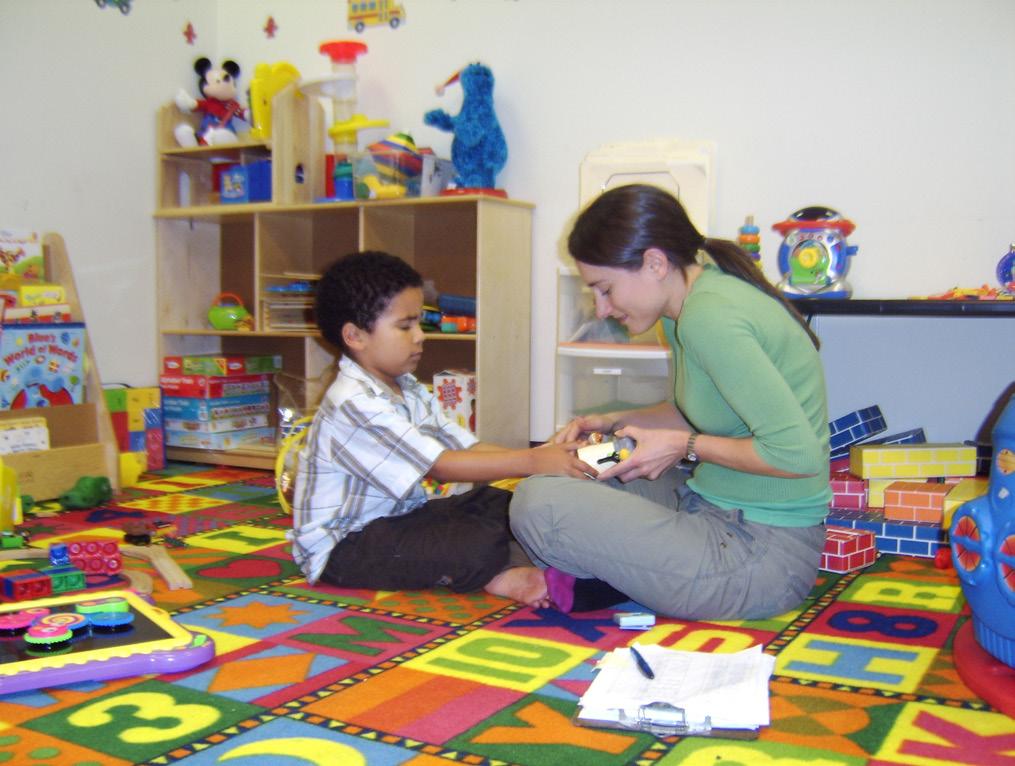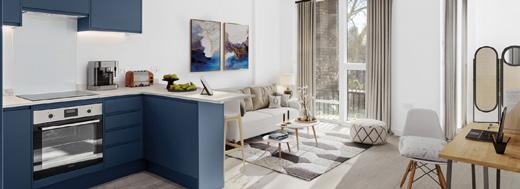
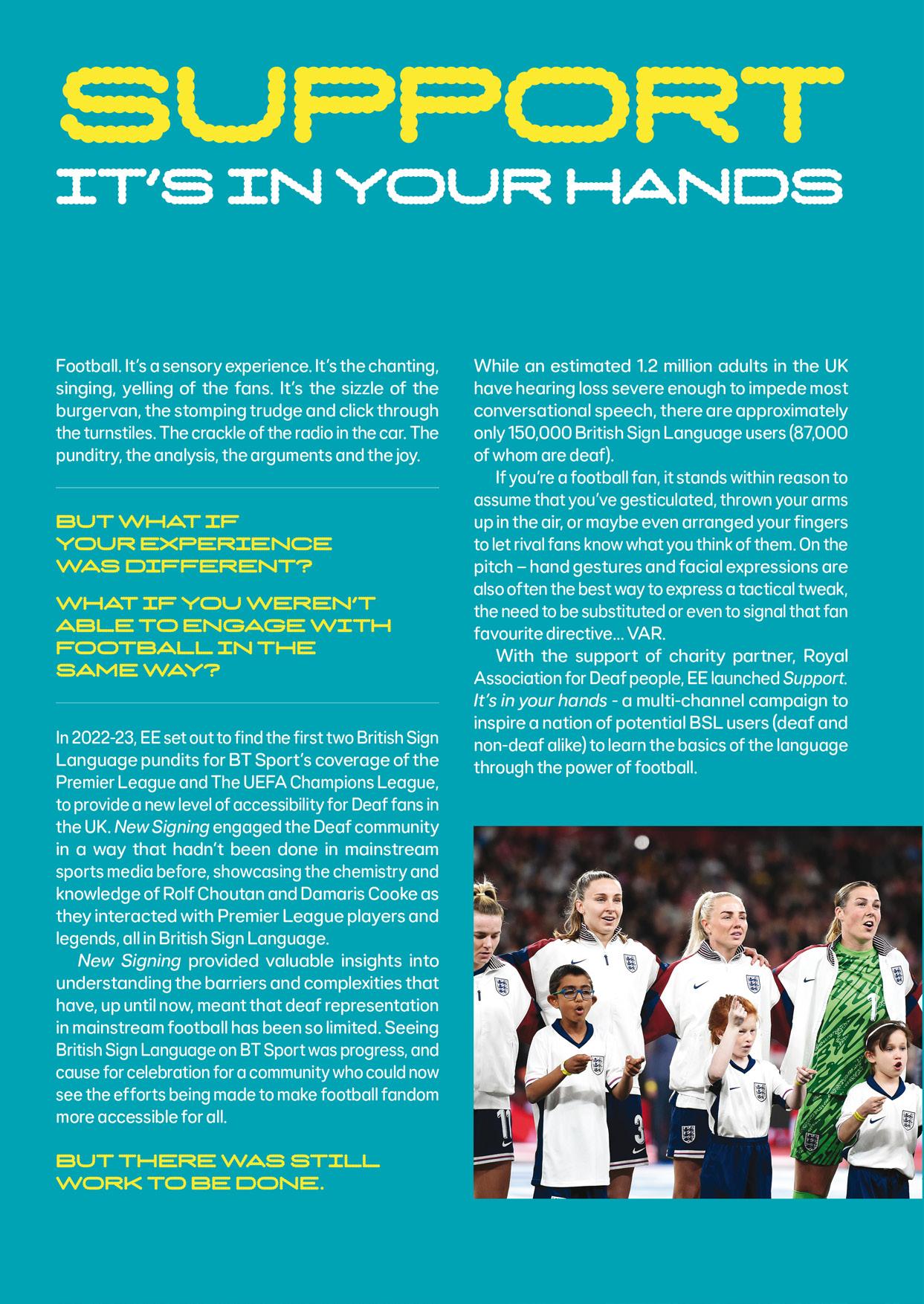









08 An update on the upcoming DRM podcast
look at what to expect from DRM
AND
14 “You can’t force someone to work on their ignorance.” In conversation with Samantha Renke
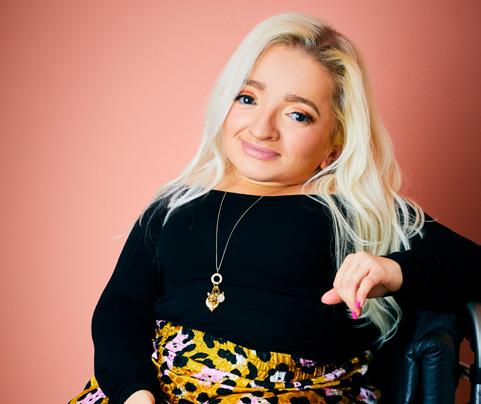
20 The travel resources you need to know about How to take the stress out of travel, one aid at a time

24 Human Beauty is beautiful A deep dive into the world of travel-safe adaptive beauty 28 Lost in London by Carole Edrich Our travel columnist takes us around her favourite accessible places

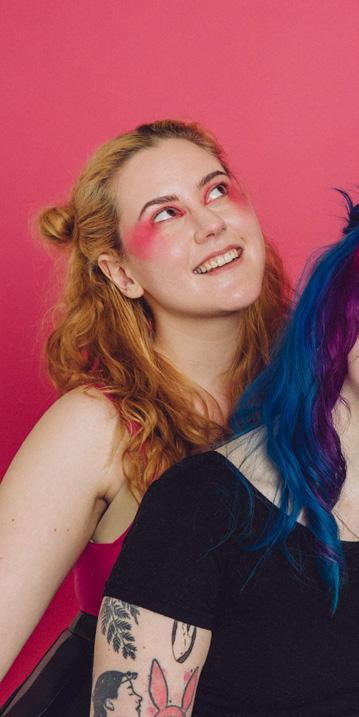
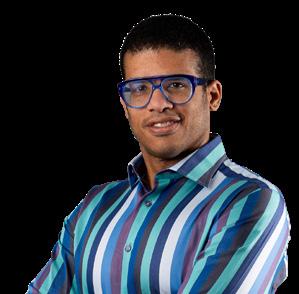
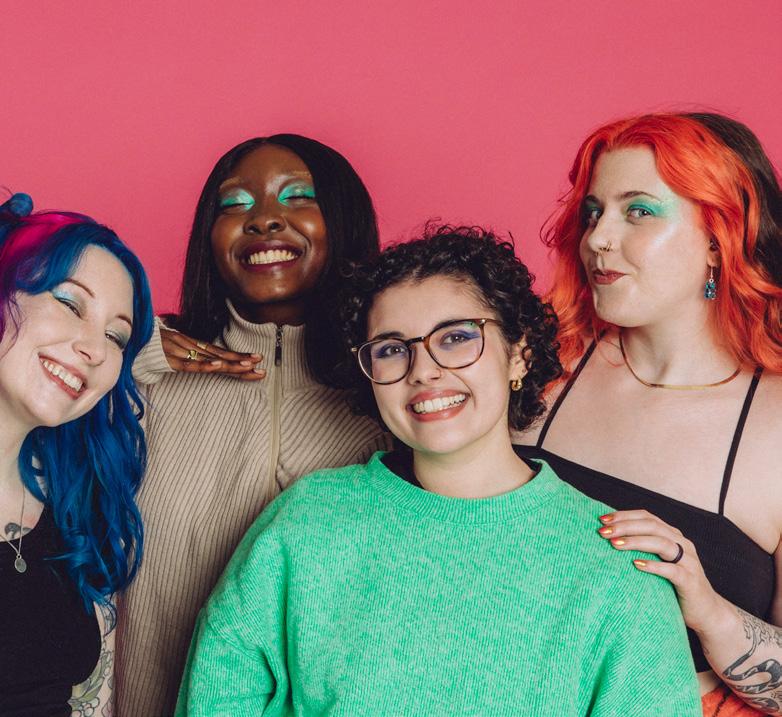
46 “How does the past inform the present?” William Kuhn on his new Byron biography & lessons learned
50 Poverty to possibility by Dr Amo Raju OBE DL How a journey to India inspired our resident writer SPORTS
52 “We don’t always assume non-disabled people are Olympians” In conversation with Gemma Stevenson
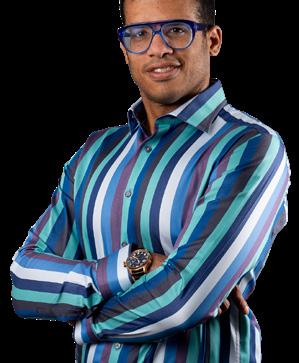
Executive Editor: Lee Gatland
Art Director: Richard Hejsak
Managing Editor: Lydia Wilkins lydia@sevenstarmedia.co.uk
Sales Team: 01959 543 650 sales@sevenstarmedia.co.uk
Published by SEVEN STAR MEDIA LTD
184 Main Road, Biggin Hill, Westerham, Kent Tel: 01959 543659 disabilityreviewmagazine.co.uk
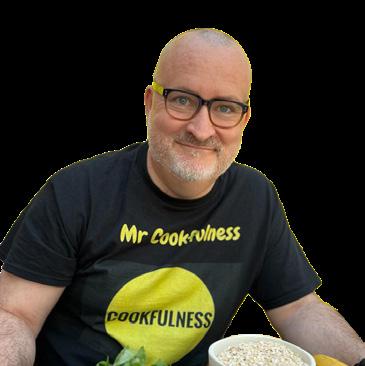
56 How To Make Chunky Coconut & Cranberry Cookies by Ian Taverner
Our food writer treats us to a new recipe for Summer!
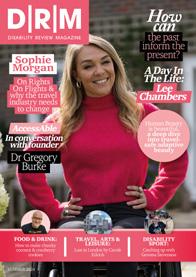
COVER CREDITS: Christopher Pledger
Disclaimer: Disability Review Magazine (DRM) is published three times per annum by Seven Star Media Ltd. No part of DRM may be reproduced, stored in a retrieval system or transmitted to any form without permission. Views expressed in the magazine are not necessarily those of Seven Star Media Ltd, and are included to provide advice only. No content is a substitute for professional medical advice. During printing, images may be subject to a 15% variation. © Copyright of content belongs to individual contributors with the magazine copyright belonging to Seven Star Media. All rights reserved. Please either keep this magazine for future reference, pass it on for somebody else to read, or recycle it.

In her multiple ‘lives’ across the various artistic industries, Diana Vreeland was an instantly quotable woman - a quality that still resonates across Instagram today. One of the most attributed lines to Vreeland, someone heavily involved with the US edition of Vogue in its ‘golden journalism’ era, is that “the eye has to travel” - a comment on a reader interacting with a magazine, and how they are taken on a journey when they open up the cover, just ready to dive in. Their eye has to travel, be taken on a journey. There is still a grain of truth that resonates to this day, especially when it comes to disability. We just have to fully reconcile such an idea.
The travel industry has often been criticised for its exclusion of disabled travellers, often thanks to arbitrary rules, discriminatory practices, or just a lack of care. Wheelchairs being broken on airlines have become a common ‘viral’ trope almost, in that videos and complaints often circulate online; content creators film themselves in real time, to document the lack of working practices that treat disabled travellers with respect. Others point to the normalisation of verbal abuse and ‘good intentions’ behind so called ‘helpful’ actions - such as with the hashtag #JustAskDontGrab. Just what on Earth is going on? To be helpful to anyone needs to be on the basis of consent, for a start.
As the holiday season gets underway at last, here at Disability Review Magazine we thought a deep dive into this world was more than just appropriate. This is our travel issue - where we will be looking at the rights of disabled travellers, different schemes, resources and more. The usual features are still here - including the Newsbeat pages, the terminology breakdown of disability vocabulary, a recipe and more. Added to that, we also have two wonderful women who are a part of this issue. Sophie Morgan is heading up the groundbreaking organisation Rights On Flights; she tells us more about her work in this issue. Samantha Renke is an actress and consultant, and has also recently released You Are The Best Thing Since Sliced Bread, a pink jacketed manifesto of positivity. Both individuals have done a lot for disabled people, and it is a pleasure to have them as part of this issue.
The travel industry has often been criticised for its exclusion of disabled travellers, often thanks to arbitrary rules, discriminatory practices, or just a lack of care.
Disability should not be a barrier to travel, and yet the societal barriers in place have become far too normalised. Pre-booking is actually not required by law when it comes to using the railway networks in the UK, for example, however the presumption still remains. It’s 2024. And the lack of access with an intersectional focus is, simply, just not good enough. And we have got to do better. We do that by bringing the issues to light, and having a conversation. And it is my hope that this issue can play a part in that. See you in December.
Lydia x








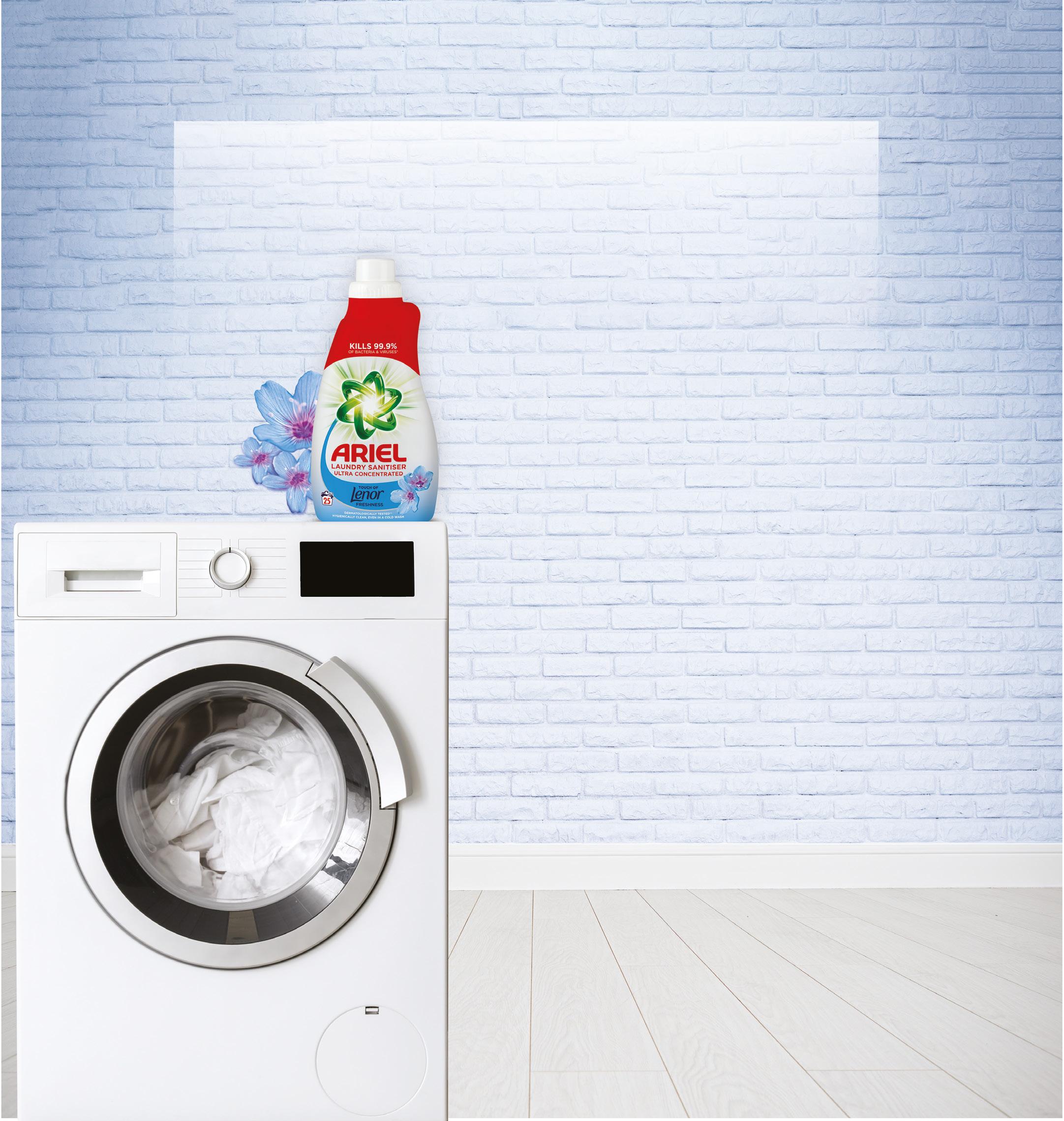
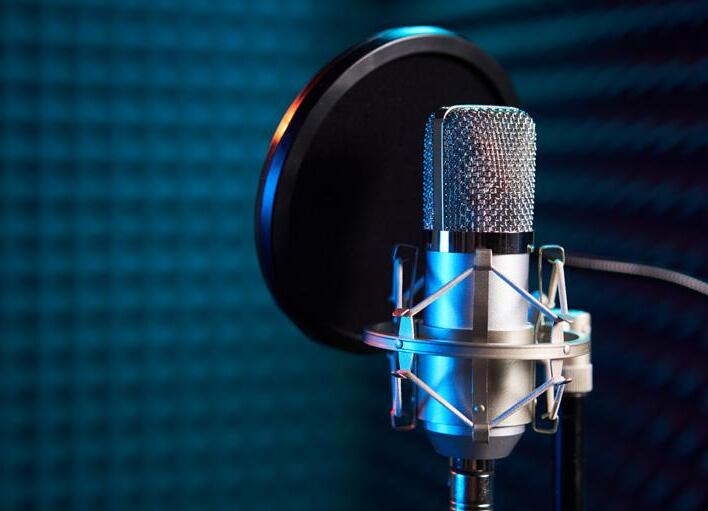
Later on this year Disability Review Magazine will be launching a podcast. We wanted to try something a little bit different; this will be a place of conversations about disability, with nuance, in bringing an extra dimension of nuance to the table.
We know that you, our readers, will have questions - which we wanted to answer right here.
Why did you want to go into podcasting?
A magazine is so often typically seen as being something that is what it is - that there is the glossy product on the table, you pick it up and leaf through it idly once a month, or every quarter. The conversation should not be stopping there - as there is so much more to be said. And a podcast seemed to be the way forward from that.
Why do conversations about disability matter? Who are we talking to?
Disability is such a multifaceted concept that is often times not particularly well understood; even the universal sign for
disability does not reflect the nuance of the term. There are hidden disabilities, acquired disabilities - and it is something that will come to touch the lives of every single one of us. We cannot afford to be sticking our heads in the sand, and not talking about something that is actually relatively pressing We just need to talk about it with nuance!
There will be 6 episodes from us to start with; there will be a range of people that we will talk to. They are disabled people from all walks of life, all with different stories to tell.
What should you expect from us here at Disability Review Magazine? Why should I listen to the podcast?
To start with, there will be six episodes of a podcast to listen to; all will be around forty minutes of a conversation with a disabled person. Each episode will be conducted with nuance in order to lift the lid on the story of the participant; there will be a variation on themes - such as when it comes to sports, activism, fashion and more. The episodes have also been edited slightly, in order to enhance the listening experience.
How can I listen to the podcast?
This podcast will soon be available on all good podcast listening apps such as Spotify; it will be free to listen and to subscribe to each week, as an extension of the content available in each issue of Disability Review Magazine.
What’s new and out now in the world of disability media? In each issue of Disability Review Magazine we compile a handy list for you of new and upcoming releases.
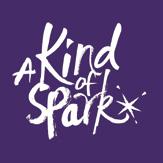


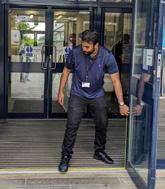
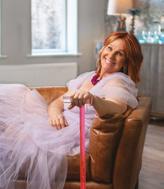
In our last issue we mentioned A Kind Of Spark, and how there was a second series on the way. Now available on iPlayer thanks to its release on 26th April, the series is a milestone in its representation of the lived experience of Autism and growing up. You can watch all episodes on iPlayer.

With Love, Grief And Fury is a new poetry collection by Salena Godden. The book contains a host of writing on a variety of subjects - and she also mentions disability in passing. If you’re looking for an affirming read of looking to a hopeful future, this is it. The book is out now in all good bookshops.
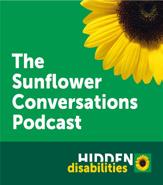
On April 18th The Lowdown - more on the organisation is a second - hosted a summit about Women’s Health in London. That included talks about contraception, menopause, and so much more. Make sure you follow them on Instagram at @get.the.lowdown

AccessAble is the UK’s biggest provider of information in the disability space, and has been for 25 years; they have recently launched the Your Accessibility Guide portal, which can be visited at Youraccessibilityguide.co.uk

Human Beauty is an adaptive beauty brand that has accessibility features. The Dare To Blush Heart-Shaped Blush Stick is sure to be a travel essential this season for its durability. For the cheeks or lips, it retails at £14.00 & is available from humanbeauty.co.uk
The Sunflower Conversations Podcast is run by the folks behind the Hidden Disabilities sunflower lanyard scheme - and this should be no exception to your listening playlist. For candid conversations, press play!
The Midst is a new publication and Substack newsletter that describes itself as ‘the gateway drug for the modern midlife experience’. Middle aged women are writing about the impact of ageing, and freely - and it covers a range of topics. Log on now at the-midst.com
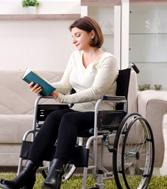
NeoWalk, whose founder we interviewed in our last issue, has recently opened The NeoWalk Hub. Based near York, The Hub is a space where you can book an appointment almost like a private shopper, to explore accquiring your new mobility aid.

The 17th - 23rd of June was Learning Disability Week. While there has been a focus on Learning Disability in connection with warnings via various services, here at DRM we wish to encourage everyone reading to engage with Learning Disability Week - be it via reading books by members of this community, engaging with media, etc.
Is this a dream? Alas, fear not! NeoWalk has launched Once Upon A Dream, a fairytale of a walking stick; in a clear octagonal shape, the insides glitter with a strand of pink. Visit Neo-walk.com to purchase now.
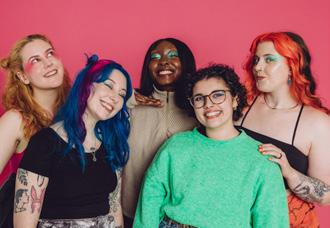


Match Your Mood by Human Beauty is a new beauty campaign, complete with a cosmetic palette designed by a Queer, Autistic artist. All the models are Autistic - and the premise is using colour to express your own moods and emotions. Keep an eye out on humanbeauty.co.uk
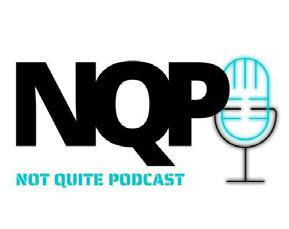
The Not Quite Politically Correct Podcast has a different take on disability and related issues - and has a regular turnaround of episodes, too. The podcast is available to listen to anywhere, from all good podcast apps.


The Lowdown is a research hub for women’s health that is available for all to access online. While there is a gender health gap as well as a pain gap when it comes to health, it’s important that we keep considering disability in this context, too. Find out more at thelowdown.com.
Hot on the heels of releasing her debut book, Ellie Middleton will be releasing her next book on 5th September. Titled How To Be You, the new book looks at how to work with a neurodivergent brain, and what needs to change.

Frances Ryan, columnist for the Guardian, is set to follow up her debut book with the release of Who Wants Normal? Out next year, it is a book that looks at disability and womanhoodwith a litany of interviews.
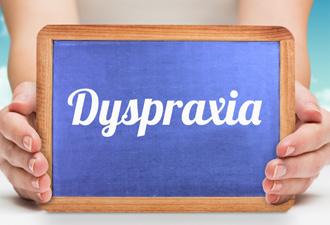
1 - 7 July is Dyspraxia Week, and this year has the theme of My Goal, My Way. The idea is to shine a light on the strengths of those who have Dyspraxia, as well as to show that the way forward may not always be so straightforward.
Sophie Morgan has headed up the #RightsOnFlights campaign, which was a response to the continual debacles of trying to access travel and having mobility aides damaged while in flight. She spoke to us for this issue - but you should also know that there is a documentary about this coming soon to Channel 4.

July is Disability Pride Month! A full thirty one days of celebrating the nuance and the experience of what it means to be disabled; as a society we so rarely ‘speak to’ disabled joy, what it means and why. Keep an eye out on social media - because there is sure to be a lot of content, all of which is usually colourful and confident.

Rachel Charlton-Dailey, author and columnist for The Canary, is writing another book. Out next year with Hurst, it’ll look at the history of disability rights activism.
In each issue of DRM, we dive into disability terminology to unpick what it means. In this issue, we explore the meaning of Pandisability, and why it should matter in the world of travel
If you google the term pan-disability, you may be somewhat mystified as to what the term could possibly mean. The infamous search engine offers up a non-specific definition that could make you scratch your head in consternation, at the very least: “adjective. Pan-disability (not comparable.) Relating to all forms of human disability.”
Other results that then emerge ask ‘what is disabled football called?’ And ‘Who is eligible for pan disability football?’ Yep. Here at DRM we would also be mightily confused, too.
At its core, pan-disability is the name for an approach that is taken when it comes to creating inclusive and accessible environments, practices and interactions.
Pan-disability is an approach that means to reflect disability inclusion as much as can possibly be achieved. Rather than, say, an organisation taking the approach of ‘we ticked off the disability inclusion by having a disabled access bathroom’, efforts need to be wider. Disability, as to how it is defined in law, is a concept that has a multifaceted nuance that is too often unaccounted for. It is not just
the universal symbol - that of a wheelchair user - and can also be hidden, too. So think further - is the building providing step free access? If you’re hosting an event, is there a quiet space that may be available? Have you provided alternative means of communication - such as for Makaton, or even in the event that someone struggles with sound? Is that clearly sign posted?
Firstly, this matters because of the Equality Act. Individuals who are in employment, education, etc can ask for what is known as ‘reasonable adjustments’ - which could be a laptop for exams (such as if they are Dyslexic), a supportive chair with adaptations in the office (such as if they have Ehlers Danos Syndrome, also known as EDS.) This is the law - and taking a pan-disability approach to the planning of access is crucial. Similarly, when we come to travel, we need to think about the fact that disability and barriers to travel are across a range of conditions. [To illustrate, the editor of DRM would like it to be noted that when she asked for assistance previously, she was in fact talked over, told she must use a wheelchair despite her not being a wheelchair user, as well as being mislabelled with a pejorative term for a brain injury.] If we want to encourage travel and an uptake in engaging with travel, which would have a positive knock on impact economically, then to not be seen as inclusive cannot be the standard ‘norm’ a momement longer.

Get to grips with the nuance of disability and let go of the idea that there has to be ‘certain look’. Plan this into any initiatives organisationallyand consult with a variety of disabled people.


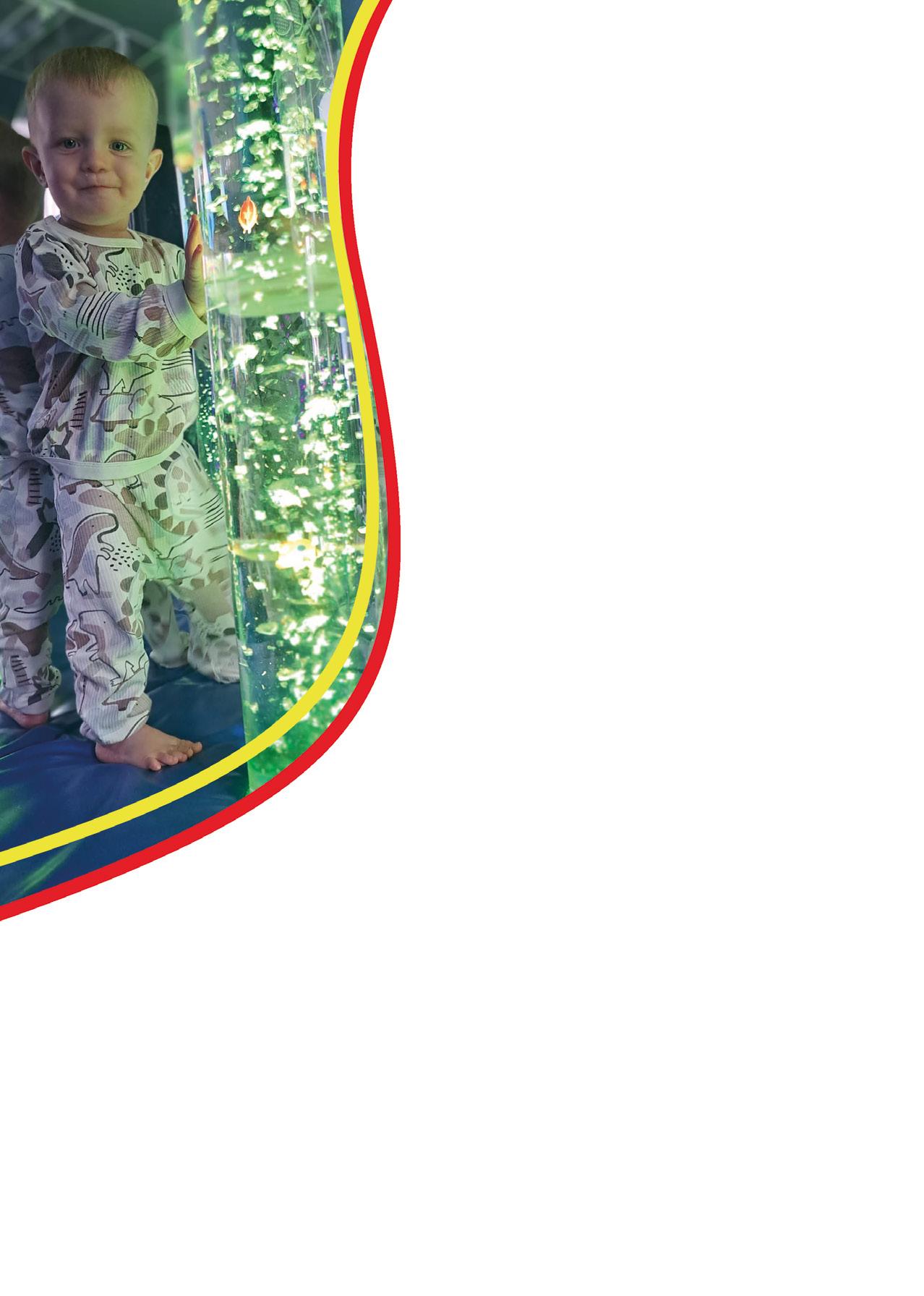
“Rompa

“The


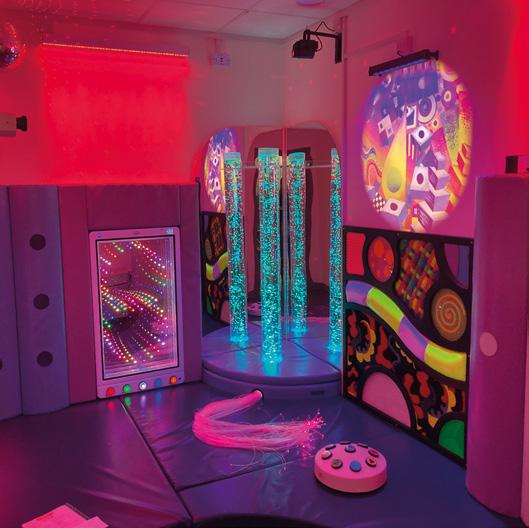
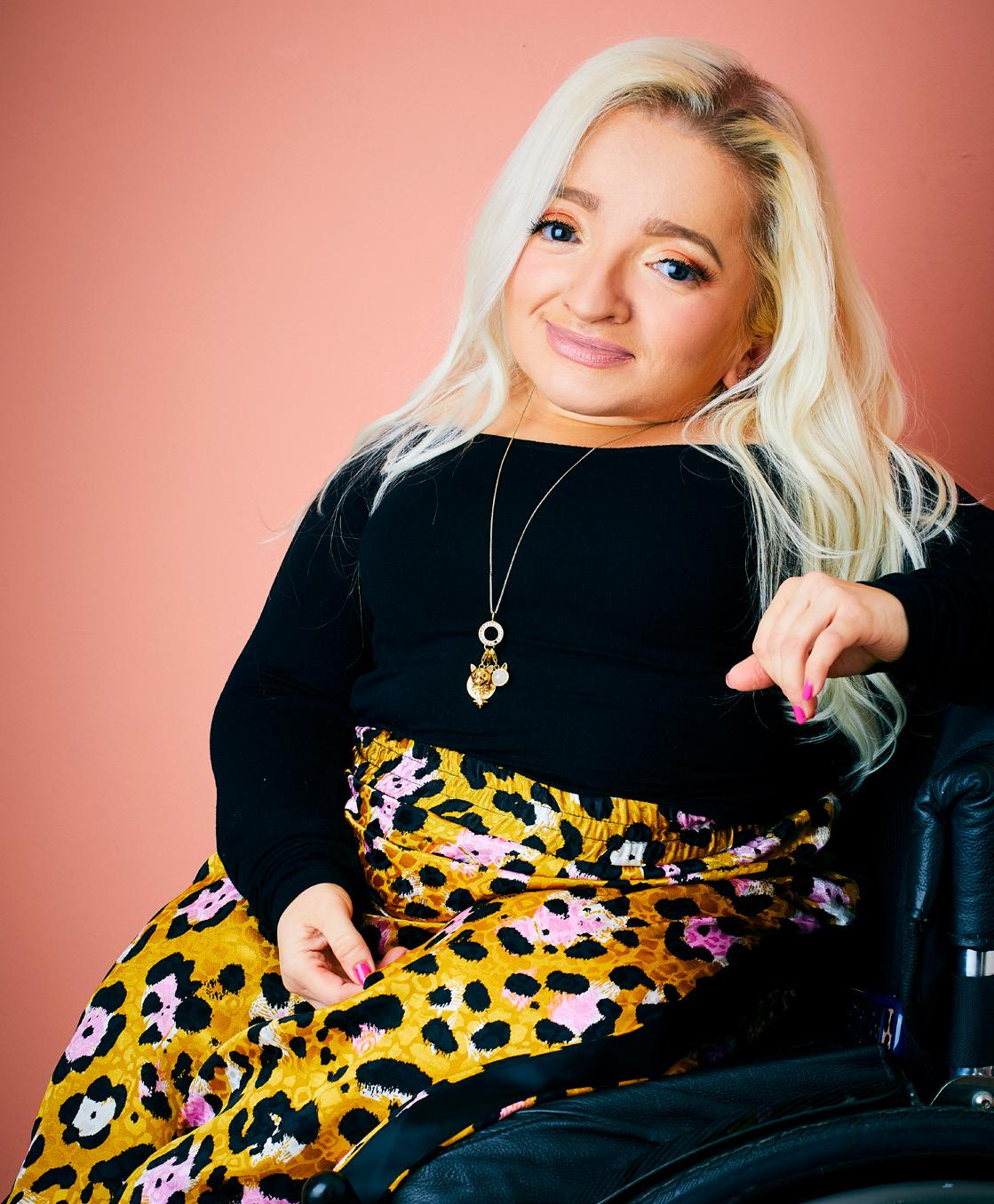
Samantha Renke holds a multiplicity of titlesincluding actress, presenter, disability activist, DEI consultant, author and columnist. Known for her standing in the disability community, DRM caught up with her to chat about the barriers to accessing travel.
On the events behind her memoir, You Are The Best Thing Since Sliced Bread
I think people don’t often see all the labour and the heartache that goes into it, all the months and even years that go prior to it. So my book, You Are the Best Thing Since Sliced Bread, it’s an interesting story. So the year before the pandemic, I would say that my career was going on a really positive upward trajectory.
I moved to London in 2012 and essentially from 2012 onwards, I progressively and steadily worked up my career and my portfolio. So I guess, and they actually say [this] when you have a career change — so I went from working in an education setting to obviously doing what I do now, which is a which is what they refer to as a portfolio lifestyle.
I was this three foot nothing wheelchair user who was really loud and really glamorous!
Samantha Renke on inhabiting a party space to network when you have a portfolio career
consultancy and all the little bits in between. It was around spring time of the year before the pandemic, before we knew what was going to happen. And I had an email from someone who I admire immensely called Fern Cotton. [Editor note: Cotton is a well known television personality.] I grew up watching Fern on television. Ironically, we’re, we’re of a similar age, but I think she started her career when she was around 14 years old. Her team approached me because not only does she work in television, she has a brand called Happy Place.
Anyway, so I, I embarked on this portfolio lifestyle of a bit of acting, presenting, advocacy, writing and
And every year she has a festival, a well-being festival. So I got, I opened up this email and it was basically saying Fern and her team would love to have you as a guest speaker on Happy Place. I was ecstatic to say the least. And then at the same time Boy George, who is a very well-known singer [also got in touch.]

I speak about losing my father when I was nine years old in the book, and [how] he died suddenly. And I and I think, you know we talk about overcoming adversity and, ‘being inspirational’ when you’re disabled
[When] I moved to London I was a bit of a wild child. But equally, ironically, that was before the days of really Instagram was big or, you know, that kind of social, social networking, like it was very much at its infancy. So essentially, when I was out partying, I was also networking because a lot of the people that I was partying with all worked in media, all worked in television. I would like go to, go to parties and just bump into really high profile people and kind of charm them with my northernness, so to speak.
At that time, there was still quite a lot of ableist misconceptions around what disabled people ‘should do.’ I was this three foot nothing wheelchair user who was really loud and really glamorous! So I apparently bumped into Boy George because he would DJ a lot of the places that I would go and party…! And he became a bit of a fan boy. (I don’t remember this because I was probably too intoxicated.)
Before the pandemic, his team got in contact with me. but he always said that he wanted to work with me. And I just thought it was one of those like comments like, yeah, yeah, of course, like that’s never going to happen. So then Boy George’s team got in contact said he’s working on a new album. He wants to get you in the studio with him, and collaborate. And he sent through a song from his album called You Are the Best Thing Since Sliced Bread. And he was like, I want you to learn it. And then I want you to be able to lip sync it and we’ll record it together.
So two of these amazing people that I look up to had reached out to me. And I was like, oh my God, I’ve made it. This is why I’ve worked so hard for the past decade. This is phenomenal. And then the pandemic hit. And everything went into the dustbin. And so I think this is the essence of my book. And the message of my life, I guess, and this is what really inspired me. Both opportunities never went away. They just changed how they
were going to manifest.
So Happy Place and Fern still wanted me to partake in the festival, but it was going to be virtual. Boy George still wanted to work with me. But instead of being in the studio together, he just said, record it on your iPhone. And although these opportunities didn’t go away, they weren’t how I had envisioned. And to tell the truth, I was really disappointed [at the time]. I was really disappointed that I wasn’t able to physically be in these spaces.
Anyway, fast forward a little bit. I did Happy Place festival. It was lovely, you know, and what came from that was a really, really beautiful friendship with Fern, because although we didn’t get to work together in person, we communicated on WhatsApp nearly every day throughout the pandemic.
And then also with the filming the video for Boy George, I was actually shielding at my mum and stepdad’s home during the pandemic. So I was like, right, okay, so if you want me to record on my phone, I’m not just gonna just stick the phone in front of my face, I’m gonna go for it. Look, I’m an actress, let’s do this. So I created about four or five different alter egos.
My mum was the camera lady.
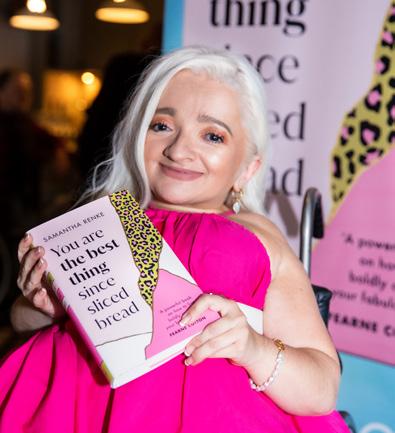
And honestly, so we set up all these different shots and all these different characters. And we created a little music video. And when we sent it to Boy George, his exact words were, I wasn’t expecting this, I now have to up my game.
Through the connection with Fern, she reached out to me, it was about a year into the pandemic. And she basically said, look, Happy Place are producing a an imprint with Penguin and Ebury. And I want you to be alongside Craig David, the first book that I publish through my imprint. And then I just started writing. And, you know, I finished it by the time the pandemic was over. And we published it.
Yes, I asked to use the same title as the [song from the] music video. Because it spoke to me that, you know, the words, that we all need to believe in
ourselves. And I think I’ve always had an innate sense of self worth. You know, people ask me, what is your secret? What’s this? And I go, there is no secret. But I always had a feeling that I am, I’m here for a reason. I’m here to help and support other people.
And also, I speak about losing my father when I was nine years old in the book, and [how] he died suddenly. And I and I think, you know we talk about overcoming adversity and, ‘being inspirational’ when you’re disabled - but the bottom line is my drive comes from knowing that my dad left this earth way too soon. He died when he was 38. I am now currently 38. And I can’t fathom leaving this world because I’ve still got so much to give and so much to do. I also want to make him proud of me wherever he is.
Gosh, there’s so many answers I could give you for that, but I thinksomething that I talk when I deliver keynotes, presentations, I talk a lot about attitudinal barriers because as we know, irrespective of our disability or neurodivergence, we would always say that the other barriers, so physical barriers, information, communication, those barriers, - yes, they are problematic, but ultimately a lot of them can be simply removed, but we can’t change people’s hearts and minds.
You can’t force somebody to unlearn their unconscious bias. We can’t force someone to be an ally. You can’t force someone to work on their ignorance.
You can’t force somebody to unlearn their unconscious bias. We can’t force someone to be an ally. You can’t force someone to work on their ignorance.
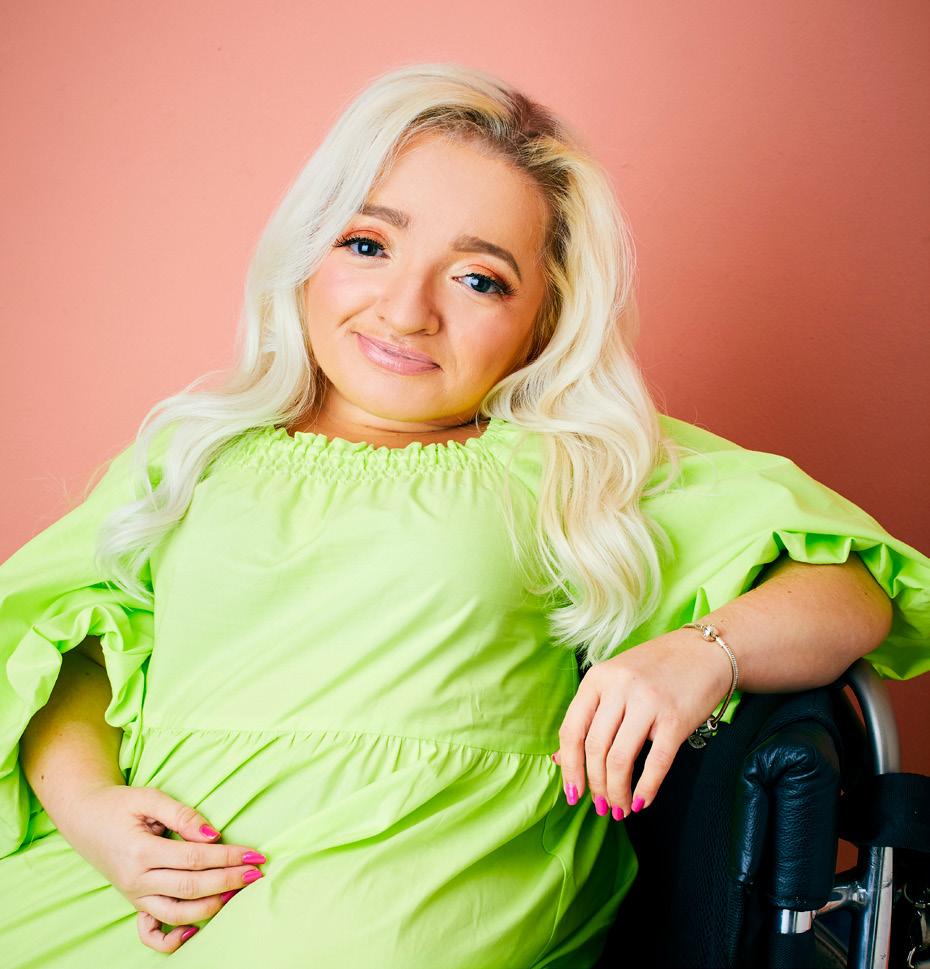
So I talk a lot about that and I guess what I would want my non-disabled people to know is that actually, you know, your own bias, your ableism, because we all have it, I have it. I spent a lot of my young adulthood rejecting anyone who was disabled. And that’s because I had consumed that unconscious bias that we are all infiltrated with in such an insidious way, because we are, it happens everywhere, we internalise it.
But what I would say is that those flippant comments, those, I don’t even want to call them micro aggressions, I guess, because they’re often referred to as death by a thousand paper cuts, which is true. But I just think your outdated ideologies stick with us. It might be a flippant comment for you.
Same goes for when, family members still use the word[s] like normal, and I think what I would want to say to anyone: whether you are a parent, a caregiver, a family, friend, colleague, leave your ego at the door. If someone says to you, that that’s triggered me or that’s upset me or that’s not sat right with me, don’t be combative.

So my needs have really changed quite a lot dramatically in the past couple of months because I don’t drive. Before I moved to London 12 years ago, I started to embark on that journey of learning to drive
My access needs, I guess, like many disabled people, can fluctuate depending on a whole host of external factors or even factors that are associated with maybe our own condition.
So for me, I’ve got Brittle Bones - Osteogenesis Imperfecta, I’m a full-time wheelchair user. So that comes with fatigue as well. It comes with muscle ache, bone ache, limited mobility. I am a manual chair user and a power chair user. But as I said, I was living in London for 12 years.
So my needs have really changed quite a lot dramatically in the past couple of months because I don’t drive. Before I moved to London 12 years ago, I started to embark on that
journey of learning to drive. And then because the opportunity came quite quickly to move to London, and I was situated [in] central London.
So black cabs in London are — by law all have to be accessible. So, so my needs went from being relatively independent to moving back home here, to not having a car and none of the local taxi firms have, got wheelchair accessible vehicles. So because I can’t transfer independently from a car seat to my manual chair, I’d have to travel with a PA. So my needs at the moment is at the moment until I get a WAV vehicle, a wheelchair accessible vehicle, I always have to be accompanied by someone at the moment for me to be independent.
So when I travel, because I can’t
walk at all, and I would struggle to transfer independently without things like a sliding board or something like that, which again, it’s one of the things, the more equipment you need, the more assistance you need, because you can’t be carrying around all these equipment. So if I were to go on a flight, I would always have to fly with somebody. Hotel rooms would all have to have accessible wet rooms and so on.
So it’s an interesting transition that I’m finding myself in at the moment, because obviously, for me, one of my, I never regret anything in life, but one of my things that I feel sometimes a little bit sad about, bitter about even - these are all human emotions. Because the more, the more support you need, the more money it costs.
This is a bit of a geeky one. I’m a huge Buffy the Vampire Slayer fan. (Don’t hold it against me.)
And I want to do the tour. Like, I want to go to California and go to all the places where they filmed. So that’s, that’s on my bucket list. And I’ve also got a friend who also has Brittle Bones who’s got a place in Florida. So I definitely want to go and visit her. I’ve always had a really fond connection with Japan. I remember when I was about 14, I read Memoirs of A Geisha and I just became obsessed with Japanese culture. And I actually have a school friend, a primary school friend who now lives in Japan. So maybe, maybe that’s what I need to do. Maybe I need to be that person, that cheeky person who’s like, “Hey, remember me?”
So yeah, there’s a lot of places that I want [to visit], but also, you know what? I also would love to explore the UK a little bit more. I think the UK is beautiful. I struggle with long holidays. So for me, like short and snappy trips are wonderful.
iTo find out more please visit: samantharenke official.com
INSTAGRAM: @samantharenke
FACEBOOK: @samantharenke
TWITTER: @samantharenke
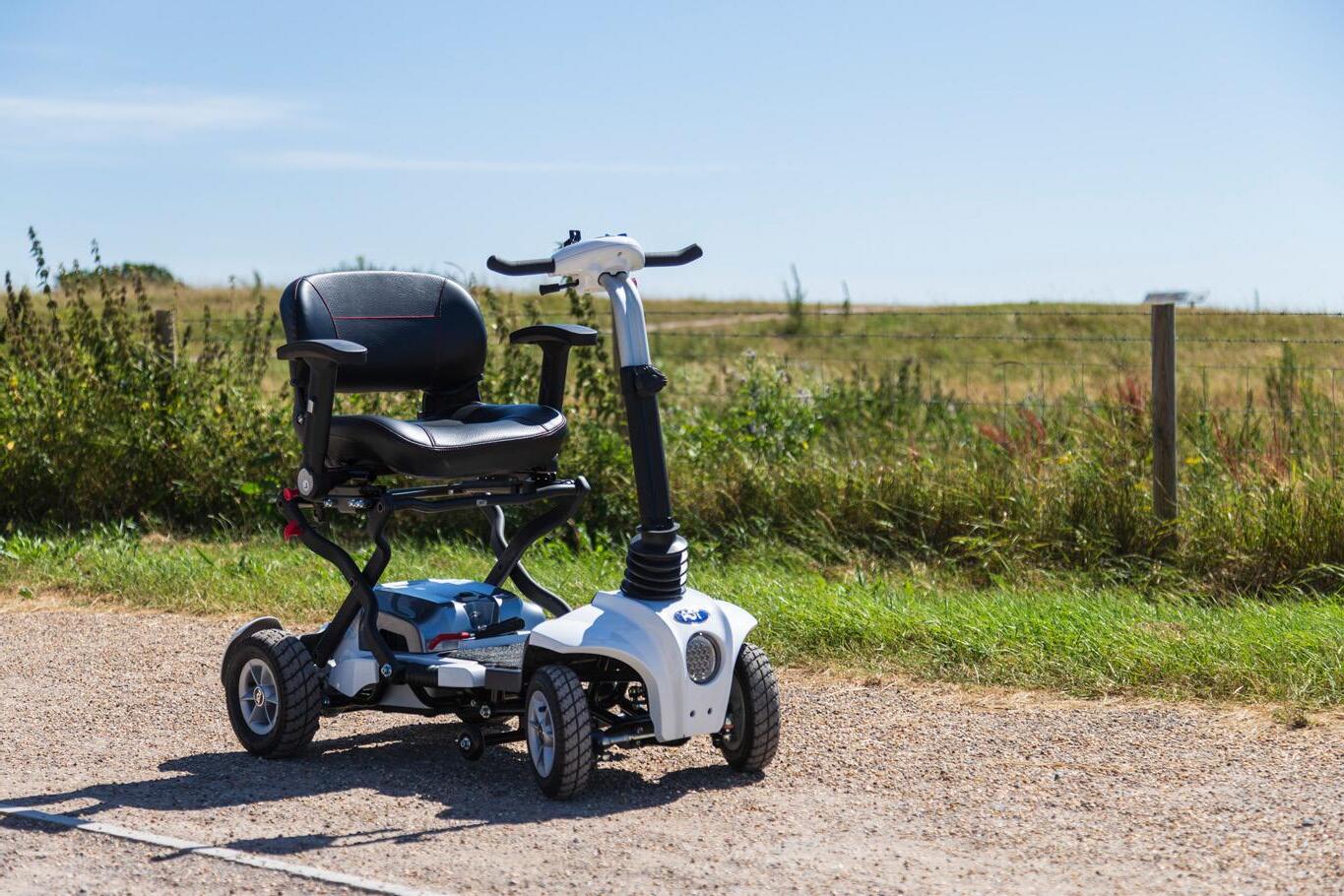
Travelling while disabled means dealing with extra barriers - and that takes time & energy. In each issue of DRM we offer a list of resources you can pull out and keep to hand
The planning of a journey can make anyone feel overwhelmed, simply as there is a lot to account for - but the right tool can be helpful.
Tiimo was built to cater to Neurodivergent individuals, who may struggle with a loss of routine, changes that require travel and more.
If you are going somewhere in the UK that is, say, for a long weekend, Passenger Assistance is another app that can help you out when travelling, too. Finally, the Sunflower Lanyard
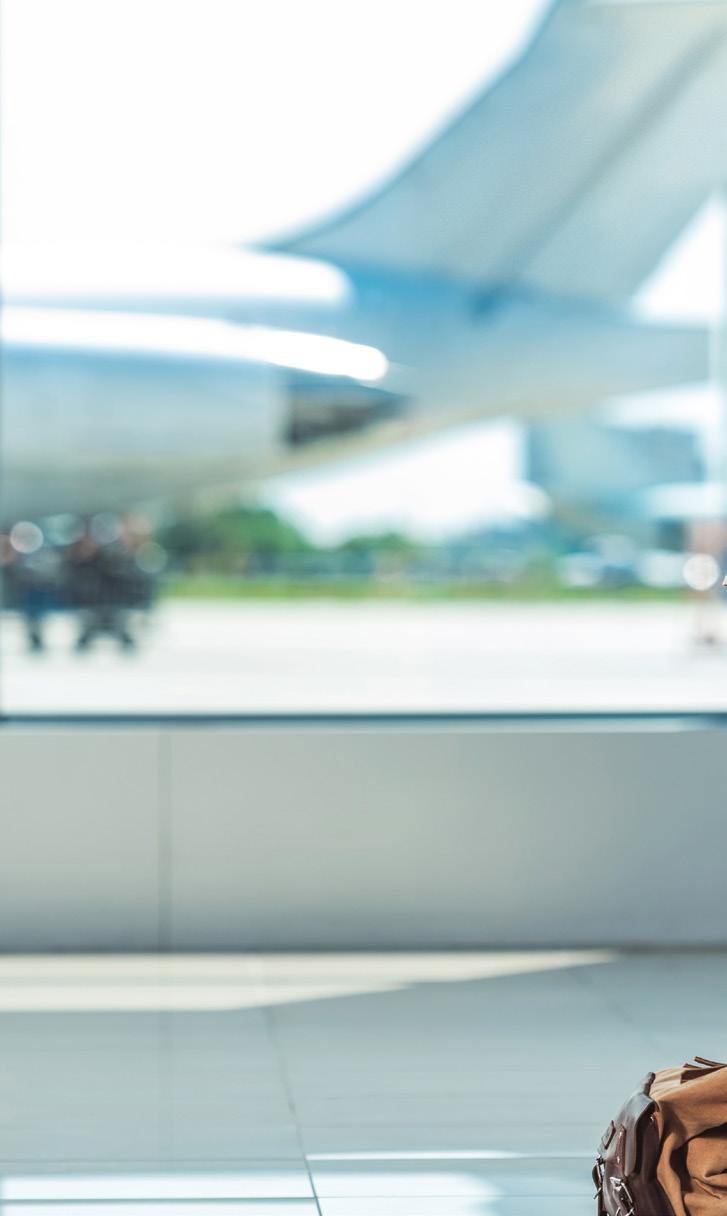
Tiimo was built in mind to cater to Neurodivergent folk; they may struggle with a loss of routine, and this can be a great tool when planning.
Scheme. The Sunflower Lanyard Scheme is the home of the symbol of hidden disabillities - such as if someone has a stoma, a form of Neurodivergence, or any other condition. It’s a discreet signal that lets venues know you may need extra help; there are free distribution points, and you can also buy a lanyard from their website.
Sometimes we need to account for aids that may help us along the way - and travel is no exception. First, access sometimes needs access

If you struggle with processing and need a little bit of extra time, the JAM card may also be worth investing in
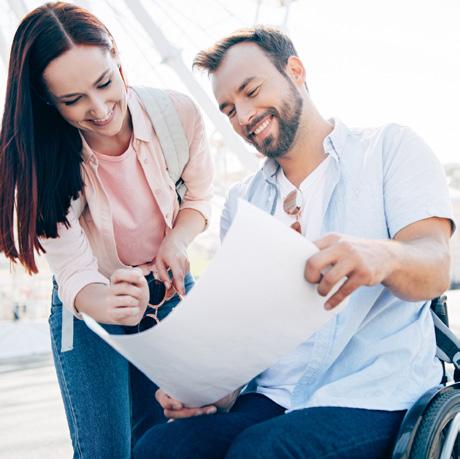
investing in a pocket can opener; there are pocket versions available on Etsy that are travel appropriate.
passports - which some organisations sometimes offer us as free printables on their website. It may take some searching however, as this is not always a widely recognised form of documentation.
If you struggle with processing and need a little bit of extra time, the JAM card may also be worth investing in.
JAM stands for Just A Minute - in asking for that little bit of breathing space - and can be found online.
There are also a litany of ear buds that are available for almost evey single possible preference. These are a *must* when it comes to travel - be it on trains or planes.
If you struggle with the opening of containers and cans, it may be worth
Airports, to be straightforward about this, can be hit - and - miss when it comes to accessibility. It can also take a lot of searching around online to find out what is on offer, and to actually be able to book in to organisational systems. But what should we all be looking out for?
If you are Neurodivergent, sometimes airports offer up the use of a sensory room. This can be a calming space, a way to self regulate, away from the hustle and bustle of so many people outside the door! There can be a ‘catch’ however, in that they may need to be booked quite far in advance.
You may need to book in advance to access the disability related assistance - and this can be variable, too.
Sometimes airports also offer up social stories for younger children, along with an a member of staff to escort you from the departure lounge to the gate.
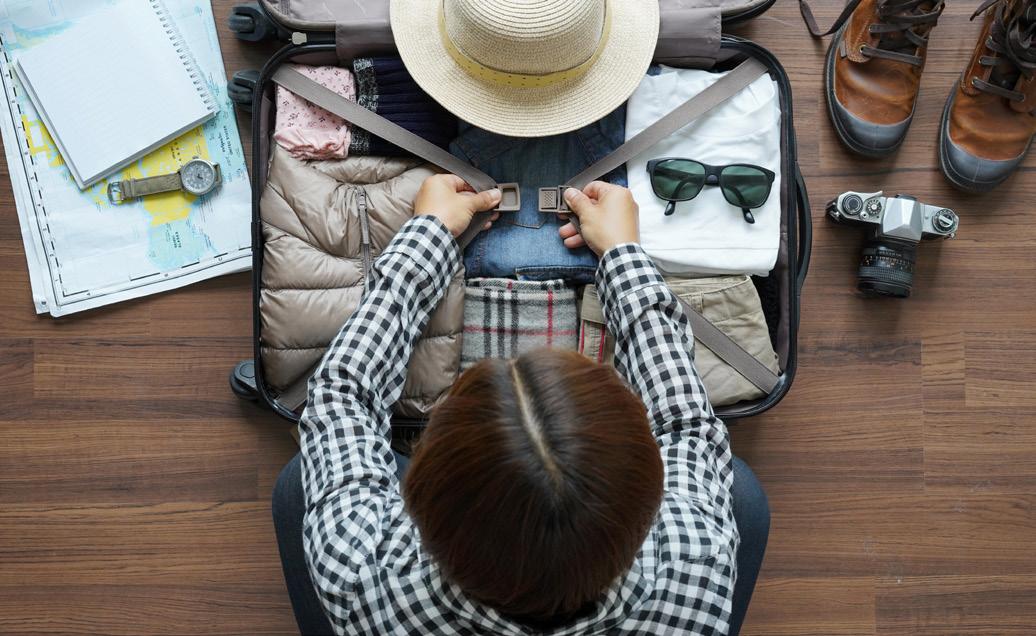
Disability and getting dressed in the morning can become extremely frustrating. Add travel to the mix, and the activity becomes beyond taxing. What can we do about that?
In our last issue we dove in deep into the rise of adaptive fashion; there are a litany of brands to suit a range of conditions.
There is BraEasy, Dewey, and many others - they may need some ‘searching out’, but adaptive fashion is here to stay.
Everyone loves a good podcast, right? They may provide something of a distraction - and we have 3 recommendations for you. First up, we have the Not Quite Politically Correct Podcast. This podcast displays a nuance that is so often missing when we talk about disability.
The Disabled & Proud podcast is also another ‘must’ for anyone to listen to, especially if they would like to delve more into disability, what it means, and the wealth of experiences between people. Because we are not a monolith…
Some aids and resources are just impossible to categorise as they just do not quite seem to fit - but we have two last recommendations for you. First up, Mia Tui offers up the Samantha handbag. This handbag has two clips that means it can be strapped to the back of a wheelchair, to give you some extra space with what you carry; the bag itself also has other features that are centred around accessabillity,
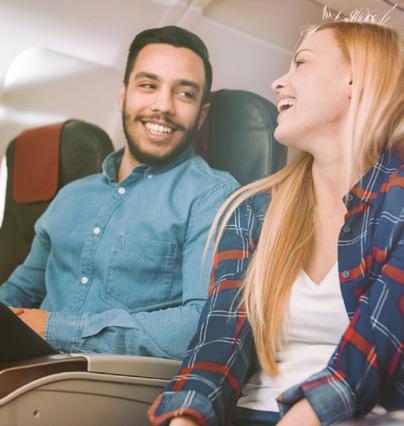
including a secret pocket, and a bigger, easier way to open it up. It’s accessible, stylish - and a perfect accessory to take with you when you go out travelling.
The Disabled & Proud podcast is also another ‘must’ for anyone to listen to, especially if they would like to delve more into disability, what it means, and the wealth of experiences between people.

Visit multi-award-winning WWT Slimbridge this summer. A visitor attraction leading the way as one of the most accessible and inclusive attractions in Gloucestershire.
Get up close to the world’s rarest goose, flocks of flamingos, marvellous mammals and amphibians from all over the world.
Wheelchair-friendly summer highlights include exploring the Summer Walkway down to the banks of the Severn Estuary and spotting rare wildlife on a Wild Safari.
Gold Accessible & Inclusive Tourism Award winners, WWT Slimbridge, has its own Changing Places Toilet, mobility scooters and wheelchairs for hire*, along with accessible pathways and sensory experiences.
Make memories in a wetland paradise this summer.




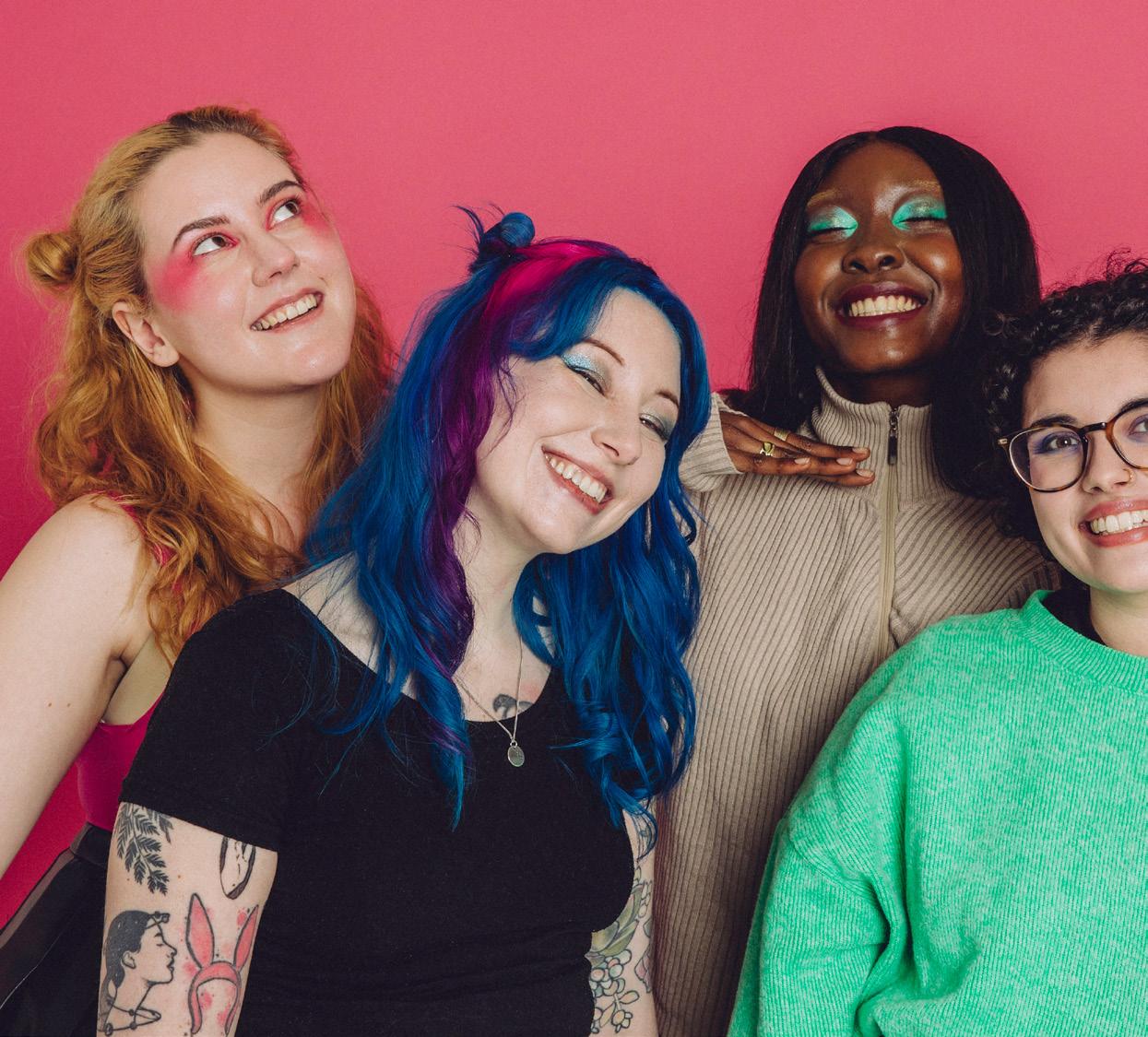
When it comes to travel, sometimes we all need to take cosmetics with us. DRM meets Millie Flemington- Clare, CEO and founder of Human Beauty, a new & accessible beauty brand.
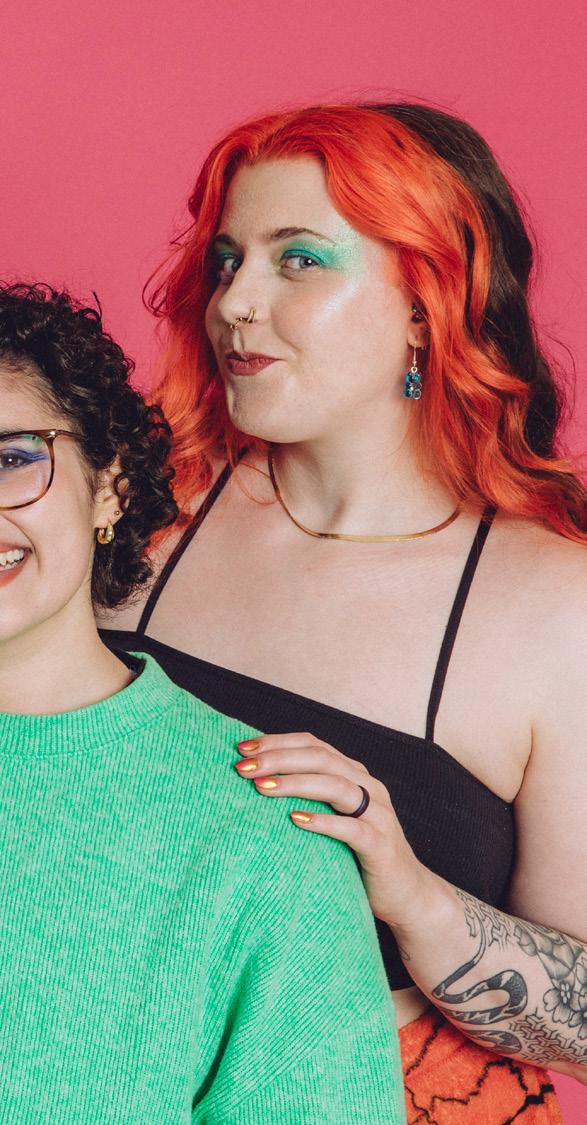
Qat the time. And then it became more of a frustration with the industry for the lack of representation and this, kind of, pushing of [an] ideal perfection, which is just [based on] unrealistic beauty standards and kind of a very toxic industry. On YouTube, it was all drama and nothing positive - [this] was what I was seeing back in 2016. So that was kind of the first spark was my passion and seeing the lack of representation.
Then I did a placement year. I studied digital marketing at uni. I did a placement year in product development for a big beauty brand. So that really, really ignited my love of product and developing product even more. And that’s kind of when I was like, right, I’m going to do this myself.
And that’s kind of when I was like, right, I’m going to do this myself.
What was the impetus behind setting up Human Beauty and what was it that sparked your interest in the beauty industry?
A I grew up with a rare condition that [has] affected around 2000 people worldwide and makeup was something that I just, I really fell in love with. I loved the beauty industry, YouTube and you know, as a 15, 16 year old girl, it was part of my way of kind of fitting in, I guess. But I did then start realising that actually, I didn’t want to fit in and it was more difficult for me to be, trying to keep up with my friends and trying to fit in, whatever that means. So then makeup became a form of self-expression and almost a bit of a rebellion against what fitting in meant.
So at my GCSEs, I dyed my hair blue, despite all my friends telling me I couldn’t rock blue, but my best friend could. That was the kind of friends I had
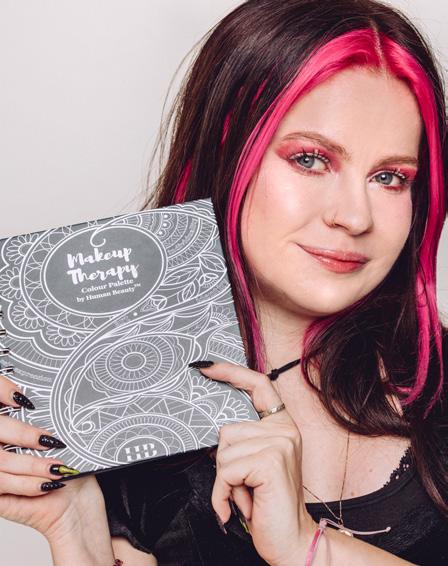
Q And what’s the inspiration behind the name for Human Beauty?
AWell, when I was trying to think of names, I thought of all sorts of names over the years, because this has been something I wanted to do since I was 15. It came down to that everyone’s human and human is beautiful.
And the fact that what makes us unique and our quirks make us human, but they’re also what make us beautiful. So that’s kind of where the name came [from] and the tagline followed, perfect is boring and human is beautiful. Yeah, kind of trying to push against those, that idea of perfection and actually just being human is beautiful enough.
QCan you take me through the range of products and the related accessibility features?
ASo the first two products I launched were our liquid confidence mascara and our makeup therapy palette. So our liquid confidence mascara. There’s a few things that make it accessible. It’s square and that is such a simple thing. But if you look on the market, most mascaras are round or cylindrical. So if you knock it over, it’s going to roll on the floor. Whereas with our square one, if you knock it over, it won’t roll onto the floor or roll away. It’s matte. So it’s kind of, it’s got grippy texture and the end has kind of a slant to it. The end you open it. So you can know which end is the opening end and which is the kind of tube. And then finally, it has a pretty unique wand. It has a ball shaped tip to it, which means that you can apply mascara in any direction, which [is accessible] for people who have like severe reduced mobility.
eyeshadows are just dotted wherever looks nice. Whereas we’ve got all of our mattes in one line, all of our coloured mattes in one line and all of our shimmers in one line. And I’ve tried to organise them from light to dark as well. And then all the names are inspirational.
And then on the back, it has a QR code. For those who are visually impaired and blind, you can scan it and it takes you to an audio description. So it’s a YouTube video. So people who are sighted can watch it. And it’s where I swatch each shade. But I also describe what the palette looks like, how you open it and every colour in detail. So I’ll say, you know, community is the top left. And it’s a matte, deep orange, for example, which is helpful for those who can’t see. But also we’ve had people who say they’re colour-blind. And when their partner isn’t around, they can’t tell which is blue and which is purple, for example. So that’s the biggest thing.
I don’t know of any eyeshadow palette that does anything like that. And when designing it, I looked into Braille, but actually only one in 10 blind people read Braille. So it’s actually not that accessible because technology has taken over now. So a QR code was kind of the simplest way that I can bring that type of accessibility for visually impaired customers.
I don’t know of any eyeshadow palette that does anything like that. And when designing it, I looked into Braille, but actually only one in 10 blind people read Braille.
So I had a model called Emma who can’t do the typical horizontal brushing motion. I think applying mascara in a vertical motion with the ball allows you to separate your lashes and get kind of closer to the root. So it’s not only accessible, but it’s also better for application in general. And then our makeup therapy palette was designed, it looks like an adult colouring book. It’s like a ring binder. And it’s designed, it has like a kind abstract eye design with hidden words in it, inspirational words.
All of the shades are kind of in an order that makes sense. So most eyeshadow palettes, the
Then we have our blush stick,

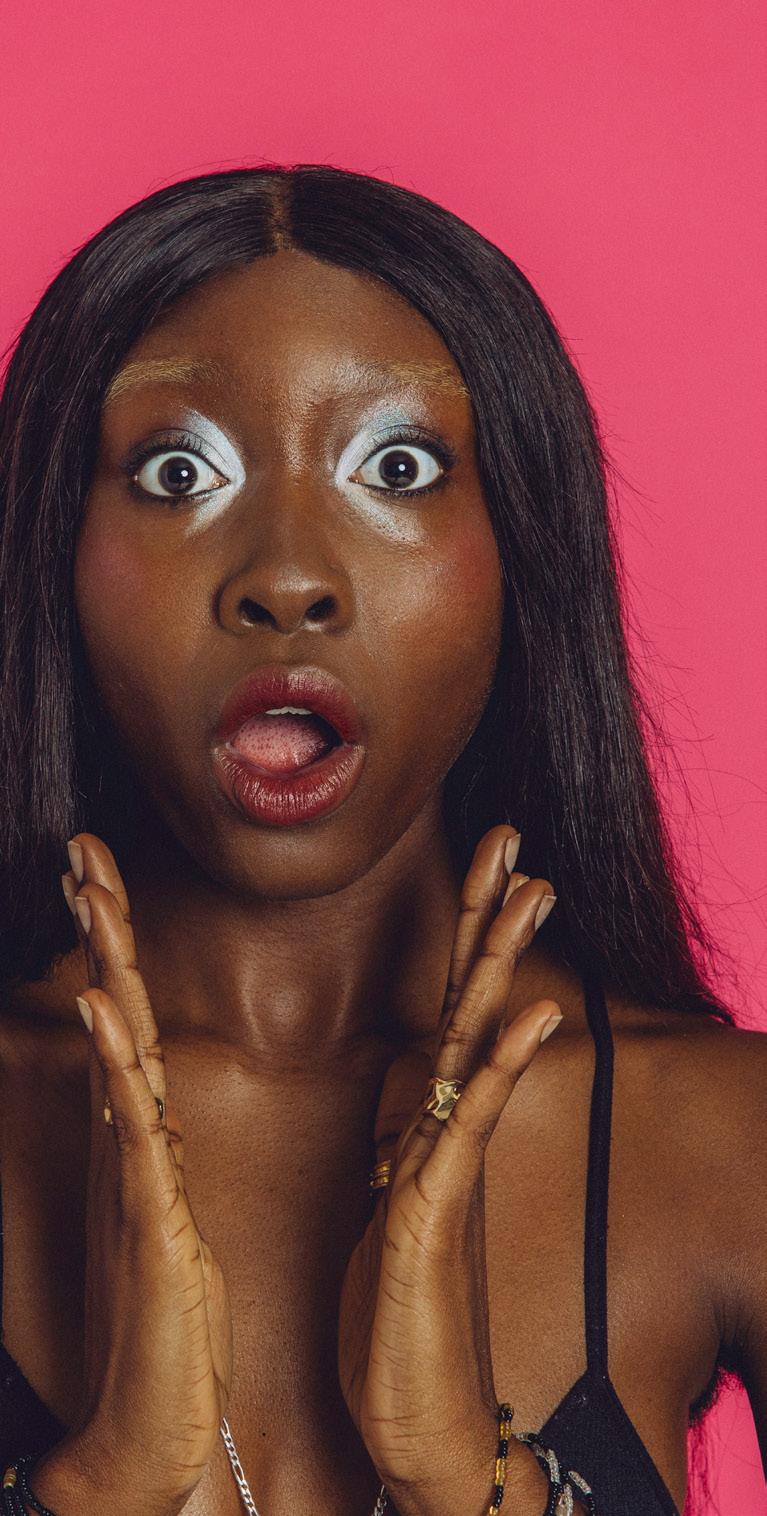

of Neurodivergent people test it who are sensitive to smell or taste and they like it. It’s good for sensitive skin.
QWhen it comes to mainstream design, what is the one thing that you want to see mainstream retailers do more of in terms of being accessible?
Awhich is firstly, it’s in a heart shape. So again, it’s distinguishable. So if it’s in your makeup bag, you know which that one is, because a lot of things feel the same. It also won’t roll away when you knock it over. It’s a two in one product. So you can, well, I mean, you can put it on your eyes if you want, but [it’s for the] cheeks and lips. It’s also super blendable. So you don’t need to use brushes or tools if you don’t want to. You could just use your hands to blend it out. It’s good for sensitive skin. And it also comes in 10 shades. So it’s inclusive in terms of shade range as well.
And then we have our You’ve Got This! lip oil. So this is in a square packaging again. So if it’s knocked over, it won’t roll on the floor. It’s lightly scented. So we call it sensory friendly. We’ve had a lot
So in terms of what I’d like to see from mainstream retailers, I’d like to see them hiring disabled people like me who have a consultancy because it’s all well and good designing products and saying they’re for disabled people. But you can really, really tell when they haven’t actually involved disabled people in the process. I’d like to see brands showing a commitment to doing better.
iAt the time of going to press, Human Beauty launched their new eyeshadow & highlighter palette, Match Your Mood. Designed with Autism Acceptance Month in mind, 30% of the profits will be going to the Heart N Soul charity.
WEB: humanbeauty.co.uk
INSTAGRAM: @humanbeautyldn

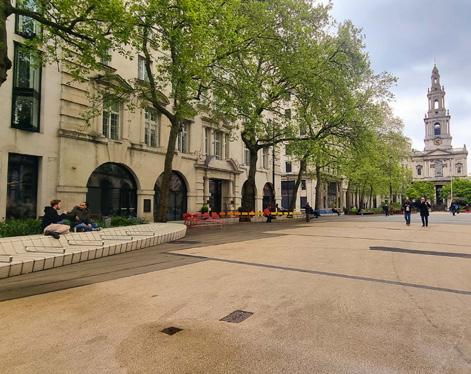

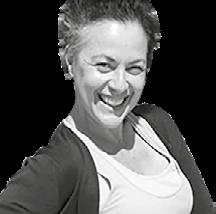
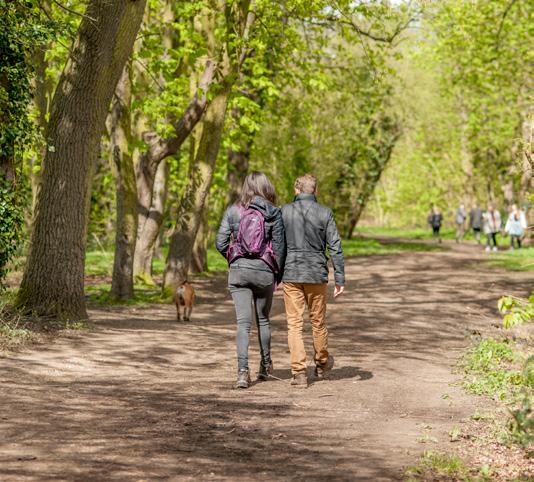

In her first travel column for Disability Review Magazine, Carole Edrich gets lost in London and takes us through her favourite landmarks.
To be lost is to be fully present, and to be fully present is to be capable of being in uncertainty and mystery” wrote Rebecca Solnit. I love getting lost, and thought that sharing how I do that in my home town of London would make a good start for my new column. It’s a big place. Ten million people speak 300 languages here and there are more ways to get lost than can possibly be counted.
Canary Wharf is a super-accessible place, full of declarative buildings, interesting businesses, muddling malls, extraordinary eateries and so many people. There’s lots to do here and I go to the annual light festival, live jazz and outdoor film screenings. People watching is immersive here, they rush around, intent on what they’re doing. There are seats aplenty (great for ME flareups), lots of security guards for when I need directions and Boisdale hosts great live music for special occasions.
Badini
Gelato is one of the few chains my Italian relatives like visiting.
When not well enough to travel I look for equivalent experiences. Paro, a resturant in theatre-land, is one such place. A gastronomic ode to Calcutta, it’s all sumptuous tigers, hanging plants and happy colours. There’s so much more to explore nearby in Covent Garden, the restaurant is wheelchair accessible, and staff spoil my friend’s toddler. Paro’s children’s menu includes chicken nuggets made out of proper chicken breast, and adults can get lost in the rich flavours and textures of food served in dark, artisticallyshaped bowls. Try the korma, the Brick Lane Biryani and the Dadi daiquiri and ask for a table that will allow you to people watch through the huge street-level windows. paroindian.com
Badini Gelato is one of the few chains my Italian relatives like visiting. Their new corner shop in Cabot Place is minutes from the Jubilee line, and its comfortable seats make it an ideal place to recharge. Sticklers for the old gelatomaking traditions, they change their flavours according to the season. Boisdale.co.uk , Badiani1932.com
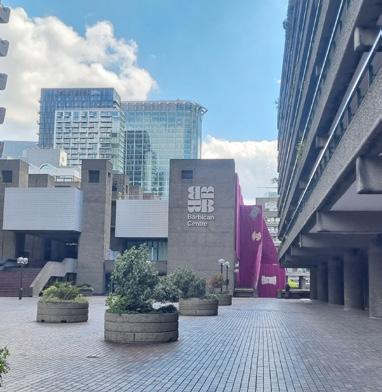
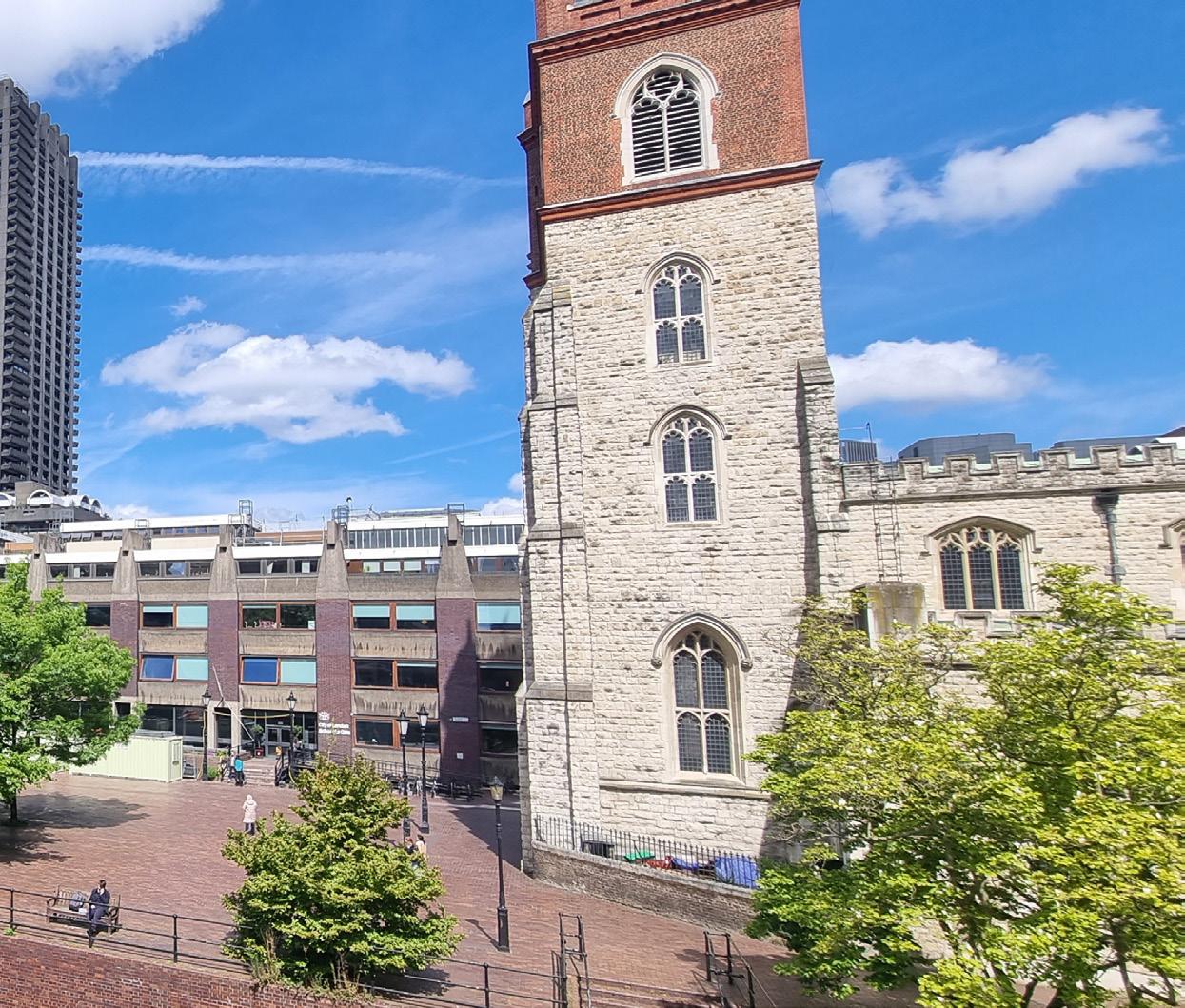

Walk from Paro towards Somerset House and you’ll come to Bush House at the junction of High Holborn and the Aldwych. It’s probably the best place for motion blur photography of London buses. Somerset House is a huge neoclassical complex that overlooks the River Thames. There’s a trendy al fresco bar on the embankment side, and a lovely Georgian quadrangle on the other. You can walk from quadrangle to Thames in about 30 steps, yet still get wonderfully lost in the side corridors, especially if on wheels and looking for a short cut from the quadrangle to bar (we’ve never found one). The quadrangle has an accessible café, summer fountains, festivals, galleries and installations. Before the pandemic we found a totally inaccessible bar too, although it might have been updated since. Avoid at all costs during London Fashion Week unless you like queuing, crowds, tempers and restricted access. somersethouse.org.uk
and takes up a whopping 5% of the city of London. Its eclectic style of brutalist-but-friendly architecture is madly photogenic as most people know after Harry Styles’ video for “As It Was”.

The Barbican has the type of programme and all the accessible options and relaxed screenings that you’d expect the largest performing arts complex of its kind in Europe, along with cocktail bars, places to eat, drink, rest, and hog the wifi. I’d recommend their curated exhibitions or the resident hip-hop dance theatre Boy Blue Entertainment. It’s close to public transport with good parking. Everyone gets lost here, but the stewards can help with directions. Barbican.org.uk
The Barbican Centre
I used to love getting lost around the Barbican but sadly know it too well now. It has more than 80 entrances, over 130 different types of residential apartments, was built on a bomb site
Elondi (East London Dining, get it?) serves light, complex, superbly fresh food in perfect sized portions. A little haven in the madness, it doesn’t feel East End-ish at all. I love pretending I’m elsewhere in the subtle stylish elegance of this restaurant. You can find it in the Hyatt and you’ll love its wheelchair-accessible light airy bar, open air terrace and warmly helpful staff. Westfield feels too mass-
marketish for me, but everyone else seems to like it. https://tinyurl.com/ elondi
For a while you’d have been forgiven to think I lived at Sadler’s Wells. One of Europe’s premier dance venues, it has an amazing programme, and is very accessible, although you might have to ask for directions to things like lifts. It does really cool touch tours, audio described performances, has a disabled artists development program, and the nicest loos are the wheelchairaccessible ones. Sadlerswells.com
As a child I’d get lost in Wanstead’s local green spaces. I have great memories of playing on the swings, along the rough paths of the bluebell woods and in the rushing River Roding. As I got older, I liked that it was easy to escape, being conveniently near to Stansted, Southend and London City Airports. Now I like Wanstead for the community, the coffee bars, the urban beach by the pond at Whipps Cross, and for nearby wheelchair accessible and less muddy paths around Hainault and Epping Forests. When I’m not getting lost in foreign climes, you might still find me working at City Place Café. It is Wanstead’s only fully wheelchair accessible café (although other places are partially accessible), with great facilities for children, lovely staff, food and reliably good coffee.
When I’m not well enough to get lost, even in London, I think of what Marcel Proust wrote; “The real voyage of discovery consists not in seeking new lands but seeing with new eyes.” I prefer to do both.
AUTHOR: Carole Edrich, photographer, journalist and board member for Unlimited
FACEBOOK: CaroleEdrichPhotography


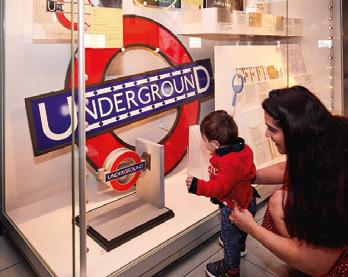
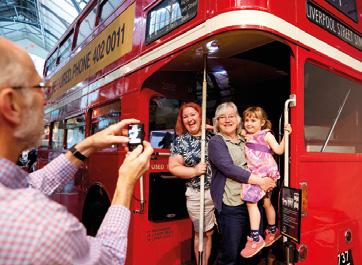
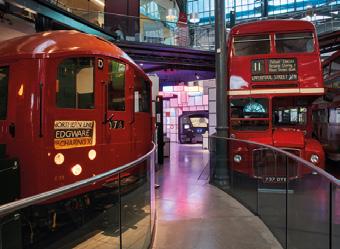
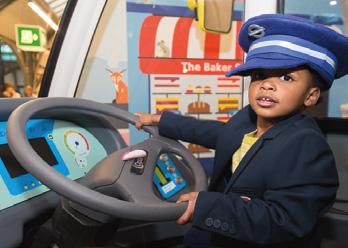
“THIS WAS A PROBLEM THAT AFFECTED ALMOST EVERY DISABLED PERSON I LISTENED TO.”
AccessAble is the largest provider of accessibility information in the disability space serving over 6 million people in the last year alone. Our editor, Lydia Wilkins, talked to founder Dr Gregory Burke about their new offering.
QSo first of all, can you tell me about the portal and what was the impetus for the new offering from AccessAble?
AFor many years, we were faced with the challenge of how do we get Detailed Access guides for venues which are not part of national chains, or who are not part of a local authority that have commissioned us. Because it was just too expensive to ask Bob and Pam’s Bed and Breakfast in an area that we haven’t covered to pay our surveyors to come over and survey in person. To cover off the travel time, the costs of travel, then to do the survey, then the costs of return back to the office to then produce a guide. And we fundamentally disagree with selfassessment for accessibility information
because so many disabled people have said to us, and we know it from our own experience too, that when we go somewhere which somebody has selfassessed, very often it’s a profoundly negative experience.
The core of all of our endeavours is the recognition that every person has an inviolable dignity.
What we found is that the information in self-assessment is just unreliable. It’s not detailed enough, not consistent enough, and it’s not trustworthy enough. So, we were facing this problem for a long time, how can we conduct a surveyor led survey at a price which small tourism operators can afford? But during the pandemic, we all got used to using video technology to communicate. We were doing some work with TUI, a travel company who wanted to have AccessAble guides to lots of their hotels and properties in their portfolio. And together we worked out a way where we could use


every venue is assessed by a surveyor.
The Your Accessibility Guide portal will guide you in what the correct survey method is for your venue, be it a guided assessment done remotely or a survey on site. In less time that it takes to make a cup of tea you can get a price for your survey and arrange it for a time that suits you.
Crucially, let me say this, a venue does not have to be ‘wheelchair accessible’ – whatever that means - in order to use the Portal. What is suitable for one impairment might not be suitable for another. Our mission is to put the information neutrally as to what a person will find when trying to access a venue, and then it’s over to that person to decide whether the venue is right for them.
The development of the Portal is so important because we’re able [to] open up a whole range of venues for disabled people
video technology whereby the expertise of our surveyors could be used from our own head office.
And whereby the people on the ground would be the eyes and ears of the surveyor using video technology, but we retain the expertise. So that the person at the tourist venue – the pub, the café, the museum, the shop, can go around with a tablet, showing with a camera what they can see. Our surveyor is in their ear, literally talking to them as they go through, just stop here and round to the left. What’s that? Take a photograph of it. Take a measurement here. What’s that surface there? And AccessAble are then able to construct a guide remotely. This is far more cost-efficient than sending a surveyor there in person.
It doesn’t work for everywhere because the more complex a venue is, then you actually need a surveyor to go and do it. But for certain types of venue, it’s a really, really good option. And crucially, it sticks to our philosophy that
The development of the Portal is so important because we’re able [to] open up a whole range of venues for disabled people learn about and to use, which we wouldn’t have been able to do sticking to a model of whether a venue is part of a national chain that has commissioned us or a local authority who has instructed us to do a local area. So, it’s a fantastic step forward for businesses everywhere who want to welcome disabled people, their families, carers and friends and for disabled people who want to go out and enjoy themselves!
QYou have alluded to self assesment, and from talking to you previously, I’m aware that AccessAble came about due to a chance encounter with the internet. Do you think that the internet is a tool for good in dismantling inaccessibility?
AUnquestionably, it’s for good if it’s used in the right way. There are still websites and services and offerings that are conveyed online that haven’t listened to what disabled people need and haven’t built in accessibility.
And they are stymying their own efforts by doing that. But on the other hand, you do have services where people are trying to be as accessible as possible, to be as inclusive as possible. We certainly couldn’t do AccessAble without the internet.
Q Can you take me back to the start of AccessAble and the origin story?
ATo give you the absolute sort of bare bones of it, I was a disabled student at university and the internet in those days, we’re talking about the late 1990s, the internet was coming onto the scene, but the internet access was in the basement of a building in my college. So I didn’t get to see it for two years and everybody was talking about the internet and talking about how great it was. I knew nothing about that at all!
My college then put the internet into my room and I saw it and I thought, wow, this is absolutely wonderful. Then shortly afterwards, I was trying to get into a building where the door was too heavy. As I opened the door, I pulled my shoulder out and I had to basically lie very still for about two weeks or so. And I was just thinking things over in my mind about how it was so difficult to find places that were accessible and just being forewarned could make such a difference because if I knew about that door, I would never have tried it, I’d have brought someone with me, for example. And marrying that with my recent experience with the internet, I thought this could be something that could be a real game changer.
We could perhaps provide information like this. I then started this consultation of 100 groups of disabled people all across the country. Why is it that we’re not more visible in society? What’s holding us back? And what came back from that study was, number one, society is generally inaccessible, but two, in a generally inaccessible society, there could be venues and services which are accessible to my own individual needs or your own individual needs if only we knew about it. And that accorded with my own understanding. And that was really the genesis moment, the crystallisation that this wasn’t just a problem that affected me. This was a problem that affected almost every disabled person I listened to.
QIn that respect, what do you think it is that organisations need to change, particularly in the sense of accessibility and accessing their venues or how to get to them?
AFor AccessAble, the core of all of our endeavours is the recognition that every person has an inviolable dignity. No matter what they look like, what impairments they have, what job they do or don’t do, how much they earn or not at all, every person has an inviolable dignity. And it is our work, our mission, to ensure that that dignity is respected and not transgressed in a way that diminishes the dignity of everybody. Because we firmly believe that when one person’s dignity is transgressed, then all of us, humanity, degrades itself. I’m not talking about puffed up dignity that has self-regarding pride at is core. But rather that each person is precious, has an inherent and irreducible value which is to be respected in all aspects.
With Rights On Flights, that’s a wonderful example of essentially saying, look, at the moment, you are not treating us with any sort of dignity. And that is morally wrong. It’s commercially wrong. It’s legally wrong. And you need to do something about it.
So AccessAble fits entirely into that tapestry because we’re saying is: where is the dignity in going on holiday somewhere and rather than enjoying the experience of being on holiday, you’re worrying about, will I be able to get in? Will I be able to get around? Will I be able to get to the toilet? Will I be able to have a place where my assistance dog can gain refreshment, for example?
All of those myriad of worries disabled people carry around and have to problem solve continually all the time. And wouldn’t it be appropriately dignified instead to go somewhere where you don’t have this list of continual worries but rather, by beautiful contrast, you could just enjoy the experience of where you are going to?
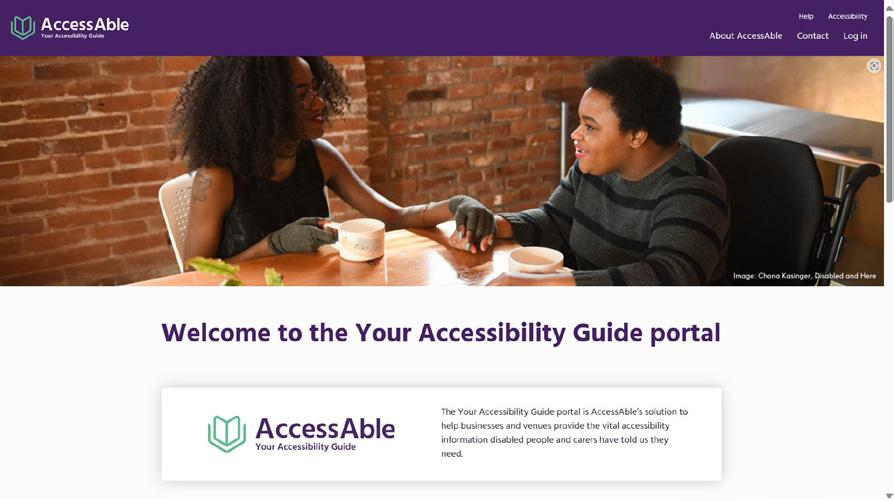



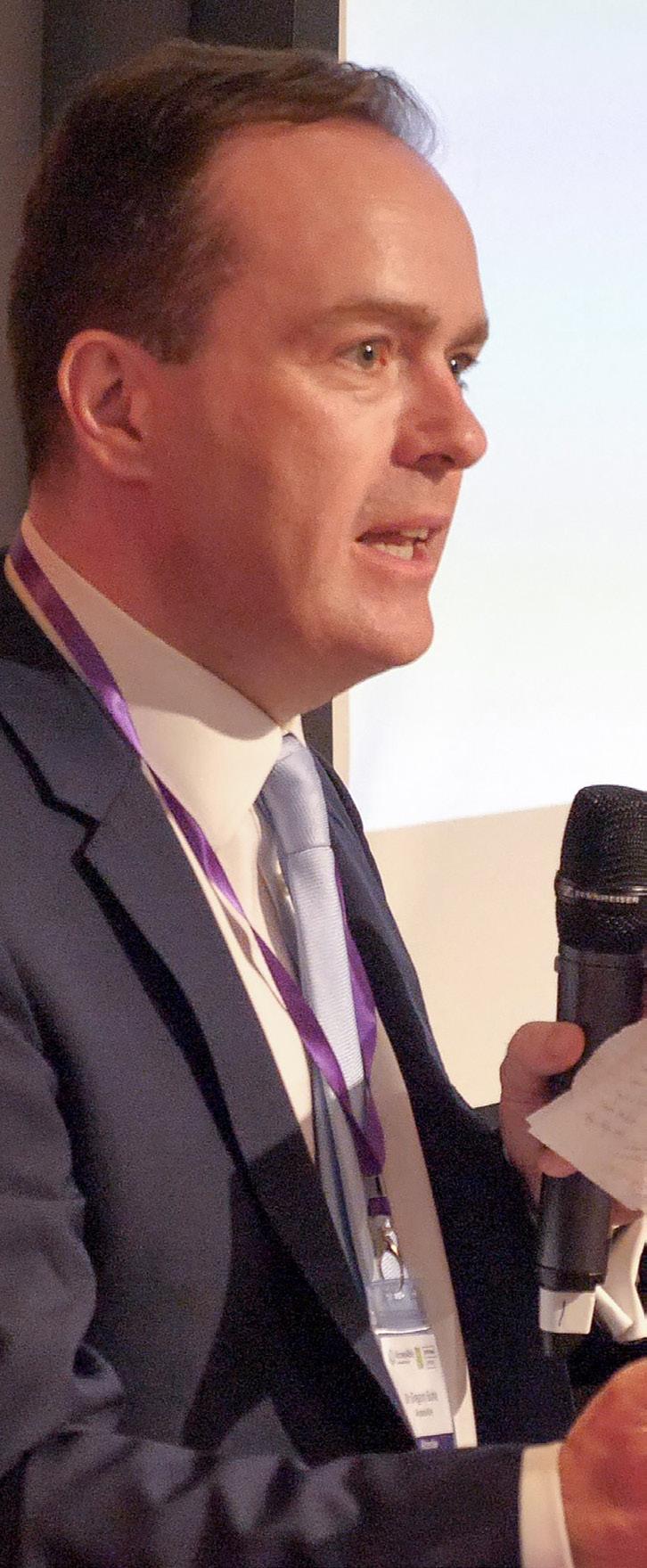
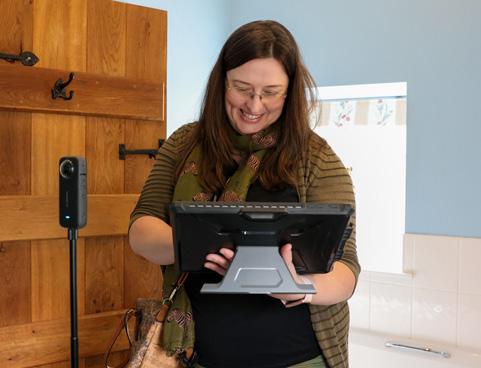
of life. What we’re trying to do with our work in the holiday area is to ensure that [a] holiday which has probably cost you a small fortune, no matter who you’re going with, is one that you really enjoy and you get the most out of, and your family, or whoever you’re with, gets the most out of it too.
So what should businesses do? Well, just as any business needs to put down the address and the contact details of their hotel, café, bar, museum, art gallery – whatever - they should have access information too. It is so basic. The need for this information has been pressing for a long time. What you don’t want to do, as a tourism industry is to force anybody with an access requirement to say, actually, it’s too much hassle. With an ageing population and its link with increased impairments, a narrative that says “disabled people aren’t welcome on holiday” would be tremendously bad for business.
We firmly believe that when one person’s dignity is transgressed, then all of us, humanity, degrades itself.
Our work - throughout everything that we do - whether it’s the NHS, the local authority, businesses, it’s about taking away that anxiety, that debilitating worry, so that you can concentrate and be in the moment for what you are there for. Going on holiday is such a valuable opportunity to refresh yourself physically, emotionally, mentally, to reconnect with those that you love and to reconnect with things that you’ve loved but may have forgotten about in the grind
People who manage venues need to tell us how to get around their space. Yes, the entrance to a building is obviously vital. But there’s a world beyond the entrance. Tell me what the access is like there. Who goes on holiday to stay in the lobby? There’s a world beyond the entrance, Lydia!

Visit YourAccessibility Guide.co.uk to find out more about the service and how to get involved.
Travel is a part of entrepreneurship; for this issue we talked to business psychologist Lee Chambers. He is the founder of Essentialise Workplace Wellbeing, which looks to make well-being in businesses more inclusive, accessible and equitable.
When I wake up, I start the day by… stretching my legs. So I have an autoimmune condition and every morning I need to do a set of stretches before I get out of bed. And that’s obviously something that people never see. But it’s really important for my mobility to do that.
When it comes to the morning half of the day, you can find me… You will generally find me either taking my children to school or going into my office where I work on my own and have my own setup that’s designed
especially to give me some creative energy and a chance to do the day to day tasks that keep my business running.
The setup of my office is quite small, but it’s designed in a way that allows me to not be... It’s temperature controlled for my own thermal comfort. There’s not a lot of windows. I have a window strip across the top so I can control the lighting and there’s elements where it’s kind of soundproof as well. So it’s just... It’s a positive sensory environment. It’s quite neutral in its colour, but I’ve decided to put some kind of little coloured accents in that give me a little bit of energy and


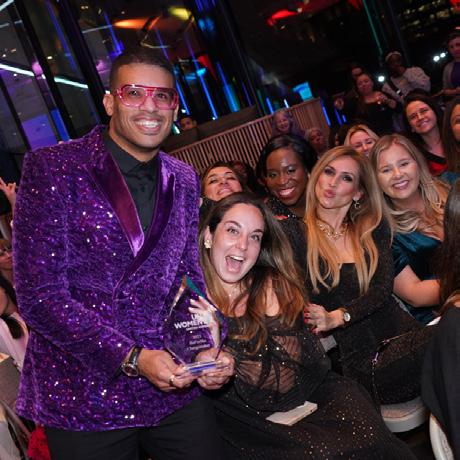
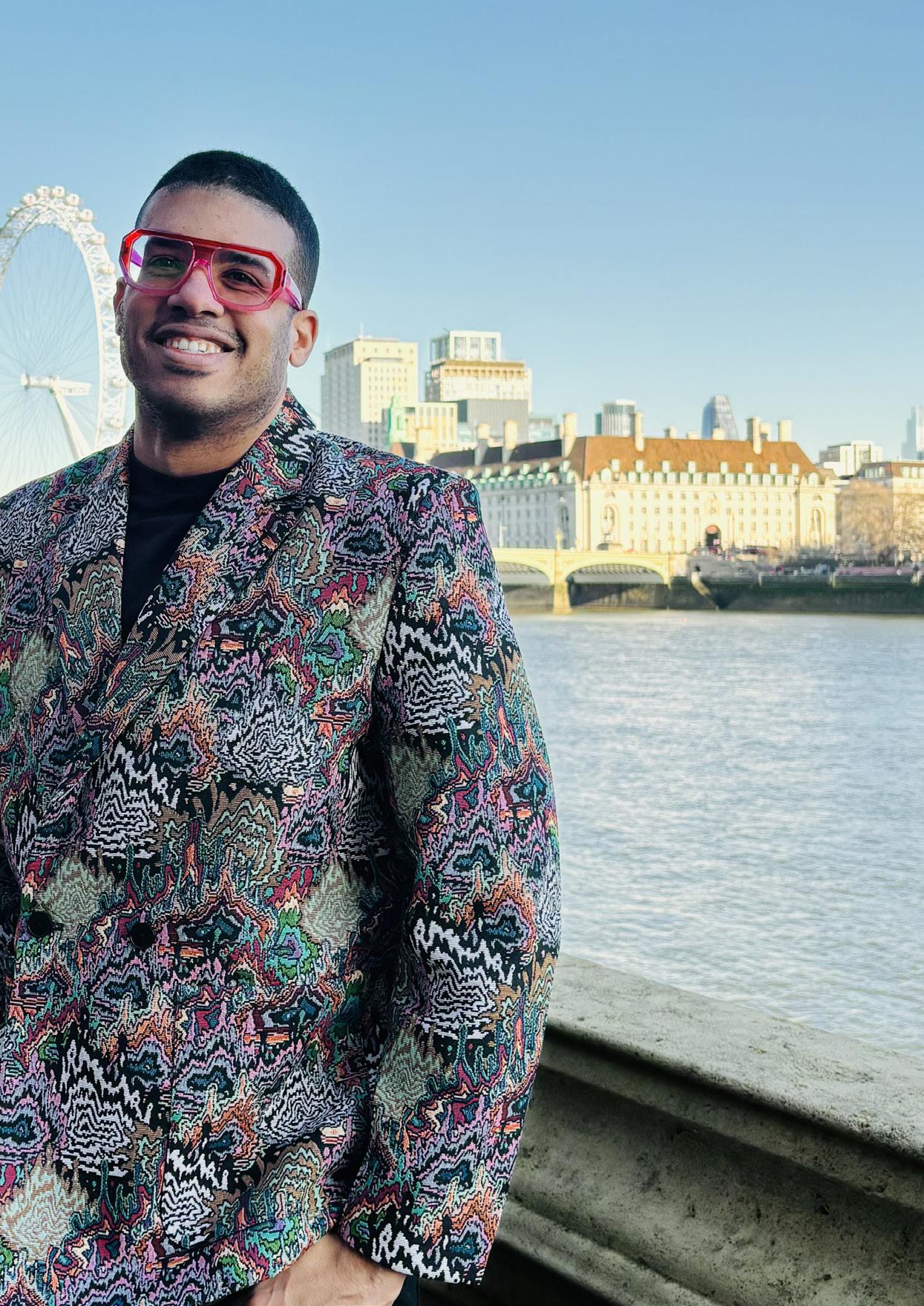
I have to give myself time to pack as well. I have to be very methodical in how I pack. One, because I can easily forget things that I need.
a little bit of variety in my perspective. But probably the most important thing is it’s a space that I’ve adapted for myself to be able to ensure that I keep myself... I keep creating opportunities to move so I don’t get too stiff and it doesn’t become too overwhelming from a sensory perspective.
it comes to travel, I need time to adjust.. Travel for me is interesting because I drive, but I struggle to drive really long distances. So I do quite a lot of travel
on the train and that experience can be very variable. So I have to personally prepare myself that things might not go the way that they are planned to and give myself some forgiveness for things changing. I have my headphones which help me regulate some of the noise[s] on trains, which is helpful. Again, I try and book seats in a certain place to be able to create some regularity with things, even though it is unpredictable.
But I suppose in some ways the power of the train is I can go ‘low battery mode’ on a train, whereas when I’m driving, I’m constantly on that ‘high battery mode’. So it gives me more spoons on the other side, even when sometimes it’s very unpredictable and doesn’t go to plan. But I have to give myself bigger time gaps so things don’t become too stressful. But I find it easier to get the train for any really long distance travel because for my work, I do quite often have to go to London or come to the south.
I have to give myself time to pack as well. I have to be very methodical in how I pack.
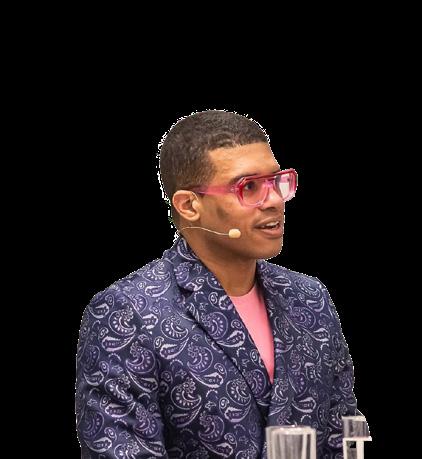

One, because I can easily forget things that I need. And secondly, because I like to wear colourful clothes and that takes a bit of synchronisation.
It’s being aware of your own kind of stresses and knowing them. But I feel grateful because I run a business. I can create the structures around me. I have most of the control, which is a big privilege, right?
Because some people are told, well, you need to go here now or this is where you’re working today, off you go. I’ve actually built an ecosystem around me to support me with the things that I struggle with. But sometimes I think that’s why many people who are neurodivergent decide to try and build their own thing. So you can create your own support network that allows you to really do the things you’re good at and offer you lots of support with the things you struggle with. But it’s like, you end up... You’re in a lucky place if you manage to do that and it works because the world is still... Yeah. The world is still starting to understand and get a handle on the fact that, oh, everyone’s not the same.
My access needs are… So I think, like, I’m in quite a lucky position that after having to learn to walk again, I currently have quite good mobility overall. I can access pretty much everywhere I’ve tried recently. And I think that when you’ve really struggled with that, again, you
become very, very grateful.
I think some events or some spaces have really poor acoustics. And that presents challenges because it drains your batteries really quickly. But I think the one thing, like, because I obviously do public speaking, which is really interesting because people are like, oh my God, you’re autistic, but you do public speaking. That sounds so weird. We thought you’d want to be behind the scenes, not on the stage. But there’s something really powerful because when you’re speaking on a stage, I don’t need to read the body language of one person or speaking to and really intently listen to them and try and pick up all the cues and the nuance in what they’re saying. When you’re on a stage, you can take your time, listen to your own voice. I actually find it easier to speak on stage to a thousand people than to stand and talk to one person on their own, because listening takes lots of energy.
I am so grateful to be in a position that I’m in and have the opportunities that I do. Sometimes people don’t always appreciate some of the little things that could make a difference. But having been on a real journey with this at the minute, my access needs are lower than they have been. And yeah, but having had that experience makes me consider the access needs of everyone else.
Travel for me is interesting because I drive, but I struggle to drive really long distances.

In the afternoon, you can find me... The afternoon is to just create a bit of space. And that’s space for reflection and space for learning. Obviously, I think it’s important to note that the nature of my role is varied. So no two days ever look the same. But I do need to find some time in the afternoon to just regenerate and plug back in. So I’ve got the energy to push on in the late afternoon and then have time in the evenings to engage in things that I enjoy.
Sometimes I do actually go to the gym in the afternoon, which sounds counterproductive. But actually in the gym, I don’t have to do any work or speak to anyone. I can just go and move my body a bit and look after myself. The gym I go to luckily is quite quiet and it’s a pleasant space. So I can go there and I don’t take my phone and I don’t really speak to anyone unless I’m spoken to and you know, I don’t really know anyone there. So it’s a good place for me to just hide in the shadows and move my body a bit and charge my batteries. And sometimes I might go for a walk to just clear my mind and kind of again, be grateful that I’ve got that ability to move in that way. So I recharge a bit and then go again in late afternoon to do more stuff.
I’m in quite a lucky position that after having to learn to walk again, I currently have quite good mobility overall.
Lee Chambers can be found on LinkedIn, as well as at essentialise.co.uk
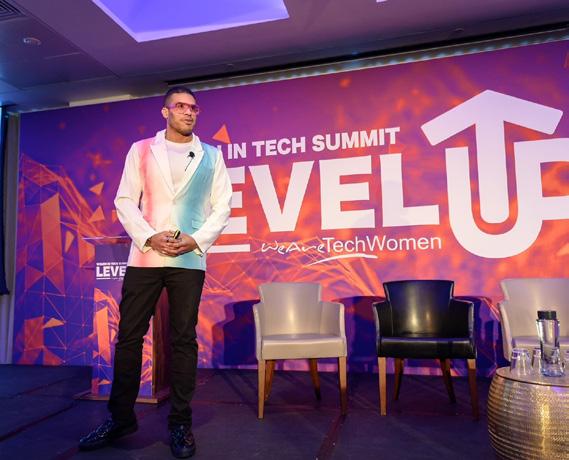

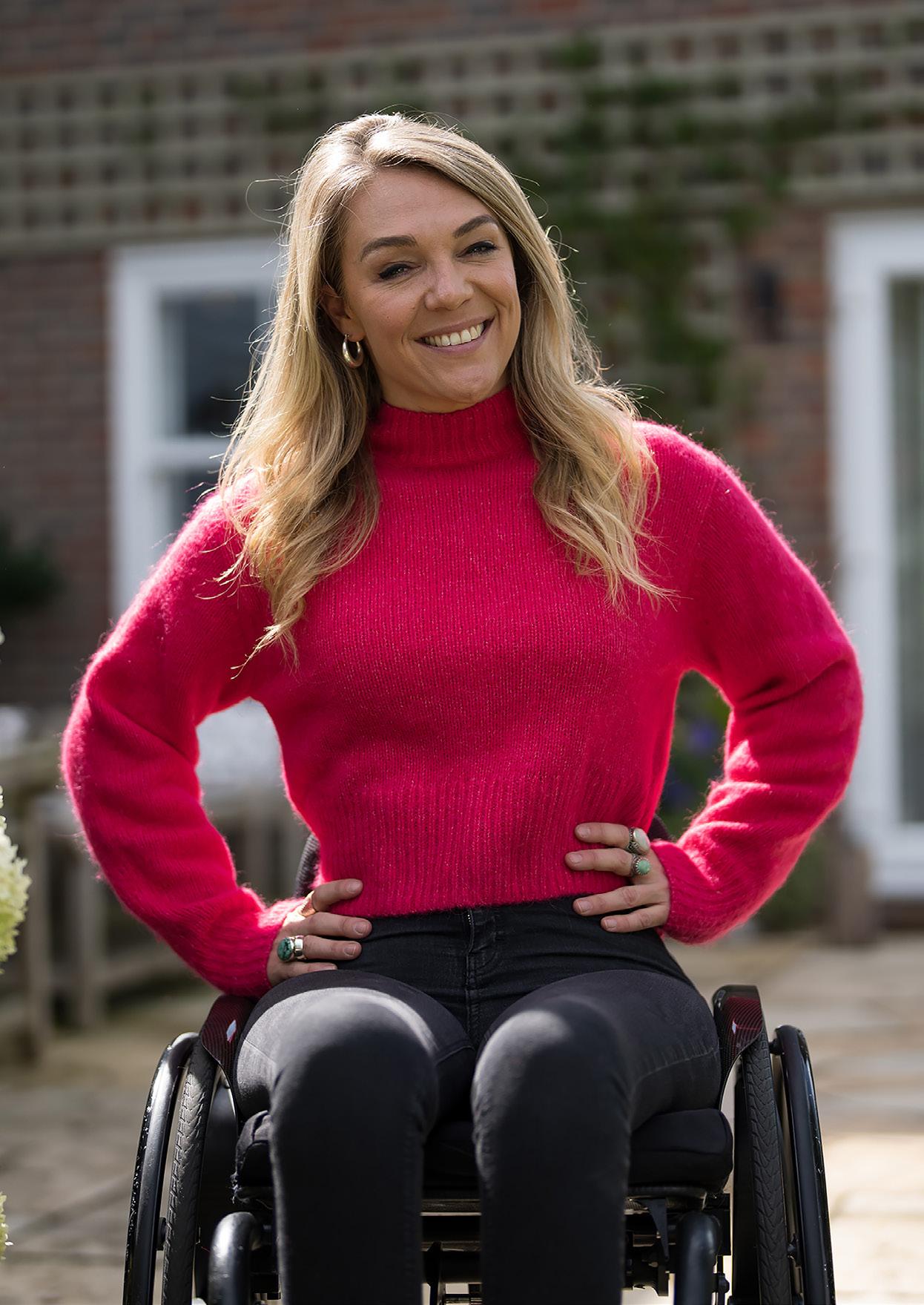
Wheelchair users too often have their mobility equipment destroyed by airlines when traveling, & often document the fact in viral online postings. DRM meets Sophie Morgan, the woman campaigning to change that.
What is the point that suggests to a person that, well, enough is enough?
Sophie Morgan holds a multiplicity of titles.
She is a TV presenter, producer, author, artist - but it was a single moment last year that sparked her latest venture, #RightsOnFlights.
An organisation campaigning for the dignified treatment of disabled people on all aircraft types when it comes to travel, she told us about the moment of when enough is truly enough.
“So it was almost a year ago, so it was February, the beginning of last year, February, when I landed into Heathrow and basically as is the process, when I got to the side of the plane and I was reunited with my wheelchair and the attachment that I travel with. Basically, British Airways have put it, for some reason, [they] decided to
What is the point that suggests to a person that, well, enough is enough.
reassemble the two parts, despite not knowing how to, and they did it wrong. And the only way they could get them apart so I could get back into my chair was to break them apart, which meant sort of manhandling, stomping on them, unscrewing them, all this stuff.
“And I was just sat there watching, absolutely like mouth open, like, it’s my legs that they were effectively standing on. And it was just so frustrating. But the thing that kind of added insult to injury was they didn’t really handle it very well.”
A recurring story, too often, is the indignity of which airlines treat disabled individuals across the world - be it wheelchair users having to crawl to their seats, others having to not drink due to not being able to access a bathroom, even invasive questions. Yet, reform or regulation has been slow coming - with redress often being extremely limited.
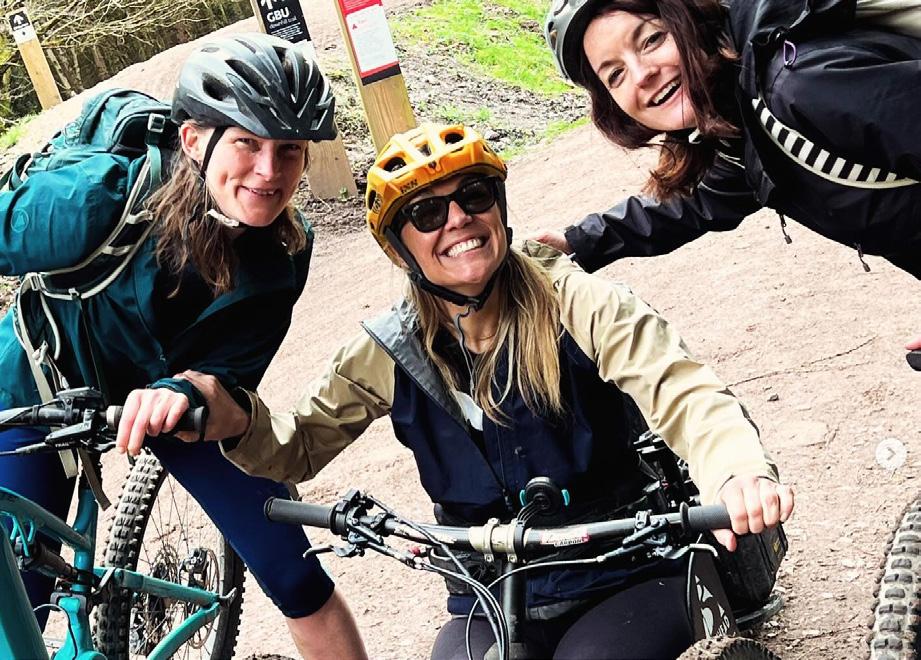
Loose Women gave her the space to talk about the impact - such as in having to advocate agency on a plane, having to dehydrate yourself and not eat to avoid an inaccessible bathroom.
Morgan had seen similar experiences happen to friends of hers, leading to something of a cumulative impact: “And I just thought, you know what, enough is enough” said Morgan, noting her experience had happened to other people, and that this was the moment that she wanted to do something about it.
Previously a presenter on Loose Women, the show had given her the space to advocate agency on a plane, before having to dehydrate yourself and not eat to avoid an inaccessible bathroom. Wheelchair transfers are not always possible, too. An SNP MP saw the segment - and asked how they could join forces. In discussing her approach, Morgan makes a key point: “The articles or the focus is on the problem, never on the solution. And I was so bored of seeing - not bored, because that sounds like I don’t care. I was so upset with seeing disabled people constantly being left on board flights or dragging themselves along the floor or whatever it might be.
“And the articles kind of come up. They get a lot of outrage and shock, we get rolled out to talk on news
channels about it. But it fades away. And nothing changes. In fact, what I noticed was, by the feedback I was getting on social media, is that the impact of these news stories is not that the airline changes or does better. It’s that more and more disabled people don’t fly. And that for me was not an option.” Questions of her own making followed, which worked as a blueprint in setting up the campaigning organisation Rights On Flights.
Instead of relying on outrage politics - something that may have a brief spotlight moment on social media platforms before fading away - Morgan set out her aims of tackling a systematic issue. That included a delivery of a letter to Downing Street in support of the campaign - a building that does not have adequate step free access. At the same time, a documentary of the campaign’s efforts organisationally were being documented, which is due for release in July this year.
“The documentary was being coproduced by the production company that I set up and by Hello Sunshine, which is the company that’s owned by
Reese Witherspoon in the US.
“Honestly, it became really exciting. Like, we started to see sort of, you know, change, right?
“So I was getting meetings with every minister and every airline and everyone that I could possibly get a meeting with and they were listening. I was getting into rooms that were quite hard to get into, because they knew that I was causing a fuss, right?”
Morgan notes that she had decided to take ownership of the space as a visibly disabled woman; there is a visibility in taking up space, she noted. Having been involved in an accident, she had spent just under 2 decades as a wheelchair user, owing to paralysis in both legs. Driving Forward, her memoir, documents the road to rebuilding a fulfilling life in the aftermath of a traumatic incident.
Having taken multiple meetings, it had become clear to Morgan that it was the specific legislation that needed changing; “I don’t think people realise that the Equality Act as it stands in the UK does not apply in the air. So a lot of our rights, we don’t have rights on flights, we just don’t.” The Equality Act came into law in 2010 - in protecting characteristics such as reasonable adjustments for disabled individuals
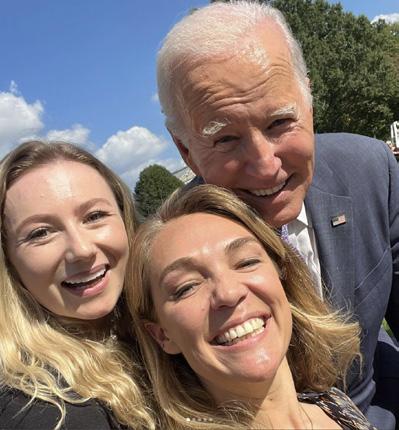
Credit: instagram@sophlmorg
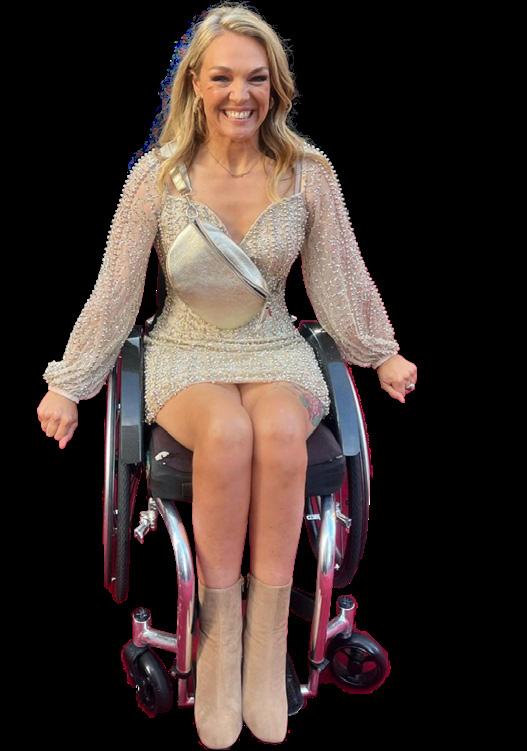
I think disabled people are determined not to give up. And I think with enough of us making enough noise, we will make change.
in employment. However, some of the loopholes it poses have been criticised in the years since.
If the law does a disservice to some, even if through incidental flaws, then it’s time to change. Morgan explained the next step: “What we’ve done is, we created in collaboration a new [piece of] legislation that could look to improve the current legislation. If not, just rewrite it, just then improve
“It’s called the Assisted Air Travel Act. And we launched it at the House of Commons, at a gathering of advocates in industry on in summer last year, with the intention that [the] government, [or] whoever comes in, can use it as a template, as a standard, as a guide on how how to improve things, which was really exciting.”
With a general election incoming at the time of this interview taking place, she hopes that this will not get kicked into the long grass - but remains optimistic for the future. Morgan takes inspiration from campaigners her came before her - referencing people such as Barbara Lipsicki and Judy Heumann. In due course, Rights On Flights also expanded across the pond.
Morgan notes the difference
on progress: “I was also campaigning over in the US, I was invited to the US. And what’s happening in the US is leagues ahead of what’s happening in the UK in terms of change. So I’ve become very close to the Biden-Harris administration and have been kind of working over here, I’m in the US now, working over here with organisations to see how we can, A, collaborate, but B, learn from what’s happening here.” 2024 is set to be a crucial election year across the globe, of course, including a likely rematch of incumbent President Biden and Donald Trump in November’s US election. So far, it seems to Morgan that the US is far more receptive to the idea of progress. She concedes thoughtfully that this is a “fragile” moment in time, “But at


the same time, I think disabled people are determined not to give up. And I think with enough of us making enough noise, we will make change. Change is coming. It’s just a matter of whether or not the airlines need to be forced to adopt it, or whether they will just do it because it’s the right thing to do.”
To find out more and follow sophie, visit: sophiemorgan.com
INSTAGRAM: @sophlmorg
TWITTER: @sophmorgTV
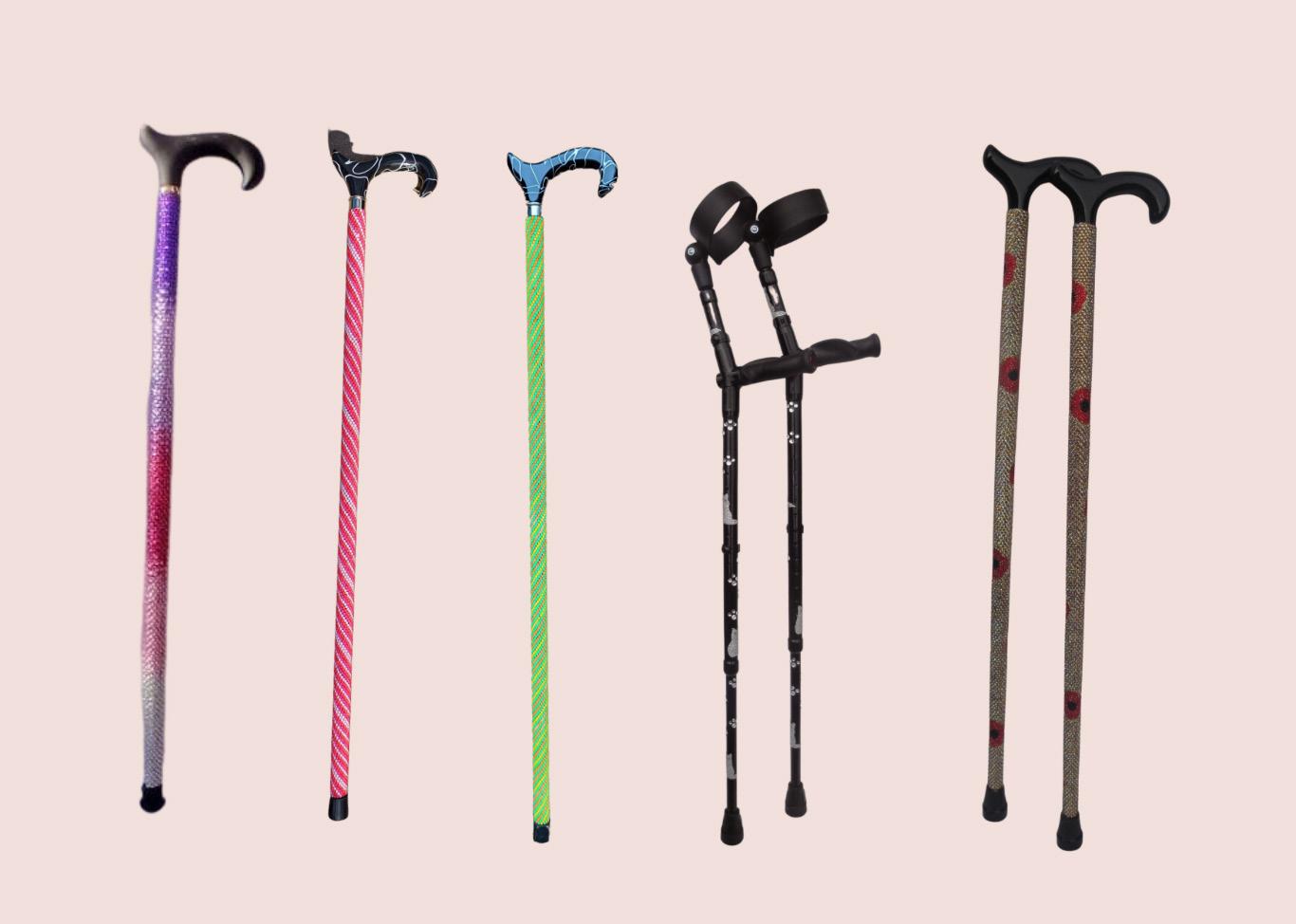
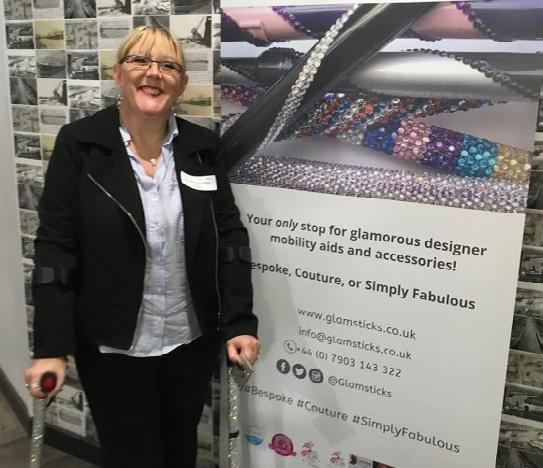
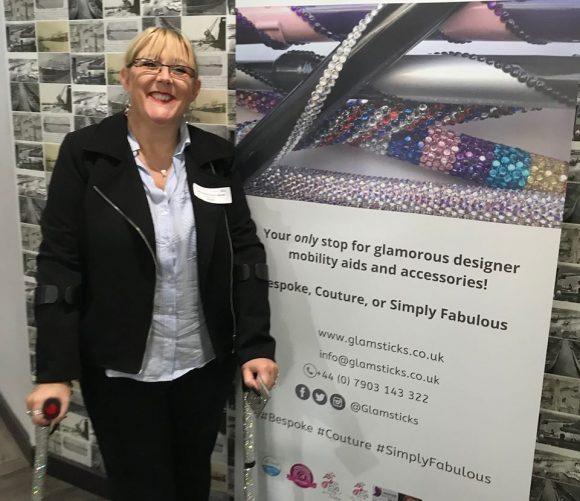



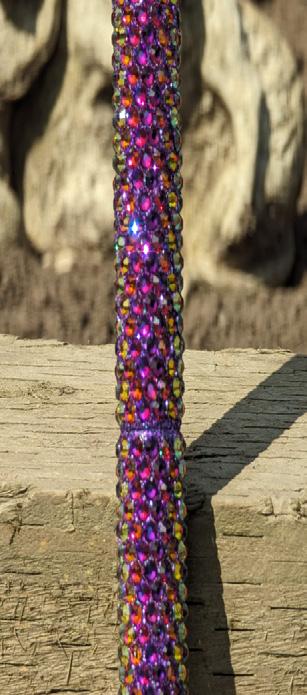
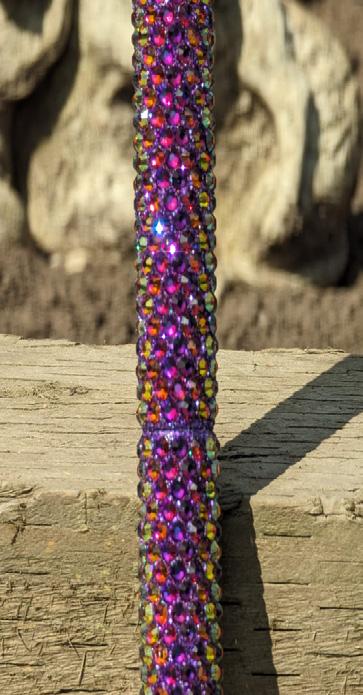


Our editor visited Amsterdam recently - and was not impressed with the access barriers to her travelling. Here Lydia Wilkins weighs in with her advice.
Like a lot of people, sometimes I just need to escape. And sometimes, it needs to be further afield than the immediacy of what’s outside my front door. The Netherlands has been a place of kinship for as long as I remember; it still feels like home, and it still feels new and exciting, as if visiting for the first time.
I also struggle to travel, thanks to the way my Neurodivergent brain decides to operate. I am 25 now, and recently found out it’s more than likely I am Dyspraxic - which had been hidden from me for most of my life, I have also been diagnosed as Autistic for almost a decade. With this comes issues around navigating and spacial awareness; unless the exact same route is walked, I’ll be lost in seconds. Even if it is somewhere I have been a hundred times before, this still happens; my
phone and charger are always to hand, as well as a map of some sort if outside the UK. What happens if the electronics die? And now my anxiety starts to kick in at the very thought of such a catastrophic scenario.
Disability is multi-faceted, but you would not think that when trying to navigate around.
De Tulperij flower experience is something I’d been dreaming about for a long time. Nature is *the* environment I am least anxious; as an Autistic person, this needs to be taken into consideration as it can have a knock on impact. I also use a cane to walk, owing to Long Covid related conditions; by the time this goes to print, there will be 8 separate conditions to officially contend with. Flowers are gorgeous, the upkeep and care integral - and not just for Instagram photos. (That is not me.)
From 8:30am - 6:00pm I got to explore
this interest. Having everything planned and timetabled out visually is a *must*.
My capacity is my own, it is not impeded; I have the right to decisions over my own body and care. You wouldn’t think this when crossing the border; I was searched, and not communicated with once. My relative was my ‘mouth’ - I was spoken over and through via them, in a beyond patronising manner. There is an assumption to infantilise far too often when coming into contact with disability; we unfortunately have to know our rights, in order to assert them. There are resources where you can check out the accessibility of venues, too.
The older I get, the more I have started to advocate for myself and to use aids to assist myself. I want the right of independence on my own terms - which everyone should be granted as a basic standard. Ear plugs are a must, a radar key an absolute essential, a colourful cane even better to prevent falls!
Travel should be open to everyone - and we can’t afford barriers to this experience any more.

“HOW
Historians typically make the point that history informs the present; we can take that approach when it comes to disability & travel. Disability Review Magazine talks William Kuhn about his new biography of Lord Byron.’

1Talk to me about your latest book; what is it about, and what was the inspiration behind it?
It’s a biography called Swimming With Lord Byron. He was a Romantic poet who died 200 years ago this month. [Editor note: this interview was conducted in early April of 2024.] Most people have heard of Byron but few have read him. That included me up until a few years ago. My father was an English professor. I paid no attention to Byron when I was a kid, but when my father died, I picked up a Byron book off [of] my father’s shelves. Call it a late-in-life adolescent rebellion.
his doctors see it when he was on his deathbed. Consciousness of his deformity helped make Byron a poet. He achieved unparalleled descriptions of his sense of alienation from others. He made his feelings universal, something that everyone feels.
The only place Byron felt physically perfect was in the water. He was an excellent swimmer. He completed several marathon swims, including one across the strait that leads from the Aegean Sea toward modern Istanbul. Even today swimmers find it difficult to repeat what Byron did.
2You’ve written somewhat extensively about historical events, such as with your biography of Jacqueline Kennedy Onassis which details her life as a book editor after both of her husbands died.
Most people have heard of Byron but few have read him. That included me up until a few years ago.
In respect of travel and access issues, do you think that the past can inform the present? If so, how?
Descriptions of the pain Byron experienced, both in body and mind, helped me understand how disabled people in the present might also experience their lives. Byron hated his foot, but he also developed ways to cope.
Descriptions of the pain Byron experienced, both in body and mind, helped
me understand how disabled people in the present might also
experience their lives.
I knew Byron was born with a clubfoot. But I didn’t know he was tortured as a boy with attempts to straighten it out. He walked with a limp. He was self-conscious about people staring at him. Byron wouldn’t let his wife see his foot on their wedding night. He wouldn’t let
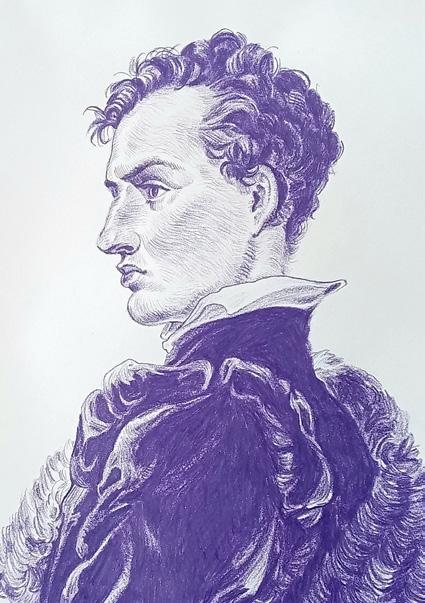
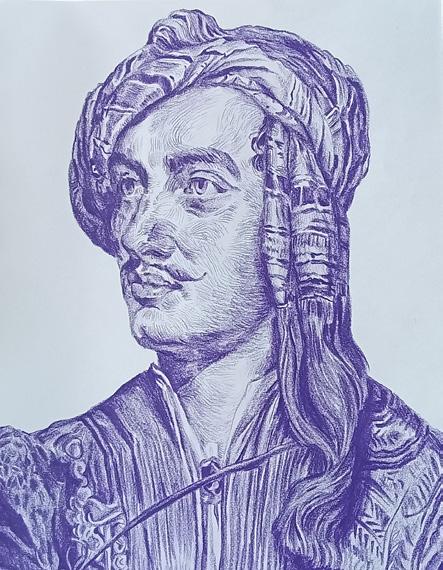
One [way] was to talk about his foot explicitly, even to joke about it. Byron asked a clergyman who was trying to persuade him that our earthly bodies will ascend to heaven after death, “And our carcasses, which are to rise again, are they worth raising? I hope if mine is, I shall have a better pair of legs to move on than I have these two and twenty years, or I shall be sadly behind in the squeeze into paradise.” This makes me want to embrace and speak of the things that make me feel self-conscious.
autobiographical passages in his own work. I selfpublished it, and have been getting some surprising early publicity, including from BBC Radio 3 and Attitude magazine in the UK. From beginning to end it took about 12 years.
4
Can history inform the present? What was the one thing you learned while writing that surprised you?
His clubfoot was in many ways the least of Byron’s disabilities. He also had an enduring psychological disability from having survived childhood sexual abuse. He had the ‘cultural challenge’ of being queer, too. You could be hanged for homosexuality in his era. His courage is one of the reasons that Byron is great. He openly discussed all three concepts in his writing.
I’m hoping to learn something from those two about how to age disgracefully myself.
His history helps me in the present because he dares me to be more open about my own secret sources of shame.
3
How did you find the process of writing in comparison to your last novel?
It was a longer process than with some of my previous books. I started working on Byron in 2012. I wrote two different historical fictions about Byron. Neither of those manuscripts found favour with agents or editors. So I decided to write an accurate nonfiction account of Byron’s life based on the
His history helps me in the present because he dares me to be more open about my own secret sources of shame. Byron surprised me by making me see that what ashamed him was also the source of his power as a writer and as a lover.
5
And what’s next for your work? What are you working on next?
I’m interested in two writers who accomplished what most writers never do: they both became rich from their writing. The American playwrights Lillian Hellman and Tennessee Williams both had critical and commercial successes on stage from the 1940s through the 1960s. They had a muted rivalry with one another and became increasingly outlandish both in their suspicions of one another, and in the memoirs they wrote as they grew older.
I’m thinking of writing a biography called Aging Disgracefully. I’ll be 67 in May [2024] so I’m hoping to learn something from those two about how to age disgracefully myself.
William Kuhn is the author of the biography Swimming with Lord Byron, which is out now. His other books include Reading Jackie: Her Autobiography in Books and the novel Mrs Queen Takes the Train.







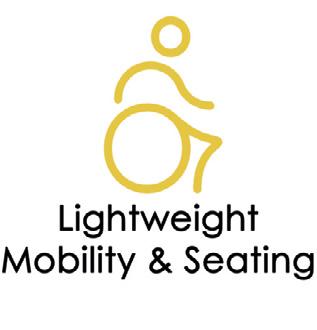
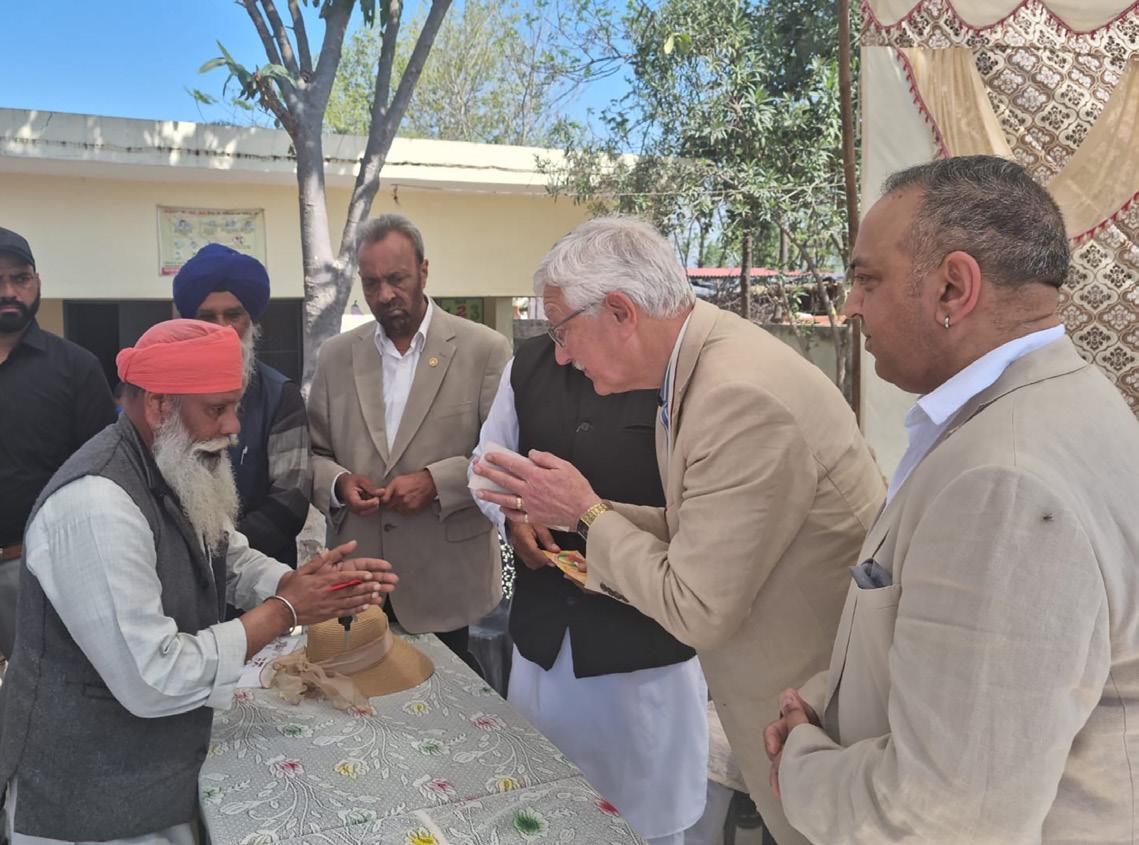
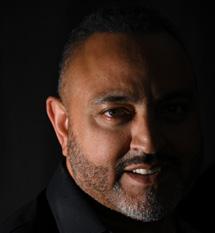
Dr Amo Raju OBE DL was the chief executive of Disability Direct; he recently stepped down after 3 decades of service. Here he takes us back to where his work in the disability space began.
Since 1998, I have made an annual visit to India, the birthplace of my parents who arrived in the UK in the 1960s. As the first child born to the Raju family in the UK I have kept the connection with my heritage and despite the Punjab being one of the most inaccessible places I’ve visited, I repeat the journey each year for a number of reasons.
With only a few pennies to his name, in 1963 my grandfather made that all important, life-changing trip from India to the UK at the request of the Ministry of Employment; my father followed a year later. Both have left this world for the next and thus I begin to reflect on perhaps how my life as a disabled person may have been if Mr Raju Senior had decided to stay put
When we travel abroad there is a noticeable difference in not only physical access to transport, buildings and services, but in attitude towards disabled people. India is a fantastic country with progressive ideas; however, once you leave the airports which I must admit, comply very well with support to disabled people, you are then at the mercy of private and public transport providers. They have no interest in a safe and equitable service to anyone not able
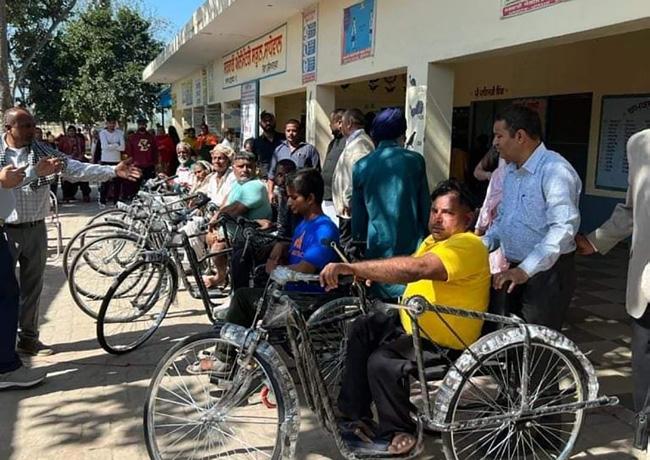
In the UK, theoretically, we have access to wheelchairs and other modes of assistive transport through the NHS. In India, you either buy it yourself or go without.
and physical fit enough to go twelve rounds with Tyson Fury!
When I first went to India, my immediate observation was that most of the population live in rural communities where there is little to no sight of disabled people. Each year, on each visit, something would trouble me. Where are they? Why am I not seeing disabled people who share my frustrations about the inaccessible environment in villages? A couple of years ago I shamefully learned that the greatest challenge to my peers in the Punjab was the affordability of equipment.
In the UK, theoretically, we have access to wheelchairs and other modes of assistive transport through the NHS. In India, you either buy it yourself or go without. The highest level of impairment is within communities facing extreme poverty; the most basic wheelchair starts at £60 and a hand-bicycle from £120.
Many of these households have a monthly income of no more than £50. Added to the cultural awkwardness towards disability, providing a solution to improving their independence is not really a priority.
In March 2023 I took a small delegation of friends and work colleagues to India.
The elected leaders of the villages surrounding ‘Sadhowal’, near the city of Garshanker, Punjab identified families where disability and poverty were prevalent. Over a period of a few hours, we donated twelve hand-bikes and wheelchairs as well as small cash gifts for urgent medical expenses.
These donations were lifechanging; many recipients had not left their house for over a year due to their circumstances. A simple appeal online can make a tremendous difference to people who live in a country where such pieces of equipment are not easily available. A few months later, I received photographs and video
reels of the beneficiaries ‘out and about’ independently, and it brought me back to my original question. Had my family not moved to UK, who knows what my life as a disabled person would have been like? I am from humble beginnings and poverty was a strong factor in our household.
I have since raised funds for a further twenty items and in September this year, will be making the journey of inequality to provide equality to people who I do not and most probably will never know. I want to ensure they are able to go to school, college, shopping, cinema or wherever they desire. If you are able to do so, find a way to support people far away from your existing circles and with only a few pounds, you can literally help disabled people get out and live.

was the chief executive and founder of Disability Direct; he was recently recognised for thirty years of services at the organisation. He is also the author of Walk Like A Man, and can be often seen around the country working as a speaker.
AUTHOR: Dr. Amo Raju
TWITTER: @AmoSinghRaju
INSTAGRAM: @amorajuofficial
TIKTOK: @amorajuofficial
When we travel abroad there is a noticeable difference in not only physical access to transport, buildings and services, but in attitude towards disabled people.
“WE
Gemma Stevenson is a whirlwind who holds a range of titles - an ICU World Champion, athlete, tennis coach, and a freelance writer and broadcaster. In this interview, she tells us how she does it!
QAs an opening question, how did you get into sports journalism?
ASo I was a sports teacher in my [earlier] life. I chose to go along the drama, musical theatre kind of side of things because as a child, I was earning money. So it was kind of like, well, I’ll carry along down that route because I’ve already got jobs out of that. Whereas there would have been no kind of pathway that I could see. And I thought, well, why would I leave this if I’m making money?
The West End wasn’t made for wheelchair users, you know, I could have carried on in the industry.
So I went and ended up going to drama school, carried on playing sport. I was always into journalism.
But in fact, when I went to uni, it was a toss up between going and doing all out musical theatre, which I did, or going and doing something like English and creative writing. So, and then I had my accident and that ended up being a real change. The West End wasn’t made for wheelchair
users, you know, I could have carried on in the industry, but the level I was performing at I would have been able to achieve because, because there just wasn’t access. Like we talk about access front of house, but there’s there wasn’t access backstage [for] wheelchair users. I think the West End and kind of professional theatre still have a lot to do when they think about access backstage. And so I kind of had a brief word with myself. So talking to people wasn’t a problem.
I’ve always loved the West End. I’ve always been a big Newcastle United fan. Like, I have seen them from the good times in the late 90s. I was a big tennis fan. I played tennis when I was young.

And so I thought, well, I don’t know, I [will] go and write about a sport and learn how to present about sport and stuff like that. And so that’s kind of what led me to it.
Because I felt that there was more opportunities, more access for me to access that kind of, access that kind of side of the career. Because I still look at, you know, I still technically when I’m on radio, I’m still talking and performing for an audience, although I’m giving factual information and I’m playing myself rather than a character.
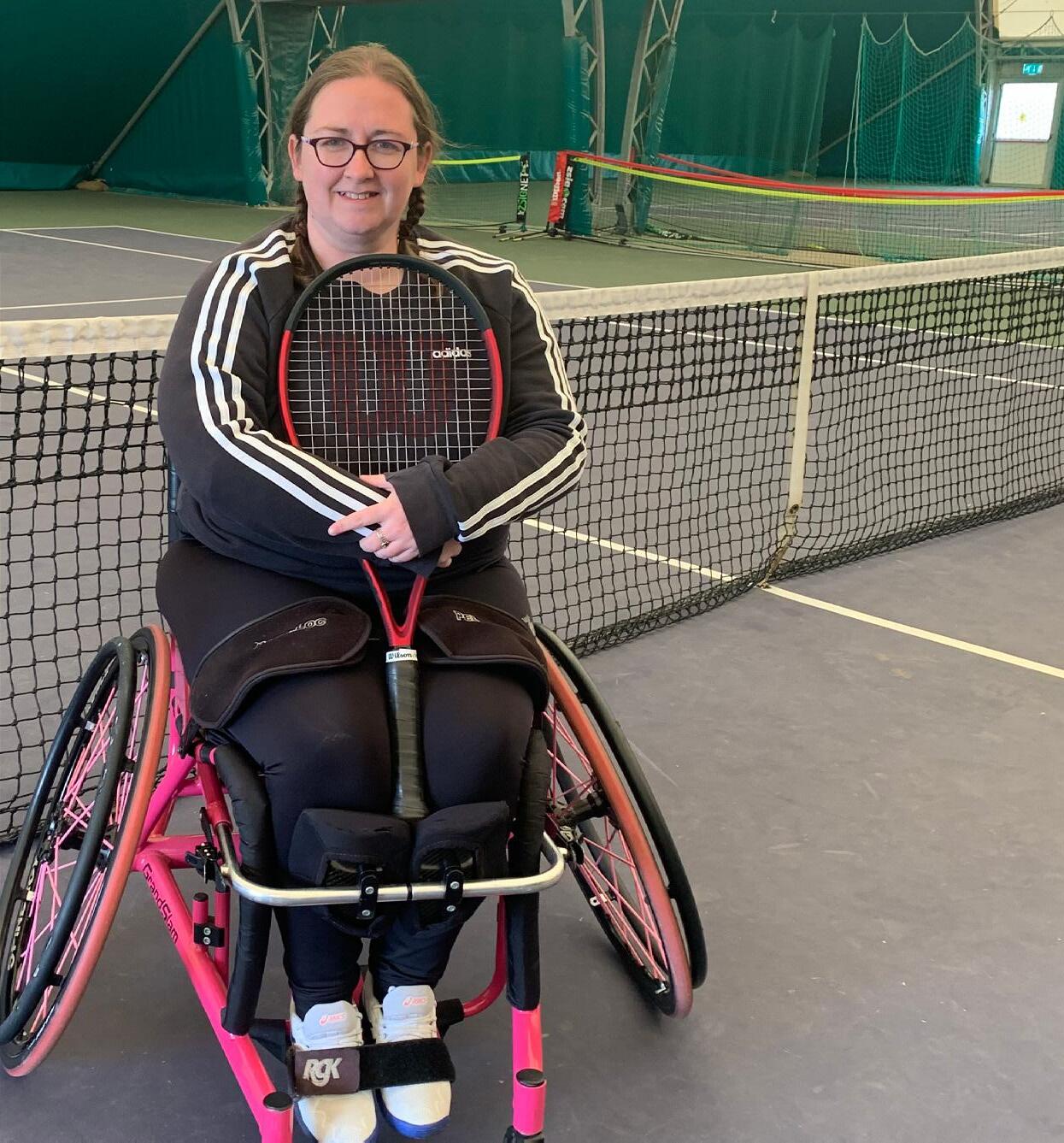
When I went to uni, it was a toss up between going and doing all out musical theatre, which I did, or going and doing something like English and creative writing.
Q You very briefly mentioned your accident, which I’m not going to ask about. In that sense, how do you - because you work as a disabled journalist, but you also work in the kind of sports space - how do you manage your access needs and such as when it comes to travel?
AYeah, I mean, I claim PIP [Personal Independence Payment] and I do get the higher mobility. So I have my own adapted car. I just have to drive to a lot of places. So it costs a lot in petrol at the minute. Because I need to take a car with me. So very rarely [I] will [take] public transport to a job. It’s only if I know I don’t need a lot of equipment. Or if it’s in the heart of London, it’s going to be a pain to get far. So generally, somebody comes with me. It’s generally my mum or my boyfriend. So when the mum comes with me aboard, it’s kind of like a girls’ work trip. Like, I think everybody knows my mum as much as they know me now! So she’s a little character in the press rooms. So she’s
an absolute like, I can’t imagine not doing what I do without my mum, because she knows all the athletes and she knows exactly how to behave and stuff like that.
So I’ve had to have a big fight to say because the thing is, with my job. If I go to Access To Work and ask for a PA support, they assume it’s same as any other job. So they assume it’s I could just pick up a PA the week beforehand and then they can just go and it’s not like that. Like, if you think of the kind of events I’m going to, the grandstands, the Paralympics later this year, they are very high profile sports events and they have security and they need to make sure that the people that they’re accrediting are the right kind. So if you look at the Paralympics, I had to know two years in advance who was going with me and how many people were going with me.
Well, that doesn’t suit the current Access To Work system because they’d be like, here’s a carer a week before that. So I have to have a lot of, well, debates, I say debates with them about why I have to have somebody I know there. So as well as my physical disability, I have had an
I’ve had to have a big fight to say because the thing is, with my job. If I go to Access To Work and ask for a PA support, they assume it’s same as any other job.
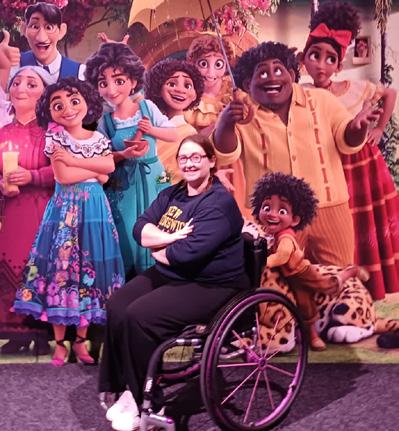

eating disorder. And when I’m there and at work because of the level of my disability, there’s not personal care there as well. So I have to feel comfortable with the person.
So it is a bit of a fight and it continues to be a fight because they’re like, we’re not just here to pay for you and your mum to have a holiday. And I’m not having a holiday! I’m going aboard. I’m seeing a tennis court and a hotel room most days because you get there at nine a.m. to prep. I mean, if you take Australia, I arrive each day about 10 a.m. in the morning and I’m lucky if I leave before midnight, because even though the wheelchair matches finished slightly earlier I’m a firm believer of doing work there. Don’t go back to the hotel because I know what my condition is like in the fatigue - so, if I went back to the hotel and said I’d work back at the hotel, I’d fall asleep. I’m a firm believer to do the work there.
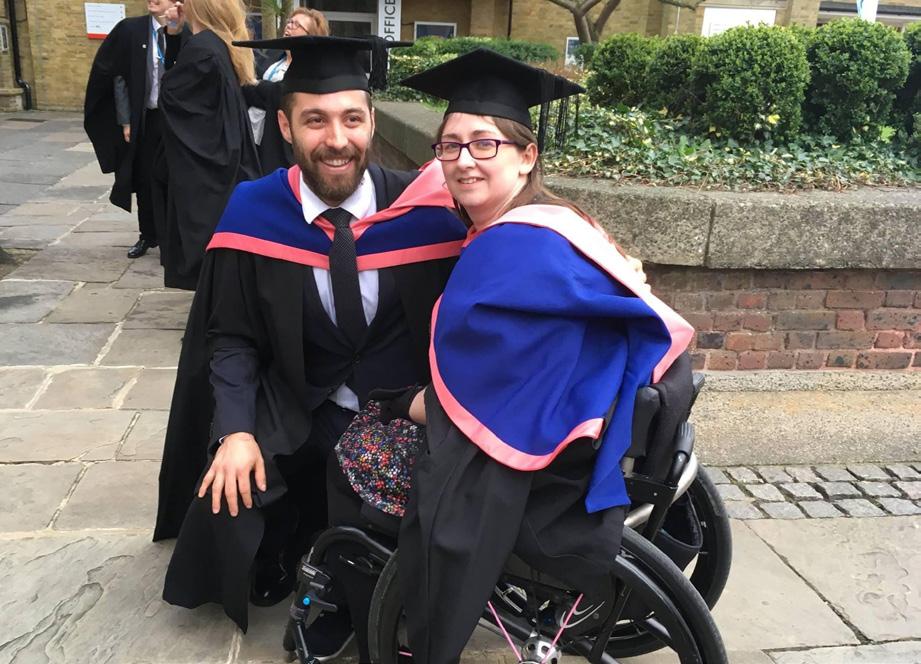
Q Can you explain very briefly the concept of Ableism, what it is and why we need to be resilient and to keep an eye out for it?
A
So you know, so yeah, so for me, Ableism is like - what was it? My boyfriend says, he says it.. Ableism brings out my inner Stitch. So he calls me [that] when I get really sarcastic and sassy. He tells me to calm down, Stitch, you know, like the Disney character Stitch because I get a bit sarcastic.
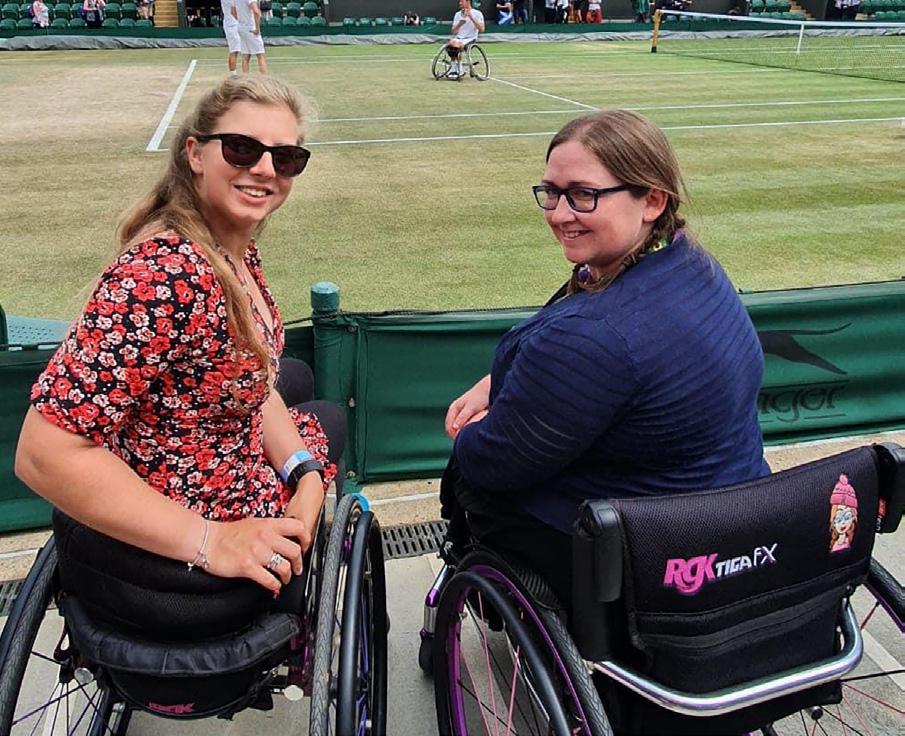
My boyfriend says, he says it.. Ableism brings out my inner Stitch. So he calls me [that] when I get really sarcastic and sassy.
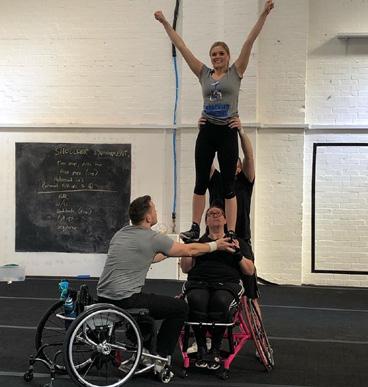
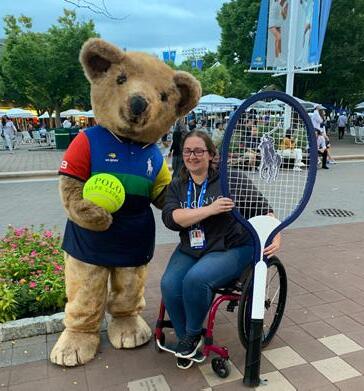
But I think, I think people sometimes don’t know what it is. And they sometimes don’t know that they’re doing it. Actually, even disabled people don’t know they’re doing it sometimes. For me, it’s kind of *that* person when you walk into an appointment, which I had the other day, I was going to the hospital. And I was just rolling along the path and I wheeled past him. And he went: “Whoa, whoa, whoa, whoa, whoa, whoa, there’s a speed limit on this path.”
It’s things like that. It’s comments like that. We don’t always assume non disabled people are Olympians. We understand that Olympians are this… unique freedom of human who push themselves so hard to achieve what the upper limits of what their bodies can achieve. And they achieve great things. So why, because I’m in a wheelchair, does somebody assume I’m naturally a Paralympian? I compete to a high level. I competed for the country and [in] cheerleading. I have my full time job and I play and compete because I [have] still got this competitive spirit in me after giving up cheerleading. I’m not at tournaments every week. I’m not watching what I’m eating dramatically. And it’s just this automatic assumption.
QBefore this interview started, you briefly alluded to [the fact] that you had some news to share. The floor is yours.
AOK, so, yeah, so BBC have given me my own radio show over the summer. So about four weeks ago, I got a call from the editor of BBC Radio, Cambridge, Suffolk and Norfolk. And I go down regularly [to talk] on [the] Cambridge [station], and I’m on the news channel.
Then I had this phone call. I came out of the gym. There was
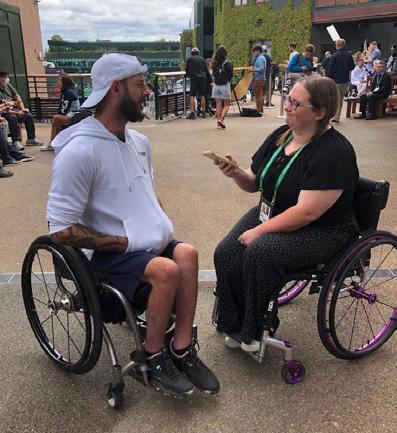
this missed call and it [had] left [a] message on [my phone]. So I’m not expecting a call from anybody. So you’ve got to imagine me in my car, having just done like an hour long session of kettle bells, feeling like I just needed a coffee.
So I picked the phone up and [the] answer phone [says], hello, this is such and such, the editor of BBC Cambridge and Norfolk and Suffolk. I just heard you on the show and I’d really like to have a chat to you about presenting work. So I’m sat there, a sweaty mess in my car and I ring him back and he comes to me and he talks to me and he tells me about what he wants!
DIFFICULTY RATING: 3/5
Ian Taverner, also known as Mr Cookfulness, is a food writer and author. Known for his Cookfulness revolution, he is a man on a mission to make the kitchen a truly accessible space for everyone.
Before becoming a food writer, Ian had a two decade career in financial services; this ended due to declining health. Following a 4 week residential programme at Bath National Centre for Pain Services, Ian began to understand what was happening - and although life was going to be very different, a pathway to a happier life was born. His debut book came as a necessity, owing to being unable to cook or approach the kitchen, due to the multiple barriers to his access.
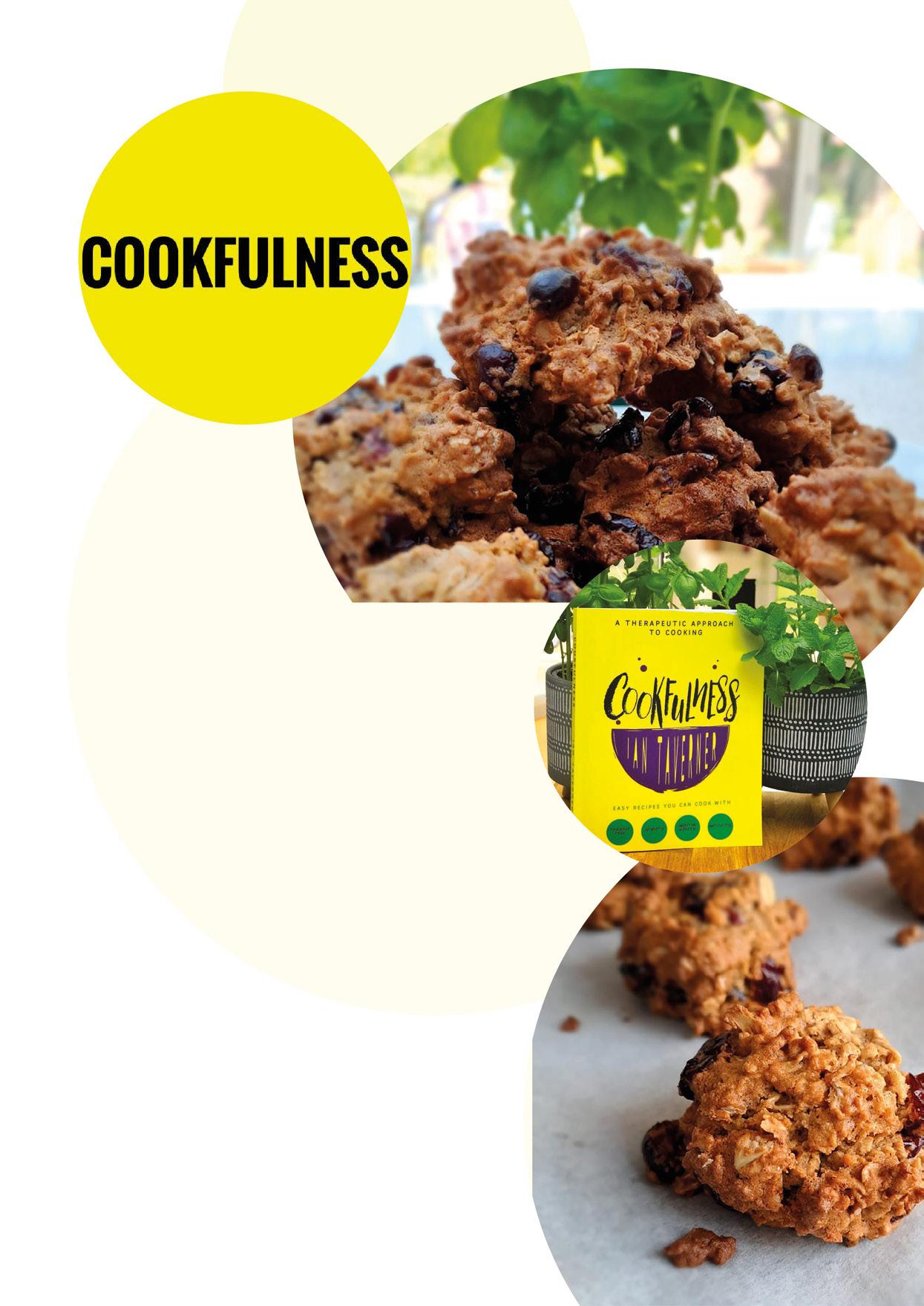
Makes: 16 cookies | Cook Time: 15 minutes | Preparation time: 45 minutes for the entirety of this recipe.
That You Will Need:
2 x rectangular baking trays | 1 roll of greaseproof/Baking Paper
1 pair of scissors | 1 medium mixing bowl | 1 whisk (An electric whisk will be very helpful with this recipe)
1 large metal spoon | 1 set of weighing scales | 1 teaspoon | 1 tablespoon (to be used for shaping if needed)
(Everything that is marked with a * can be swapped for gluten free or vegan alternatives, all of which can be found in a local supermarket)
75g butter (make sure this is at room temperature)*
45g light brown sugar
25g coconut sugar or white sugar
1 teaspoon vanilla extract
1 egg (for vegan option increase butter / vegan spread by 30g)
½ teaspoon bicarbonate of soda
1 teaspoon cinnamon
A pinch of salt
75g dried cranberries
40g desiccated coconut
145g plain flour*
80g porridge oats*
110g butter (at room temperature)*
300g icing sugar
1 teaspoon vanilla extract
1 tablespoon milk*
1 Set your oven to 175C* and wait for it to heat up.
2 Line the 2 baking trays with baking paper so the bottom of each is covered with a protective layer.
3 Having measured out all of the ingredients, add the butter and both sugars to your mixing bowl and whisk until creamy in texture. Then, add the vanilla and egg and whisk to combine well into one mix.
4 Add the flour, bicarbonate of soda, cinnamon and salt, then stir well while using the metal spoon to ensure all ingredients are combined into a paste like consistency with no visible flour.
5 Next, add the oats, cranberries and coconut and mix to ensure all are well combined.
6 Using your hands or a tablespoon, pick up a rough Squash ball sized amount of the mix (a heaped tablespoon) and place onto one of the trays. Repeat this step so that there are eight on each tray, ensuring there is a good gap between them on the trays to expand.
7 Once you have placed them into the oven, set your timer for thirteen minutes. Each of the
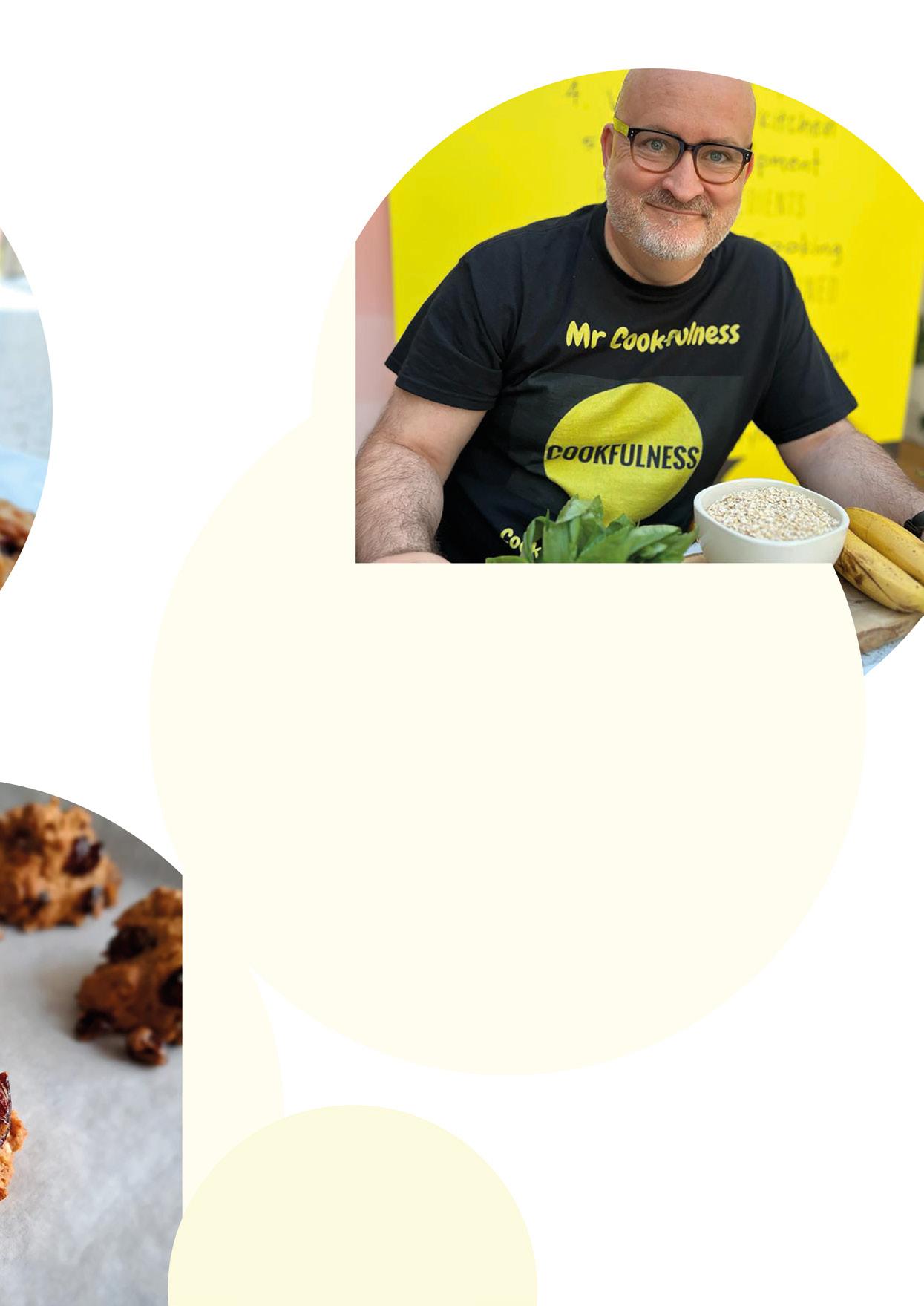
cookies should have a nice light brown crust, as well as being slightly soft in their middle. Remove them from the oven, allow them to cool, and eat. Congratulate yourself and be proud, you made it!
Add white chocolate* chips and reduce the coconut by the same amount for a lovely sweet influence in all of the cookies you make. Instead, you can also add a teaspoon of chopped crystallised ginger for a surprise kick of heat. For a different filling, replace the butter cream with your favourite hazelnut spread or peanut butter.
Always use butter at room temperature for this recipe; get it out of the fridge, weigh it and set aside for 15-20 minutes before you start. If you are struggling to shape and drop the cookie mix onto the trays, wet your hands a bit each time, but don’t worry, any shape will do! Once removed from the oven the cookies will continue to firm up as they cool. Icing sugar goes everywhere, so take your time when making the butter cream. The cookies will keep in an airtight container for a few days - but you can also freeze them if you are looking for a long term storage solution.
iIan Taverner, also known as Mr Cookfulness, is available for bespoke cooking shows, workshops, talk & programmes. The Cookfulness Cookbook is available in hard copy & e-book on Amazon, BookshopUK, Waterstones To enquire:
WEB: cookfulness.co.uk
EMAIL: cookfulness@gmail.com
INSTAGRAM: @cookfulness
TWITTER: @cookfulness
FABEBOOK: @cookfulness
YOUTUBE: @cookfulness

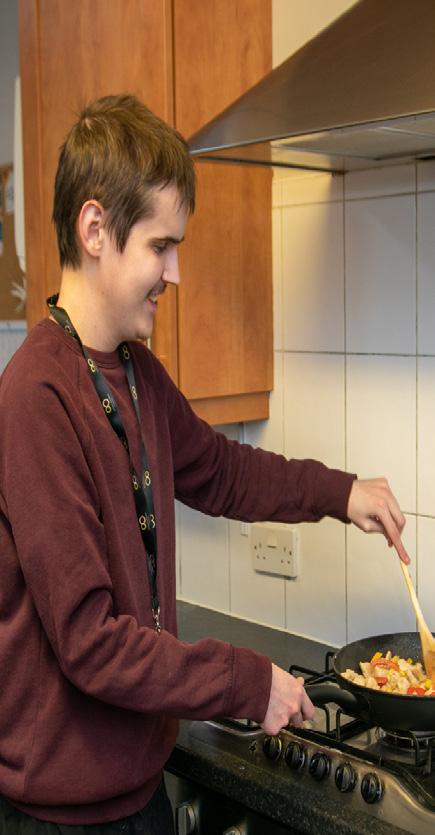
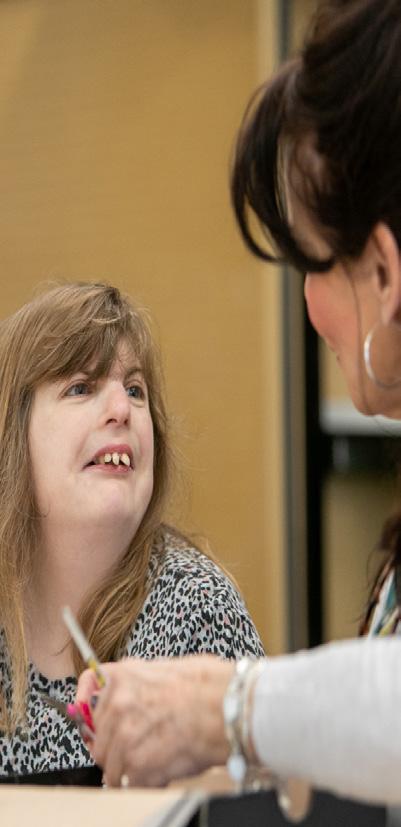
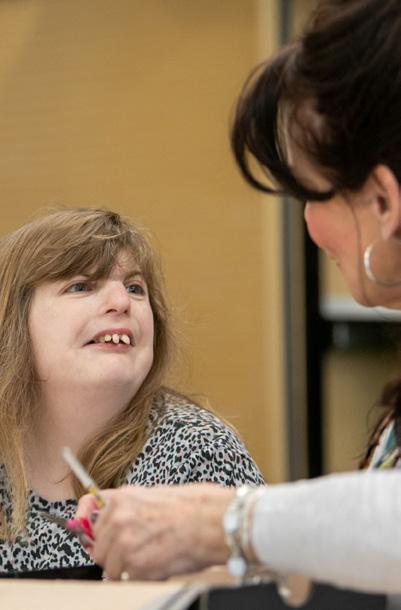
At Autism Unlimited one of our key aims is to increase awareness of autism and, with our programme of education, support and life skills training, create unlimited possibilities for those we support.
At Autism Unlimited one of our key aims is to increase awareness of autism and, with our programme of education, support and life skills training, create unlimited possibilities for those we support.
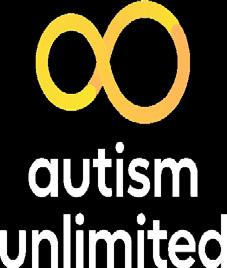
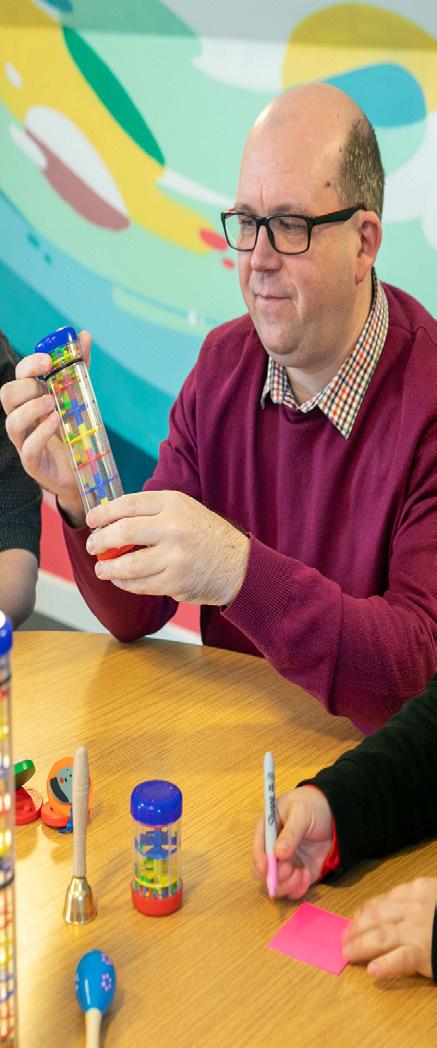
Through our development programmes and marketing campaigns we will generate greater awareness and understanding which will lead to true acceptance.
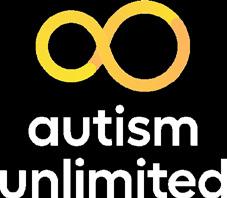
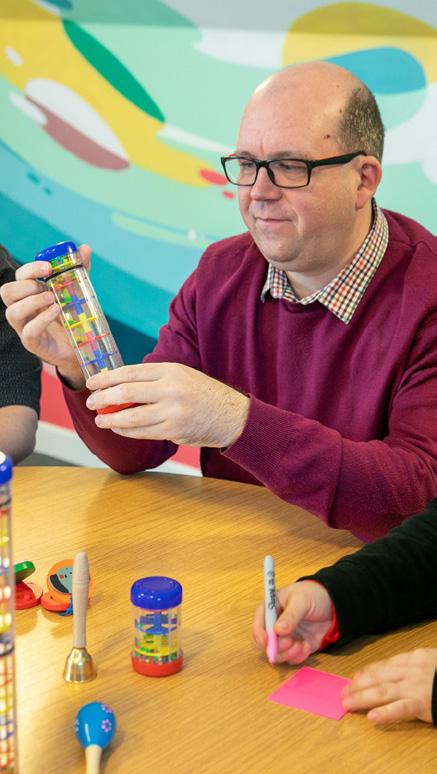
for children and young adults in our community and beyond
From early years to sixth form, we provide inspirational, personalised learning
Through our development programmes and marketing campaigns we will generate greater awareness and understanding which will lead to true acceptance.
in the workplace
for children and young adults in our community and beyond
From early years to sixth form, we provide inspirational, personalised learning
A workplace programme of training and advice that provides employers and employees with an understanding of neuro-diversity, the needs of neuro-diverse employees and outlines how simple adjustments to workplace environments will enable them to thrive.
Featuring stories from our community and the wider autism network that teach us about the characteristics and traits of autism and their life experiences. From the age of 19 – 25 we provide individual life skills training
A workplace programme of training and advice that provides employers and employees with an understanding of neuro-diversity, the needs of neuro-diverse employees and outlines how simple adjustments to workplace environments will enable them to thrive.
Featuring stories from our community and the wider autism network that teach us about the characteristics and traits of autism and their life experiences. From the age of 19 – 25 we provide individual life skills training Everything we do is with the sole aim of creating unlimited posssibilities and opportunities for autistic people www.autism-unlimited.org
If you would like to find out more about the work we are doing or get involved in any of our activities please contact us on 01202 483360 for more details.
If you would like to find out more about the work we are doing or get involved in any of our activities please contact us on 01202 483360 for more details.
If you had searched the internet for ‘All-Terrain Wheelchair’ back in May 2006 you wouldn’t have found very much at all. The same search a month later however, would have yielded a new name. Trekinetic.
Launched after 6 years of design and prototyping, the Trekinetic wheelchairs were made available for the first time in June 2006 and would later be described as “little short of revolutionary” by David Wilkins at the Independent.
forward 18 years and what’s changed?
The market for all-terrain wheelchairs has increased significantly with most users citing access to paths, trails and general outdoor activities as well as travelling, walking the dog and spending more time with family. Perhaps one of the most overlooked benefits of using an all-terrain wheelchair is the mental health element. Various research has shown that time spent outdoors can promote mental health, especially following the COVID-19 pandemic, and that spending time outside is linked to greater vitality and even improved structural plasticity in the brain.
96% of users said their Trekinetic GTE gave them more independence.
Whilst there are a growing range of all-terrain or off-road wheelchairs, the vast majority are incredibly heavy and typically can’t be used around town or indoors. Trekinetic wheelchairs on the other hand were designed from the ground up to be easily transportable, capable across multiple terrains and highly configurable for both children and adults. All Trekinetic wheelchairs have been fully crash-tested and the
powered GTE model, weighs in at just 34kg (including a Li-ion battery with an 18 mile range), over 100kg less than the next lightest crash tested, all-terrain wheelchair.
The powered GTE model has recently been updated for 2024, using the Mk3 moniker and includes a longer range battery, improvements to the connectors,
It is the best thing we have ever bought. Ever.
STEVEN, TREKINETIC CUSTOMER
footplate and tyres. They’ve also updated their patented tilt in space mechanism, allowing you to recline the seat by lifting the armrest. There’s even an umbrella option to keep you dry (or protected from the sun) whilst out and about.
“91% of GTE users scored the chair a 4 or 5 out of 5 for comfort”.
In addition to product updates, Trekinetic have been working hard with their growing dealer network to ensure they can provide a comprehensive solution for their customers. An interface plate for mounting Spex seating systems within their carbon fibre seat is one of the latest additions whilst a partnership with Consolor means Trekinetic customers can now select a bespoke moulded seat as well. Trekinetic expect to provide integration with additional 3rd party systems in the future and are actively working with various other organisations to ensure their customers have access to all the support they need in a changing world.

For more information about Trekinetic wheelchairs please visit trekinetic.com or search @trekinetic on social media or scan the QR code below.
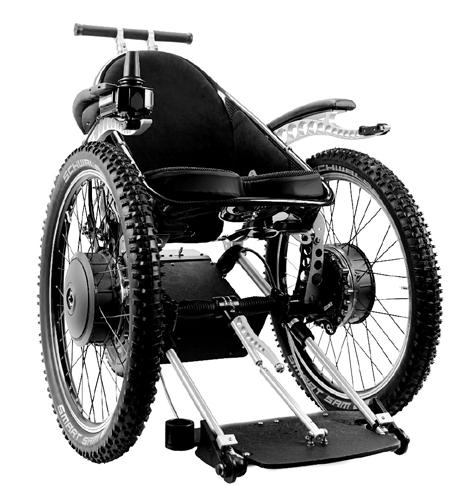

With guide prices starting from £250,000 One Goodmayes by Fairview New Homes is an exciting opportunity to purchase a home in the up-and-coming area of Goodmayes and Seven Kings. The development consists of a collection of modern studio, one- and two-bedroom apartments available, each with its own balcony or terrace
One One Goodmayes has been created with accessibility in mind, with a number of wheelchair accessible homes available for prospective buyers. The development is further provided with two elevators and 1,500mm space outside each home allowing for wheelchair access.
Inside, the homes are all fitted to a high specification, with integrated appliances, including quartz worktops, microwave, fridge/freezer as well as oven and dishwasher, with a freestanding washer/dryer in addition. The wheelchair accessible homes are created thoughtfully, with accessible entrance doors, level thresholds and a clear width of 850mm and full, 1,500mm diameter turning circles. The windows are designed with sill height below 800mm with handles in an accessible location to be opened and shut with ease. There is also integrated wheelchair charging space within the apartments, as well as bathrooms with level access showers and a 1,500 x 1,500mm clear maneuvering zone. The kitchens are also fully accessible to allow for maximum independence.
A number of apartments are also available to be adaptable, meaning they can easily be modified with minimal work to become a fully functioning, wheelchair accessible layout. Residents will further benefit from beautifully landscaped communal areas throughout the site.
The area of Goodmayes and Seven Kings offers residents a diverse range of amenities on their doorstep, including a variety of shops, supermarkets, cafes
and restaurants. For commuters or those who want to travel further afield, the development offers fantastic transport connections; with Seven Kings station and Goodmayes station just 0.3 miles
We’re confident One Goodmayes represents real value in comparison to many other areas of London.
in either direction, both benefitting from the newly launched Elizabeth Line offering seamless travel into central London and beyond.
For families with children, Goodmayes is well-known for its abundance of OfstedOutstanding schools, including Ark Isaac Newton Academy, Seven Kings School and Cleveland Road Primary School, all within walking distance of the development.
Sohail Saiyed, Sales Manager at One Goodmayes, says, “Situated at the heart of the Crossrail corridor, Goodmayes is a rapidly up-and-coming neighbourhood with buying prospects rivalling the likes of its neighbouring Stratford.
“We’re confident One Goodmayes represents real value in comparison to many other areas of London, without sacrificing on transport links or nearby amenities, making the development a great option for first-time buyers. We’ll be able to welcome our first residents at One Goodmayes as early as November 2024.”

The development, newly launched in June, is now available for viewings and anyone interested in purchasing a new home at the development should contact the sales team at One Goodmayes on either 020 3603 2533 or goodmayes.sales@fairview.co.uk. The marketing suite is also open daily from 10am-5pm for drop-ins.
For more information, visit: fairview.co.uk/developments/ one-goodmayes/


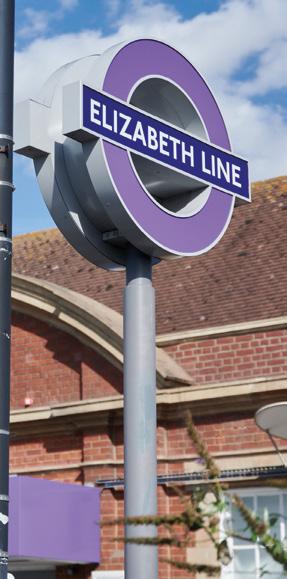
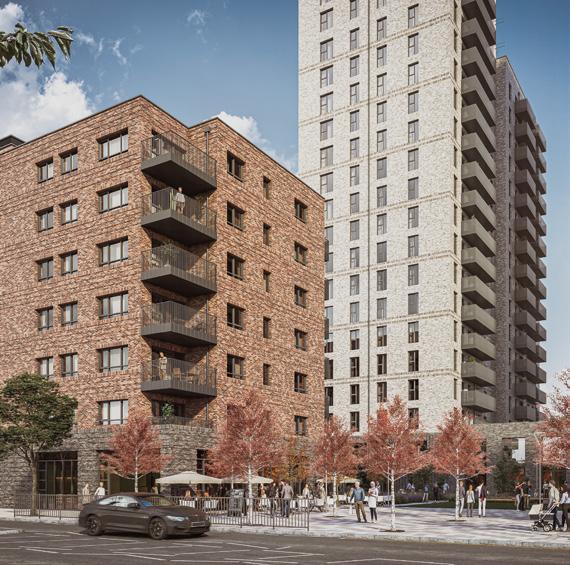
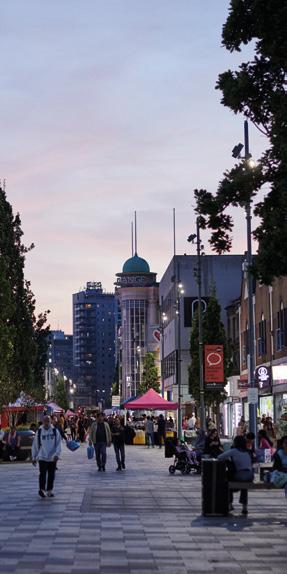
The Courts have been realising that sometimes a person would be better off not knowing how much compensation they have received.
Some people will be very sensible with the information and keep it private. Some people aren’t able to do that and can cause problems for themselves.
Sometimes the litigation Court will be so concerned about what would happen if the client knew the size of their award that they will make an Order as part of the claim that they shouldn’t be told.
The Court has decided that when assessing a person (P’s) capacity to make the decision about whether they should be told the amount of their award or not, the Court needed to look at:
1. The nature of the information in question,
2. The risk of obtaining it,
3. The risks of not obtaining it,
4. The benefits of obtaining it,
5. The benefits of not obtaining it.
The Court says that “when assessing P’s capacity to take the decision, their ability to recognise, retain and weigh the above questions and specifically to recognise, retain and weigh her own vulnerability and it’s potential consequences, will frame the scope of the decision. The Court also says that if the client is able to recognise these problems and vulnerabilities, retain the information and weigh it up then they are likely to have capacity to make this decision.
CK does not recognise her own vulnerability. She is sometimes careless about what she posts on social media about money and she lacks insight into the need to protect herself from financial abuse. She has though worked out for herself pretty accurately how much the damages are. The Court found that CK can’t make the decision for herself whether to know the amount
of her damages. The main reason for that is because she doesn’t recognise her own vulnerability. However, because she has already worked out what her damages probably are, the Court didn’t feel that knowing the precise amount would make her much more vulnerable.
The Court decided that she lacked capacity to make this decision and also should not be told of the amount of her award.
NJ on the other hand does not understand figures or the relative value of money and doesn’t recognise the full extent of her disability. She has actually said she doesn’t want her brother to find out about the value of the award but can’t express why when asked. She wants to have land to keep horses and space for her dogs and to have support and be settled. The Court felt that she was very vulnerable to exploitation and noted that her brother was described as being addicted to heroin. She doesn’t understand her own vulnerability but even if she was told the amount of the award, she wouldn’t understand the size and value of it. The Court decided that she lacked capacity to make this decision and also should not be told of the amount of her award.
Very helpfully for Deputies, the Court said that an application to Court to decide this issue was not necessary in every case. The Court said that sometimes the decision would “be clear, perhaps even just common sense”. In some cases though because the issue is difficult, an application will need to be made to the Court.
It is vital to remember that if P has the ability to make that decision then whether the Deputy thinks they should be told the size of the award or not, they can decide whether to know for themselves. The Deputy should check with them whether they want to know of course as some people will have weighed up their own vulnerability and decide they would rather not.

For more information visit Web: wrigleys.co.uk | Tel: 0114 267 5588




































































With purse strings tightening all around, those in need of care and support need to be ever more watchful to ensure they take full advantage of any potential entitlement to statutory funding or free support which flows from an assessment process carried out by the NHS or social services.













Wrigleys offers a highly specialised bespoke service for those facing the complexities of the health and social care system who are struggling to be heard. For those who are seeking or already in receipt of statutory support, we can help navigate the often-complex assessment and care planning process to secure financial support or get this re-instated if it has been reduced or cut back.


If you or a loved one feel that professionals are not listening and are looking for a professional who is on your side, please don’t hesitate to get in touch.















A growing consensus and body of research supports the effectiveness and importance of 24-hour postural management to enhance the well-being and quality of life of individuals with movement disorders, writes Marcin Paszenda, Clinical Assessor at Wheelfreedom.
-hour postural management is a comprehensive and holistic approach that focuses on assessing and improving body positions, over a full 24-hour period when lying, sitting and standing. It will often involve a team effort, to promote good posture - both night and day, enhance function, encourage participation and prevent issues related to movement conditions.
RESNA describes wheelchair users as “particularly at risk from whole body vibration”. From a biomechanics perspective, it is ideal for vibration to be redirected at the earliest stage, or as distally as possible.
Lack of adequate postural support can affect function of all the vital body systems and profoundly affect the quality of life. As a consequence individuals with poor postural support might be exposed to pain, discomfort, musculoskeletal disorders and other secondary complications.
by gravity’s continuous impact on the body. Combined with a personalised care plan assessing body symmetry, pain levels, sleep quality and utilising the appropriate equipment, like prescriptive wheelchairs and sleep systems, 24-hour postural management can maximise function and well being.
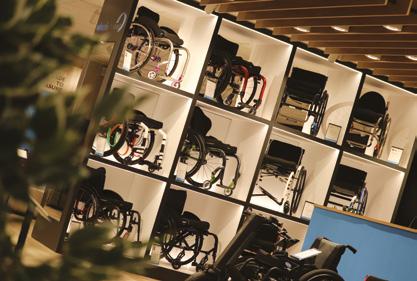
In the field of paediatrics recent research emphasises the importance of considering all relevant positions a child uses throughout the day to break the cycle of asymmetries and promote optimal positioning not only for physical health but also for social and communication opportunities. Implementing 24-hour postural management is crucial for improving quality of life by providing varied positions that manage symmetry, skill development and play.
Despite these challenges, 24-hour postural management is a powerful tool for clinicians and its benefits can clearly be seen in daily practice.
MARCIN PASZENDA
In some instances, advocates of 24-hour postural management encounter resistance due to a lack of awareness or even scepticism. At first sight a user might think a prescriptive wheelchair is the cause of postural problems or pain, however, a 24-hour postural management approach is likely to reveal contributing factors like standing or lying down when out of the wheelchair, throughout the 24-hour period.
Despite these challenges, 24-hour postural management is a powerful tool for clinicians and its benefits can clearly be seen in daily practice.
A well-designed 24-hour postural management program can help prevent long-term changes to body shape caused
There have been calls for a clear national policy and guidance relating to postural care and scope for development of dedicated posture management services. We would like to see these measures underpinned with specialist training and research to promote awareness of the important role clinicians can and do play in preventing postural deformities and other secondary complications and promote a more comprehensive approach to postural care.
For more information contact marcin.paszenda@wheelfreedom.com Web: wheelfreedom.com Tel: 0208 138 0665


Wheelfreedom are experts in prescriptive wheelchairs, specialist seating and 24-hour posture management.
Products and Solutions include:
Wheelchairs
Powerchairs
Paediatrics
Specialist seating
Power add-ons
24-hour Postural Management
One-to-one assessments are held at their industry leading showroom in London as well as in clients’ homes to provide tailored solutions. Services include pressure mapping, custom-made seating and special controls.
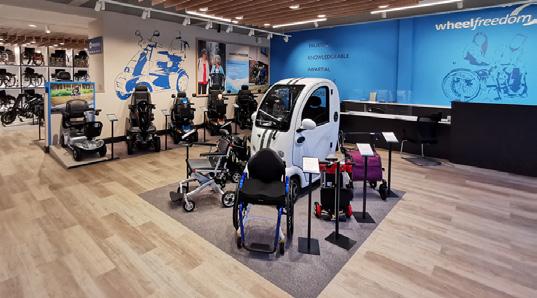
Wheelfreedom are CPD accredited to support health professionals and Occupational Therapists. Gain 3 CPD points as you learn about the latest innovations in mobility and seating at their London showroom.
Recent courses include:
Mastering Mobility: Special Controls for Power

Innovations in Wheeled Mobility
Posture and Clinical Seating Solutions
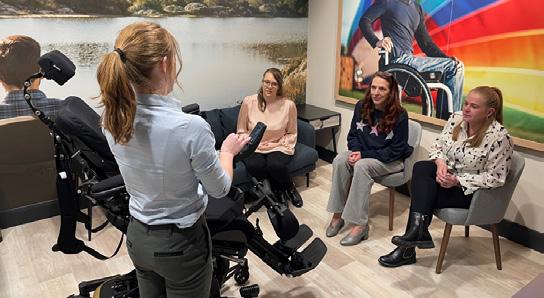

The Bluebell Railway are proud to announce the launch of the UK’s only wheelchair-accessible 1920s Pullman dining carriage. Don’t miss out on those special occasions anymore. In service now and bookable!
• Live steam trains up to 152 years old
• 4 Beautiful stations in various period decor
• SteamWorks! Interactive learning zone
• A full range of dining trains
• Licensed bar & restaurant ‘Bessemer Arms’
• Accessible Carriages (please check availability)
• Free parking on-site & mainline rail access
• Museum and shop with step-free access

